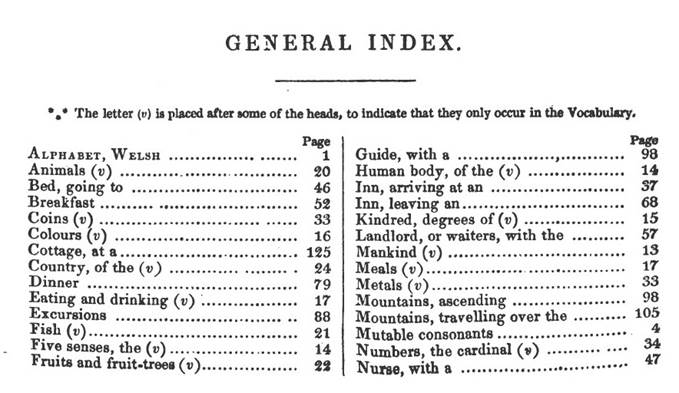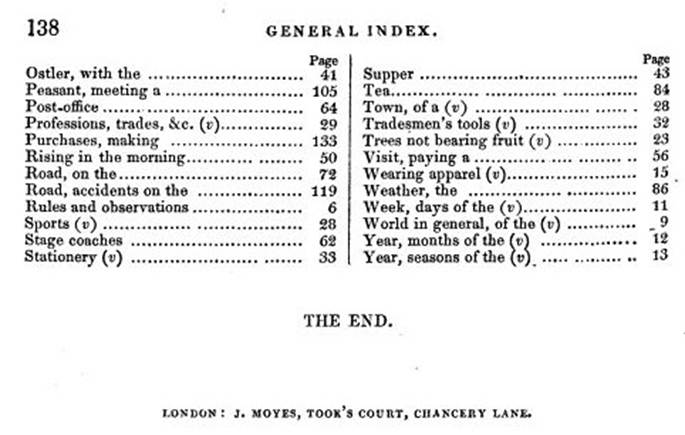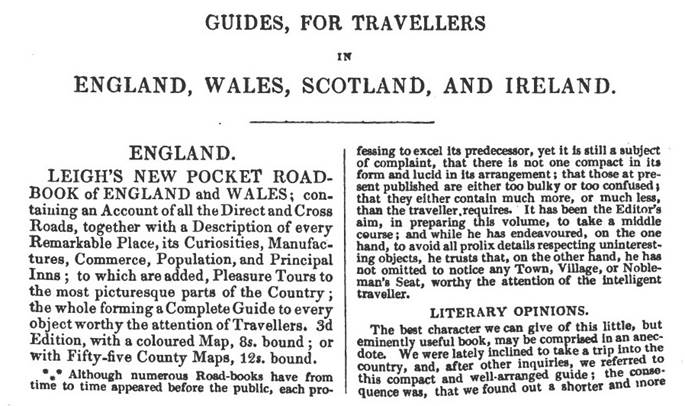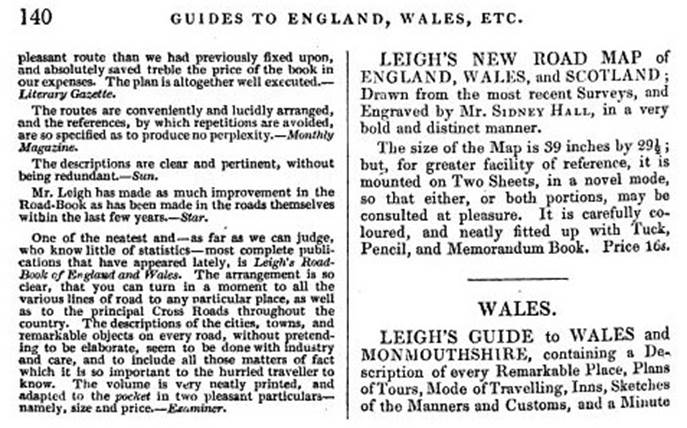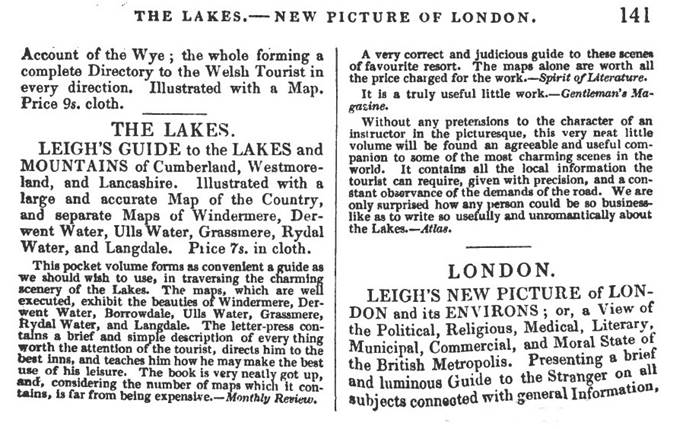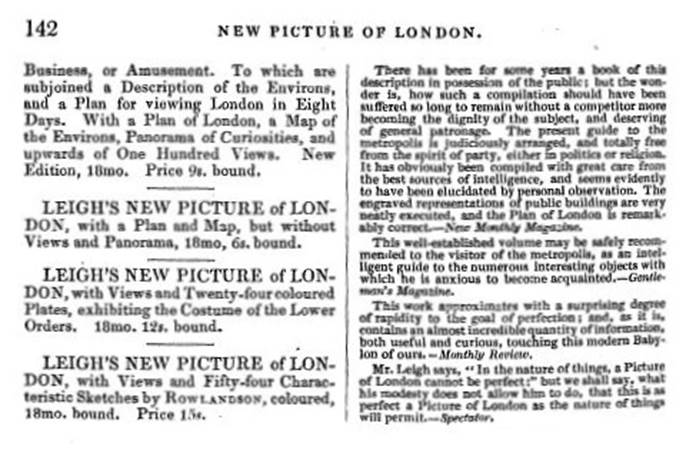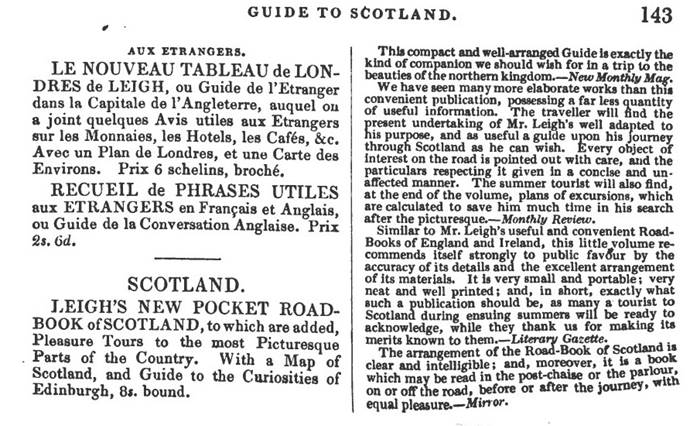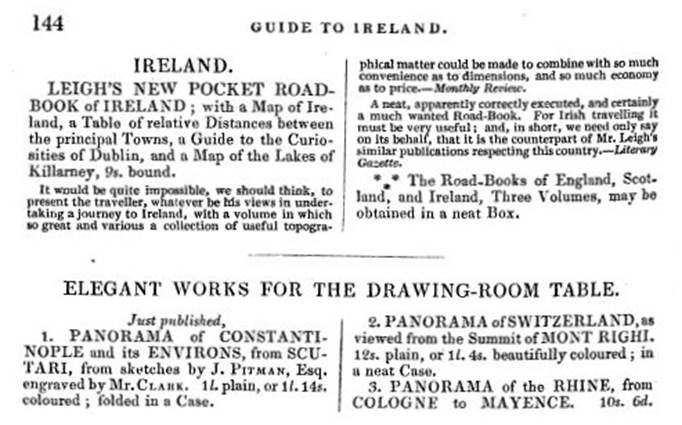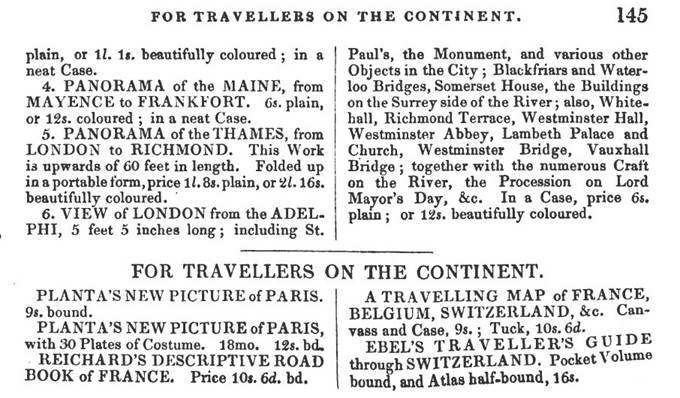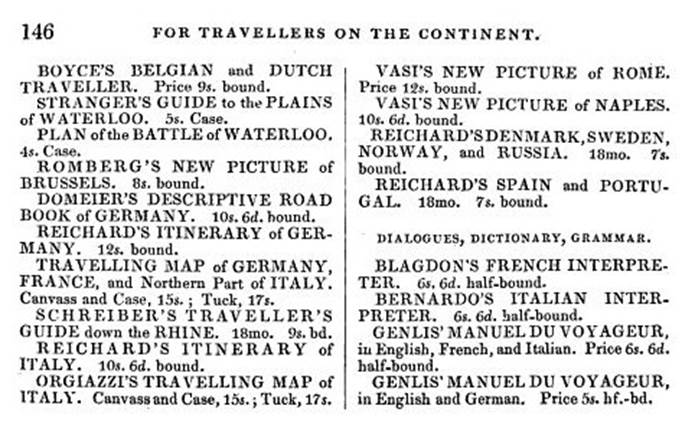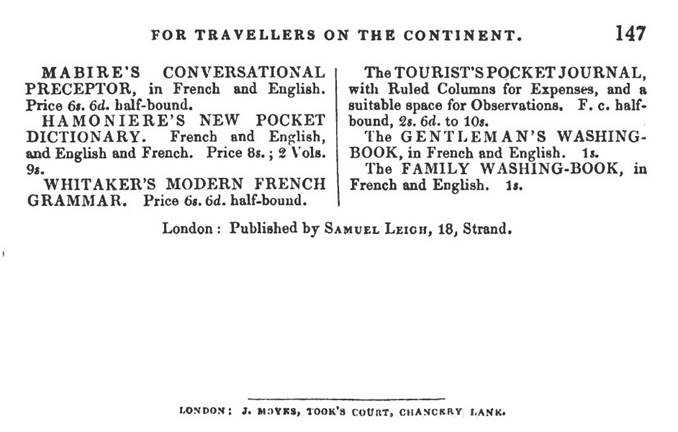|
|
|
|
|
|

(delwedd J7175)
(tudalen 009)
|
THE
WELSH INTERPRETER.
VOCABULARY.
The letters in Italics denote the syllable on which the emphasis must be
laid.
ENGLISH .
OF THE WORLD IN GENERAL.
The world.
The north.
The south.
The east.
The west.
The sun.
The moon.
|
PRONUNCIATION.
Am er beed unn guffred- deenol.
* Er beed.
Er gogleth. +
Er
day- 1.‡
Er dooerrine.
Er gorrthlow-win.
* Err hile, err hee-an.
Er thli-yad, er thlo- airr. *
*See
Rule 8, page 8.
+ See Rule 5, page 7. See Rule 7, page 8.
See Rule 4, page 6.
|
WELSH.
AM Y BYD YN GYFFREDINOL.
* Y byd.
Y gogledd. ‡
Y
deau. ‡
Y dwyrain.
Y gorllewin.
* Yr haul, yr huan.
Y lleuad, y lloer. *
|
|
|
|
|
|
|

(delwedd J7176)
(tudalen 010)
|
10 OF
THE WORLD IN GENERAL.
ENGLISH.
OF THE WORLD IN GENERAL.
A star.
Light.
Darkness.
The earth.
Air.
Fire .
Water.
The wind.
The weather.
The sea.
The heat.
The day.
The morning.
|
PRONUNCIATION.
Am er beed unn guffred- deenol.
Serren.
Go-li, golinee.
* Tow-
wilthlookht, tow- wilth-.
nee.
Erthi-arr.
Ow-weerr.
Tahn.
Doorr.
Er gwint.
Er tow-with. ‡
Er more.
Er goo- race.
Er
deeth.
Er bor-ri. * Whenever ow is used in the middle column, it must be pronounced
like the ow in the English words owl, how, now, &c.; never as in owe,
low, show, &c.
+ See Rule 4, page 6. See Rule 5, page 7. § See Rule 3, page 6.
|
WELSH.
AM Y BYD YN GYFFREDINOL.
Seren.
Goleu, goleuni.
*
Tywyllwcht, tywyllni
Y +
ddaear.
Awyr.
Tân.
Dwr.
Y gwynt.
Y tywydd. ‡
Y môr.
Y gwrês.
Y
dydd.
Y boreu.
|
|
|
|
|
|
|

(delwedd J7177)
(tudalen 011)
|
DAYS
OF THE WEEK. 11
ENGLISH.
OF THE WORLD IN GENERAL.
Noon.
Evening.
Night.
To-day.
Yesterday.
A minute.
An hour.
A week.
A month.
A year.
DAYS OF THE WEEK.
Sunday.
Monday.
Tuesday.
|
PRONUNCIATION.
Am er beed unn guffred- deenol.
Noun.
Hoo- eerr.
Nohss.
Heth-yoo.
Doe-ay.
Minnid.
Ourr.
Withnohss.
Meess.
Blweethin.
Duth-yi err withnohss.
Deeth seel.
Deeth thleen.
Deeth mow-errth.
* See
Rule 5, page 7.
|
WELSH.
AM Y BYD YN GYFFREDINOL.
Nawn.
Hwyr.
Nos.
Heddyw.
Doe.
Mynyd.
Awr.
Wythnos.
Mis.
Blwyddyn.
DYDDIAU YR WYTHNOS.
Dydd * sul.
Dydd llun.
Dydd mawrth.
|
|
|
|
|
|
|

(delwedd J7178)
(tudalen 012)
|
12
MONTHS OF THE YEAR.
ENGLISH.
DAYS OF THE WEEK.
Wednesday.
Thursday.
Friday.
Saturday.
MONTHS OF THE YEAR.
January.
February.
March.
April.
May.
June.
July.
August.
September.
October.
November.
December.
|
PRONUNCIATION.
Duth-yi err withnohss .
Deeth mairrkhairr.
Deeth yah- ee.
Deeth gwainerr.
Deeth sahdoorrn.
Meesso-eth er vlooeethin.
Yonnorr. * Khwevrorr.
Mow-errth.t
Ebbrilth. *
Mah-ee.
Mer
-hevvin.
Gorrfennav.
Ah-oost.
Meddee.
Huddrev.
Tahkh-weth.
Rhahg-veerr.
* See
Rule 4, page 6.
+ See Rule 5, page 7.
See Rule 8, page 8.
|
WELSH.
DYDDIAU YR WYTHNOS.
Dydd mercher.
Dydd iau.
Dydd gwener.
Dydd
sadwrn.
MISOEDD Y FLWYDDYN.
Ionor. * Chwefror.
Mawrth.t Ebrill. *
Mai Myhefin.. Gorphenaf.
Awst.
Medi.
Hydref.
Tachwedd.
Rhagfyr.
|
|
|
|
|
|
|

(delwedd J7179)
(tudalen 013)
|
SEASONS
OF THE YEAR.- 13
ENGLISH.
SEASONS
OF THE YEAR. MANKIND.
The spring.
The summer.
The autumn. The winter.
MANKIND.
Man.
Woman.
Men.
Women.
Boy.
Girl.
Boys.
Girls .
Child .
Children.
A young man.
A young woman.
|
PRONUNCIATION.
Tumhorri er vloo- ee-thin. Er gwahn win.
Err hahv.
Huddrev, er kunhi-yav.
Er ghi yav.
Dunnol
reeoo. Deen.
Dunness. Dun- yon.
Mairrkhide.
Bakhghen.
Ghenneth.
Bekhghin.
Ghennaithod, loddessee.
Plentin.
Plahnt.
Goorr yi-yank.
Mairrkh yi-yank.
|
WELSH.
TYMHORAU Y FLWYDDYN.
Y gwanwyn.
Hydref, y cynhauaf.
Y gauaf.
Yr haf.
DYNOL RYW. Dyn.
Dvnes.
Dynion.
Merchaid.
Bachgen.
Geneth.
Bechgyn.
Genethod, lodesi.
Plentyn.
Plant.
Gwr ieuanc.
Merch ieuanc.
|
|
|
|
|
|
|

(delwedd J7180)
(tudalen 014)
|
14
MANKIND. -- THE HUMAN BODY. - THE FIVE SENSES.
ENGLISH.
MANKIND.
An old man.
An old woman.
OF THE HUMAN BODY.
The head.
The eyes.
The ears.
The nose.
The mouth.
The arms.
The legs.
The feet.
The hands.
The fingers.
THE FIVE SENSES.
The sight.
The hearing.
|
PRONUNCIATION.
Dunnol reeoo. Hain oorr
Hain oo-rah-ig.
Am er korrf dunnol.
Er pen. Erthlug
-ghide
.
Er kleest- yi.
Er troo-in.
Er gaig, er ghenni.
Er brikhe-yi.
Er koyssi.
Er trah-ed.
Er dweelow.
Er busseth.
Er pimp sun-weer an-yah-nol.
Er golloog.
Er klow-wed. * See Rule 4, page 6.
|
WELSH.
DYNOL RYW.
Hen
wr.
Hen
wraig.
AM Y
CORFF DYNOL.
Y pen.
Y *llygaid
.
Y clustiau.
Y trwyn.
Y gêg, y genau.
Y breichiau.
Y coesau.
Y traed .
Y dwylaw.
Y bysedd.
Y PUMP SYNWYR ANIANOL.
Y golwg.
Y clywed.
|
|
|
|
|
|
|

(delwedd J7181)
(tudalen 015)
|
DEGREES
OF KINDRED.- WEARING APPAREL. 15
ENGLISH.
THE FIVE SENSES.
The smelling.
The taste.
The feeling.
DEGREES OF KINDRED.
The father.
The mother.
A son.
A daughter.
A brother.
A sister.
The husband .
The wife.
WEARING APPAREL.
A shirt.
A shift.
Stockings.
Stays.
|
PRONUNCIATION.
Er pimp sun-weer an-yah- nol.
Err ah-rog- lee- ad.
Er khwithe.
Er time-lad .
Gruh-thi
Karren-nĭth. Er tahd.
Er
vahm.
Mahb.
Mairrkh.
Browd.
Khwire.
Er goorr.
Er oo-
rah-ig.
Dithlad
(gwiss-go- eth).
Kreesse.
Kreesse mairrkh.
Hossanni.
Korrf(gwahsk-rooĭm).
|
WELSH.
Y PUMP SYNWYR ANIANOL.
Yr arogliad.
Y chwaeth.
Y teimlad.
GRADDAU
CARENYDD.
Y tâd.
Y fam.
Mâb.
Merch.
Brawd.
Chwaer.
Y gŵr.
Y wraig.
DILLAD
(GWISGOedd).
Crys.
Crys merch.
Hosanau.
Corff (gwasg-rwym).
|
|
|
|
|
|
|

(delwedd J7182)
(tudalen 016)
|
16
WEARING APPAREL.-COLOURS.
ENGLISH.
WEARING APPAREL.
A petticoat.
A night shirt.
A night cap.
A pocket handkerchief.
A neck handkerchief.
Pantaloons.
A coat.
A waistcoat.
A gown.
Асар.
A hat.
Gloves.
COLOURS.
White.
Blue.
Brown.
|
PRONUNCIATION.
Dithlad (gwiss-go-eth).
Pah-Iss.
Kreesse nohss.
Cap nohss.
Kahdahkh * thlowghelth.
Kahdahkh goothev.
Thlod-ri.
Pah-iss (coat).
Krissbah-iss.
Goone. Сар Het.. Mainig. Thleeoo-yi.
Gwinn.
Glahs.
Goorrm.
* See Rule 4, page 6.
|
WELSH.
DILLAD (GWISGOedd).
Pais.
Crys nos.
Cap nos.
Cadach * llaw-gell .
Cadach gwddf.
Llodrau.
Pais (côt).
Crysbàis.
Gwn.
Сар.
Het.
Menyg.
LLIWIAU.
Gwyn.
Glas. Gwrm.
|
|
|
|
|
|
|

(delwedd J7183)
(tudalen 017)
|
MEALS.
EATING AND DRINKING. 17
ENGLISH.
COLOURS.
Grey.
Yellow.
Black.
Purple.
Red.
Green.
MEALS.
Breakfast.
Luncheon.
Dinner.
Tea.
Supper.
EATING AND DRINKING.
Bread.
Butter.
Cheese.
Bread and butter.
|
PRONUNCIATION.
Thleeoo-yi.
Thloo-id, thloo -idlas.
Mailin.
Dee.
Rheeth, rheethgohkh.
Kohkh.
Gweerrth.
Prud-yi Boo-id.
Bor-ri-voo -id .
Boo-id kah- nol deeth.
Kin-yo.
Tay.
Sooppairr (kwee-noss).
Boo- ee-tah ak Uvved.
Bahrah.
Ummennin.
|
WELSH.
LLIWIAU.
Llwyd, llwydlas.
Melyn.
Du.
Rhudd, rhuddgoch.
Coch.
Gwyrdd.
PRYDIAU BWYD.
Boreufwyd.
Bwyd canol dydd.
Cinio.
Tê.
Swpper (cwynos).
Bara.
Kouse.
* Bahrah ah mennin.
* See Rule 3, page 6.
BWYTA AC YFED.
Ymenyn.
Caws.
Bara a ' menyn.
|
|
|
|
|
|
|

(delwedd J7184)
(tudalen 018)
|
18
EATING AND DRINKING.
ENGLISH.
EATING AND DRINKING.
Bread and cheese.
Biscuits.
Mutton.
Lamb.
Beef.
Veal.
Pork.
Bacon.
Ham.
Boiled lamb.
Roast lamb.
Boiled mutton.
Roast mutton.
Fish.
Poultry.
Fowls.
Ducks.
A goose.
An egg.
|
PRONUNCIATION.
Boo-ee-tah ak Uvved.
Bahrah ah khouse. Ti-sennee.
Keeg dahvad.
Keeg o-en.
Keeg-ide-yon (beef).
Keeg thlo .
Keeg mohkh.
Keeg mohkh (bahkoon) .
Garr mohkhin (ham).
Keeg o-en bare-weddig.
Keeg o - en rhohst- yeddig.
Keeg dahvad bare- weddig.
Keeg dahvad rhohst yeddig.
Peesk, pusgod.
Yi-yer, ahdarr dohv- yon.
Kowyon yi-yer.
Whee-yide.
Goo-ith .
Oo-ee.
|
WELSH.
BWYTA AC YFED.
Bara a chaw
Teiseni.
Cig dafad.
Cig oen.
Cig eidion (bîff) .
Cig llo.
Cig moch.
Cig moch (bacwn) .
Gar mochyn (ham).
Cig oen berwedig.
Cig oen rhostiedig.
Cig dafad berwedig.
Cig dafad rhostiedig.
Pysg, pysgod.
Ieir, adar dofion.
Cowion ieir.
Hwyaid.
Gwydd.
Wy.s.
|
|
|
|
|
|
|

(delwedd J7185)
(tudalen 019)
|
EATING
AND DRINKING. 19
ENGLISH.
EATING AND DRINKING.
Poached eggs.
Broiled ham.
Hung beef.
Salad.
Cucumber.
A lettuce.
A cauliflower.
Spinage.
Green peas.
Potatoes.
Mustard.
Pepper.
Vinegar.
Salt.
A plate.
Knife and fork.
A spoon.
A glass, a small glass.
|
PRONUNCIATION.
Boo-ee-tah ak Uvved.
Wee-yi bare-weddig.
Ham gohlossgheddig.
Beef krogheddig.
Booid-lush-yi, ahthah-il .
Khwerroo thoovrer (cucumber) .
Gollithe (lettiss) .
Bressikh bloddi - og flower).
Biggowgliss (spinage) .
Peece glishe-yon.
Kloron (pertattoos ) .
Keth- oo (moosstard).
Pippeer. Gween- a-gar (vinegar).
Hallen.
Plaht.
Kulthlelth ah forrkh .
Thloo-ee.
Gweedeer, gweedrin.
|
WELSH.
BWYTA AC YFED.
Wyau berwedig.
Ham golosgedig.
Biff crogedig.
Bwyd-lysiau, addail.
Chwerw-ddwfr (ciwcymber).
Gōlaeth (lettis).
(cauli- Bresych- blodeuog (coli- flower).
Bigowglys (spinage) .
Pys gleision.
Cloron (pytatws).
Cethw (mwstard).
Pùpyr.
Gwin- egr (vinegar) ..
Halen.
Plât.
Cyllell a fforch.
Liwy.
Gwydr, gwydryn
|
|
|
|
|
|
|

(delwedd J7186)
(tudalen 020)
|
20
EATING AND DRINKING.--ANIMALS .
ENGLISH.
EATING AND DRINKING.
A jug.
A mug.
Acup.
A teacup.
A pint.
A quart.
Brandy.
Rum.
Gin.
Ale.
Porter.
Cider.
Beer.
Wine.
ANIMALS.
A lamb.
An ox.
A cow.
|
PRONUNCIATION.
Boo-ee-tah ak Uvved Joog.. Moog
Coopan..
Coopan day. Pinte.
Khwarrt.
Brandy.
Rum.
Gin.
Kooroo.
Porter.
Ossi (cider).
Beerr.
Gween. Annee-vile-yide. O-en.
Ide-yon.
Bee-ookh.
|
WELSH. BWYTA AC YFED.
Jwg.
Mwg.
Cwpan.
Cwpàn
dê.
Peint.
Chwart.
Brandi.
Rym.
Gin.
Cwrw.
Porter.
Osai (sider).
Bîr.
Gwin.
ANIFEILIAID.
Oen.
Eidion.
Buwch.
|
|
|
|
|
|
|

(delwedd J7187)
(tudalen 021)
|
ANIFEILIAID.
ANIMALS. - FISH. 21
A dog.
A pig.
A horse.
A pony.
ENGLISH.
ANIMALS.
AWelsh pony.
A hen.
A cock.
A chicken.
A duck.
A drake.
Agoose.
A gander.
FISH.
A
plaice.
A salmon.
A sole.
A trout.
|
PRONUNCIATION.
Annee- vile-yide.
Kee.
Mohkhin.
Keffil.
Mairrlin, keffellin.
Mairrlin kumri-ig.
Yarr.
Kile-yog.
Kew.
Hoo- ee-ah- den.
Kile-yog hoo-ee-ad.
Goo-ith.
Kile-yog- with.
Pusgod.
Thled-den er more.
Glishe-yad.
Thled- den khwith- ig, tavvod err heeth.
Bree- thilth.
|
WELSH.
ANIFEILIAID. Ci.
Mochyn.
Merlyn, ceffylyn.
Ceffyl.
Merlyn cymreig.
Iar.
Ceiliog.
Cyw.
Hwyaden.
Ceiliog hwyad.
Gwydd.
Ceiliogwydd.
PYSGOD.
Lleden y mor.
Gleisiad.
Lleden chwithig, tafod yr hydd.
Brithyll.
|
|
|
|
|
|
|

(delwedd J7188)
(tudalen 022)
|
22
FISH.-FRUIT AND FRUIT- TREES.
ENGLISH.
FISH .
A salmon trout.
A mackerel.
A whiting.
A herring.
A lobster.
An oyster.
FRUITS AND FRUIT- TREES.
An apple.
An apple- tree.
Apear.
A pear- tree.
A currant.
A currant-bush.
A gooseberry.
A gooseberry-bush.
A cherry.
A cherry- tree.
|
PRONUNCIATION.
Pusgod.
Gwin-yeddin.
Mak-relth.
Gwin-yad.
Pennog, ussgahdennîn.
Ki-mookh.
Thlummarrkhen.
Ire-ron ahfroo-ith-go- ed.
Ah-val.
Ah- vahlth-len.
Gheth - lug - ghen, pairran,
gairr -thlug- ghen .
Pren pairr, prengairr-thlig.
Groun korrinth, kurrans.
Rheess-with- en.
1-ree-nen vah- eerr.
Pairrth ire-thruh- in.
Kire- yossen.
Pren kire-yoss.
|
WELSH.
PYSGOD.
Gwyniedyn.
Macrell. Gwyniad.
Penog, ysgadenyn.
Ceimwch.
Llymarchen. AERON A FFRWYTH- GOED.
Afal.
Afallen.
Gellygen, peran, gerllygen.
Pren pêr, pren gerllyg.
Grawn corinth, cyrans.
Rhyswydden.
Eirinen fair.
Perth eur-ddrain.
Ceiriosen.
Pren ceirioes.
|
|
|
|
|
|
|

(delwedd J7189)
(tudalen 023)
|
FRUITS
AND FRUIT-TREES. - TREES NOT BEARING FRUIT. 23
ENGLISH.
FRUITS AND FRUIT-TREES.
A strawberry.
A strawberry- plant.
A raspberry.
A raspberry-bush.
A walnut.
A walnut- tree.
An orange.
A plum.
A plum-tree.
TREES NOT BEARING FRUIT.
An oak.
An ash.
A beech
A yew-tree.
A laurel.
|
PRONUNCIATION.
Ire-ron ahfroo-ith-go- ed.
Mevveesen.
Planhee-ghin mevvĭs.
Mavvonnen, ahvahnen.
Pren ahvan.
* Knī- en freng-ig.
Kothlen freng-ig.
Ahval i-rad.
I-ree- nen.
Pren i-rin.
Ko-ed nass duggant froo-ĭth.
Dairr-wen.
Onnen.
Fah-with-en.
Pren yoo.
Thlow-roo-ith.
This k
must be pronounced; not left out as in the English words knife,
knight,"&c.
|
WELSH.
AERON A FFRWYTH- GOED.
Mefusen.
Planhigyn mefus.
Mafonen, afanen.
Pren afan.
*Cneuen ffrengig.
Collen ffrengig.
Afal- eurad.
Eirinen.
Pren eirin .
COED NAS DYGANT FFRWYTH.
Derwen.
Onen.
Ffawydden.
Pren yw.
Llawrwydd.
|
|
|
|
|
|
|

(delwedd J7190)
(tudalen 024)
|
24 OF
THE COUNTRY.
ENGLISH.
A TREES NOT BEARING
An elm.
A willow.
FRUIT.
OF THE COUNTRY.
A village.
Acountry-house.
A dwelling.
A mansion.
A fortress.
A castle.
A keep.
Druid.
Druidical remains.
A windmill.
A farm .
A barn.
A cowhouse.
The dairy.
|
PRONUNCIATION.
Ko-ed nass duggantfroo-ĭth.
Thloo-ee-vannen.
Hellugghen.
Am er oo-lad.
Pentrev.
Tee goolad.
Trigvah.
Anneth, presswillvod.
Amtheefunvah, kah- eerr.
Kahss-telth.
Deeoghelvah.
Dairrwith.
Gwethilth-yon dairruithol.
Mellin wint.
Tuth-in.
Ussghee- bore.
Bi-dee.
Er thlithe-dee.
|
WELSH.
COED NAS DYGANT FFRWYTH.
Llwyfanen.
Helygen.
AM Y WLAD.
Pentref.
Ty gwlad.
Annedd, preswylfod .
Trigfa.
Castell.
Diogelfa.
Derwydd.
Amddiffynfa, caer.
Gweddillion derwyddol.
Melin wynt.
Ysgubor.
Tyddyn.
Beudy.
Y llaethdy.
|
|
|
|
|
|
|

(delwedd J7191)
(tudalen 025)
|
OF THE
COUNTRY. 25
ENGLISH.
OF THE COUNTRY.
A garden.
A plantation.
A shrubbery.
Flowers, plants.
Shrubs, heath.
A field.
A hedge.
A ditch.
A path.
Grass.
Corn.
The harvest.
A spade.
A hoe.
A scythe.
A rake.
A cart.
A waggon.
The wheels.
|
PRONUNCIATION.
Garrth.
Am er oo-lad.
Planhigvah.
Manwithvah, preeskvah.
Bloddi, planheeg-yon.
Preeskwith, greeg.
Kah-ee.
Goo-reerkh, klowth.
Fohss.
Thlooeebeerr.
Gweltht glahs.
Eed.
Er kun-hi-yav.
Rhow.
Kibe.
Plah-deerr.
Kreebin.
Troll.
Menn.
Err oll-ween-yon.
|
WELSH.
AM Y WLAD.
Gardd.
Planhigfa.
Manwyddfa, prysgfa.
Blodau, planhigion.
Prysgwydd, grug.
Cae.
Gwrych, clawdd.
Ffös.
Llwybyr.
Gwellt glas.
Yd.
Y cynhauaf.
Rhaw.
Caib.
Pladur.
Cribyn.
Trol.
Men.
Yr olwynion.
|
|
|
|
|
|
|

(delwedd J7192)
(tudalen 026)
|
26 OF
THE COUNTRY.
ENGLISH.
OF THE COUNTRY.
The spokes.
A hill.
Apass.. A mountain pass.
A mountain.
A valley.
A wood.
A cliff.
A river.
A lake.
A waterfall.
A precipice.
Arapid descent.
A rock, rocks.
Granite.
Limestone.
Slate.
A heap of stones.
A pile of stone- work.
|
PRONUNCIATION.
Am er oo-lad.
Er brikhe- yī.
Brinn.
Trooĭthid, trooĭthed.
Boolkh di vunnĭth.
Munnith.
Duffrin.
Ko- ed, koydwig.
Deebín.
Ahvon.
Thlin.
Rhiahderr.
Deebin, deefooiss.. Gorreewahred khweerrn.
Krah-ig, kraig-yi.
Gronnin-vah- en.
Kerrig-kahlkh.
Thlaykh .
Karrneth.
Ahdah-il o withe kerrig.
|
WELSH.
AM Y WLAD.
Y breichiau.
Bryn.
Trwyddyd, trwydded.
Bwlch dau fynydd.
Mynydd.
Dyffryn.
Coed, coedwig.
Dibyn.
Afon.
Llyn.
Rhaiadr.
Dibyn, diffwys.
Goriwared, chwyrn.
Craig, creigiau.
Gronyn-faen.
Ceryg- calch.
Llech.
Carnedd.
Adail o waith ceryg.
|
|
|
|
|
|
|

(delwedd J7193)
(tudalen 027)
|
OF THE
COUNTRY. 27
ENGLISH.
OF THE COUNTRY.
Ruins.
High ground.
Lowground.
Flat ground.
Pasture.
Pasturage .
A ditch.
A dyke.
A trench.
An excavation.
A glen.
Ahollow way.
A vale.
Shelving rocks.
Verdure.
Grass.
Moss..
|
PRONUNCIATION.
Am er oo-lad.
Advile-vi.
Teerr eekhel, di- err eekhel.
Eesel-deerr, teerr eesel.
Gwasstad- teerr.
Porrvah.
Porrvi- yithe.
Klowthe.
Fohss.
| Rheegol.
Ki-yad.
Glan.
Forrth -ghi- ol .
Duffrin.
Kraig-yi thleth-rog, kraig-yi thlekhweth- og .
Gweerrth-dairr, gweerrthless- nee.
Gweltht-glabs.
Moos- soggle
|
WELSH.
AM Y WLAD.
Adfeiliau.
Tir uchel, daear uchel.
Isel-dir, tir isel.
Gwastad- tir.
Porfa.
Porfeuaeth.
Clawdd.
Ffos .
Rhigol.
Ceuad.
Glan.
Ffordd- geuol.
Dyffryn.
Creigiau llethrog, creigiau llechweddog.
Gwyrdd- der, gwyrddlesni.
Gwellt-glas.
Mwsogl.
|
|
|
|
|
|
|

(delwedd J7194)
(tudalen 028)
|
28
SPORTS. OF A TOWN.
ENGLISH.
OF THE COUNTRY.
Heath.
Minerals.
Lead-ore.
Iron-ore.
SPORTS.
Hunting.
Shooting.
Fowling.
Fishing.
Swimming.
OF A TOWN.
A town.
A street. Heol.
A bridge.
Pont.
A church.
A house.
The market.
An inn.
|
PRONUNCIATION.
Am er oo-lad.
Greeg.
Mooni.
Moon ploom.
Moon hi-yarrn.
Hellee-ithe.
Unn hay- lah.
Unn sithe-ee.
Unn ahdah-ree.
Unn peess-gottah Unn nov- yo.. Am Draiv. Traiv Hay-ol.. Thlahn, eg-loo-Iss.
Tee.
Er varrkhnad.
Gwest- dee.
|
WELSH.
AM Y WLAD. Grug.
Mwnau.
Mwn plwm.
Mwn haiarn.
Yn helá.
HELYAETH.
Yn saethu.
Yn adaru.
Yn pysgota. Yn nofio. AM DREF.
Tref.
Y farchnad.
Gwestdy.
Pont.
Llan, eglwys.
Ty.
|
|
|
|
|
|
|

(delwedd J7195)
(tudalen 029)
|
PROFESSIONS,
TRADES, AND OCCUPATIONS. 29
ENGLISH.
PROFESSIONS, TRADES,
AND OCCUPATIONS.
A clergyman.
A minister of the church
of England.
A dissenting minister.
Aparson.
A physician.
A doctor.
A surgeon.
A druggist.
A chemist.
A farrier.
A lawyer.
A bookseller.
A hosier.
A hatter.
An ironmonger.
|
PRONUNCIATION.
Galweddee-ghithi, Kreft-yi,
ah Galwahdi.
Ohfire-yad. Gwineedog eglooĭss loygherr,
sa- Thlivvre-wairr-thĭth.
Hosanni-yoorr, hosannith,
sanni-yoorr. Het-yoorr.
Hi-arrnoorr, hi-arrnith.
neuwr.
c 2
|
WELSH.
GALWEDIGAETHAU, CREFFT- IAU, A GALWADAU.
Offeiriad.
Gweinidog eglwys loegr,
gwr- eglwysig.
Person.
Gweinidog ymneillduol.
Physygwr.
Meddyg, doctor.
Meddyginiaethwr.
Meddyg.
Fferyll.
Meddyg meirch.
Cyfreithiwr.
Llyfrwerthydd.
Hosaneuwr, hosanydd, ' Hetiwr.
Haiarnwr, haiarnydd.
|
|
|
|
|
|
|

(delwedd J7196)
(tudalen 030)
|
30 PROFESSIONS, TRADES, AND OCCUPATIONS.
ENGLISH.
PROFESSIONS, TRADES,
AND OCCUPATIONS.
A butcher.
A baker.
A grocer.
A green grocer.
A fishmonger.
A fruiterer.
A gardener.
A bricklayer.
A painter.
A plasterer.
A paper-hanger.
A tobacconist.
A blacksmith.
A carpenter.
|
PRONUNCIATION.
Galweddee-ghithi, Kreft-yi,
ah Galwahdi.
Pobbith, poboorr.
Kiggheeth.
Pairrlush-yi- yith.
eer-lush-yi.
Thlush-yi-yith, gwairrthoorr
Gwairrthoorr puscod, puscod- oorr.
Ire-ron-wairrthith gwairr- thoorr, frooithi koydĭth.
Garrthoorr.
Sah- eerr preeth-vi- nee.
Pinte-yoorr, thloo-yoorr.
Plahstroorr, plahstrĭth.
Pahpeerroorr parrweedĭth.
Tubbak-koorr.
Gohv.
Sah-eerr ko-ed.
|
WELSH.
GALWEDIGAETHAU, CREFFT- IAU, A GALWADAU.
Cigydd.
Perlysieuydd.
Pobydd, pobwr.
Llysieu-ydd, gwerthwr ir- lysiau.
Gwerthwr pysgod, pysgodwr Aeron-werthydd, gwerthwr ffrwythau coedydd.
Garddwr.
Saer pridd-feini.
Paentiwr, lliwiwr.
Plastrwr, plastrydd.
Papurwr parwydydd.
Tybacwr.
Gôf.
Saer coed.
|
|
|
|
|
|
|

(delwedd J7197)
(tudalen 031)
|
PROFESSIONS,
TRADES, AND OCCUPATIONS. 31
ENGLISH.
PROFESSIONS, TRADES,
AND OCCUPATIONS.
A harness-maker.
A sadler.
A wheelwright.
A tailor.
A shoemaker.
bootmaker.
A barber.
A washerwoman.
A farmer.
A labourer.
A ploughman.
A master.
A servant.
|
PRONUNCIATION.
Galweddee-ghithi, Kreft-yi,
ah Galwahdi.
Goonītheeroorr harr-nice.
Kuvrooyoorr.
eerr olween- yon. Olweenoorr, rhoddoo-err, sah- Olwynwr, rhodwr, saer olA
tavern-keeper, a pub- Tahvarrnoorr.
lican.
A goonitheeroorr Tile-yoorr.
Kreeth.
Bottassoorr, bottassi.
Barrvoorr.
Gollkhuth-ess.
Tuthennoorr. Tyddynwr.
Thlahveeroorr.
tasau.
Ahrahdoo-err. Mice-teerr. Gwahss
|
WELSH.
GALWEDIGAETHAU, CREFFT- IAU, A GALWADAU.
Gwneuthurwr harnais.
Cyfrwywr.
Botaswr,
gwneuthurwr bo-
wynion.
Tafarnwr.
Taeliwr. Crydd. Barfwr.
Golchyddes.
Llafurwr. Aradwr.
Meistr.. Gwas.
|
|
|
|
|
|
|

(delwedd J7198)
(tudalen 032)
|
32 TRADESMEN'S TOOLS. - STATIONERY.
ENGLISH.
PROFESSIONS, TRADES,
AND OCCUPATIONS.
A maid-servant.
An ostler.
A groom.
TRADESMEN'S TOOLS.
An awl.
A chisel.
A nail.
A wedge.
A hatchet.
A file.
A hammer.
A plane.
A saw.
STATIONERY.
Paper.
Pens.
|
PRONUNCIATION.
Galweddee-ghithi, Kreft-yi,
ah Galwahdi.
Morrwin.
Marrkhoorr, ustahbloor.
Gwahsstroud.
Offairr- unni Kreft- weerr.
Munnow-wid.
Keen.
Ho-el.
Gah-ing.
Bwee-ahlth.
Rhug-nen, deerrleev.
Moorr-thooil.
Kahnweerr.
Thleev.
Noo-ee-vi gorrsahvol.
Pahpeerr.
Uss- gree-velth-lee.
|
WELSH.
GALWEDIGAETHAU, CREFFTIAU, A GALWADAU.
Morwyn.
Marchwr, ystablwr.
Gwastrawd.
OFFERYNAU CREFFTWYR Mynawyd.
Cyn.
Hoel.
Gaing.
Bwyall.
Mwrthwyl.
Rhygnen, durlif.
Canwyr.
Llif.
NWYFAU GORSAFOL.
Papyr.
Ysgrifelli..
|
|
|
|
|
|
|

(delwedd J7199) (tudalen 033)
|
METALS.- COINS. 33
ENGLISH.
Ink.
Wax.
STATIONERY.
Wafers.
A book.
METALS.
Gold.
Silver.
Steel.
Brass.
Iron.
Lead.
Tin.
COINS.
A halfpenny.
A penny.
One
penny.
|
PRONUNCIATION.
Noo-ee-vi gorrsahvol .
Dee, ink.
Koo-eerr.
Thlay-thenni.
Thlivvre.
Telleedi.
Ah- eerr. Ahree-an.
Deerr.
Praiss .
Hi-arrn. Ploom. Usstah-en.
Ahree-an
Bahth. Dim-mi.
Kine-yog.
Een ghine-yog.
|
WELSH.
NWYFAU GORSAFOL.
Du, inc.
Cwyr.
Llethenau.
Llyfr.
TELIDAU.
Aur.
Arian.
Dur.
Pres.
Haiarn.
Plwm.
Ystaen.
ARIAN BATH.
Dimai.
Ceiniog.
Un geiniog.
|
|
|
|
|
|
|

(delwedd J7200) (tudalen
034)
|
34 THE
CARDINAL NUMBERS.
ENGLISH.
COINS.
Twopence.
Threepence.
Fourpence.
Sixpence.
Eightpence.
Tenpence.
One shilling.
Half-a-crown.
A crown.
A pound sterling.
THE CARDINAL NUMBERS.
One.
Un.
Two.
Three.
Four.
Five.
Six.
|
PRONUNCIATION.
Ahree-an Bahth.
Doo-ee ghine-yog.
Tire kine-yog.
Peddire kine-yog.
Khwaikh khine-yog.
Oo-ith ghine- yog.
Daig kine-yog.
Een sooltht.
Hannair korron.
Korron.
Pint.
Er preeve ree- ved- dee. Een.
Dī, doo-ee.
Tree, tire.
Pedwarr, peddire .
Pimp, pemp.
Khwaikh.
|
WELSH.
ARIAN BATH.
Dwy geiniog.
Tair ceiniog.
Pedair ceiniog.
Chwech cheiniog.
Wyth geiniog.
Deg ceiniog.
Un swllt.
Hanner coron.
Coron.
Punt.
Y PRIF RIFEDI.
Un.
Dau, fem. dwy.
Tri, fem. tair.
Pedwar, fem. pedair.
Pump, fem. pemp.
Chwech.
|
|
|
|
|
|
|

(delwedd J7201)
(tudalen 035)
|
THE
CARDINAL NUMBERS. 35
ENGLISH.
THE CARDINAL NUMBERS.
Seven.
Eight.
Nine. Ten. Eleven. Twelve.
Thirteen.
Fourteen...
Fifteen.
Sixteen.
Seventeen.
Eighteen.
Nineteen.
Twenty.
Thirty.
Forty.
Fifty.
Sixty.
|
PRONUNCIATION.
Er preeve ree-ved-dee .
Sithe.
Oo-ĭth.
Now.
Daig.
Eenarrtheg.
Di-theg. Tree- arrtheg. Pedwar-arrtheg Pum-theg. Eenarrbumtheg.
Di-arrbumtheg.
Tree-arrbumtheg.
Pedwarr-arrbumtheg. Ig-ghine.
Daig-ar-igghine.
Di- ghine.
Daig ah di-ghine.
Tree ig- ghine.
|
WELSH.
Y PRIF RIFEDI.
Saith.
Wyth.
Naw.
Deg.
Unarddeg.
Deuddeg.
Triarddeg. Pedwararddeg
Pymtheg.
Unarbymtheg.
Dauarbymtheg Triarbymtheg.
Pedwararbymtheg.
Ugain.
Degarugain.
Deugain.
Degadeugain.
Tri ugain.
|
|
|
|
|
|
|

(delwedd J7202)
(tudalen 036)
|
36 THE CARDINAL NUMBERS.
ENGLISH.
THE CARDINAL NUMBERS.
Seventy.
Eighty.
Ninety.
A hundred.
Two hundred.
A thousand.
A million.
|
PRONUNCIATION.
Er preeve ree-ved-dee.
Daig ah three ig-ghine.
Pedwarr ig-ghine.
Daig ahfedwarı ig- ghine.
Kahnt.
Di kahnt.
Meel.
Merrth-yoon, bee-nah.
|
WELSH.
Y PRIF RIFEDI.
Deg a thri- ugain.
Pedwar ugain.
Deg a phedwar ugain.
Cant.
Dau cant.
Mil.
Myrddiwn, buna.
|
|
|
|
|
|
|

(delwedd J7203)
(tudalen 037)
|
THE
WELSH INTERPRETER.
PHRASES.
The letters in Italics denote the syllable on which the emphasis lies.
ENGLISH.
ARRIVING AT AN INN.
Landlord.
Waiter.
Can you let me have a
bed?
Can I sleep here?
|
PRONUNCIATION.
Arr thuvvod-yad at Westvah.
Goorr er tee.
+
Dissgwillĭth. ‡
Ah ved-rookh khwee ahdah- el ee
mee gah- el gwellee?
Ah ahthlav vee gussghee ummah? * See Rule 8, page 8. + See Rule 7, page 8.
See Rule 5, page 7. See Rule 4, page 6. || See Rule 3, page 6.
|
WELSH.
AR DDYFODIAD AT WESTFA.
Gwr y tŷ.
+
Dysgwylydd.
A fedrwch Schwi adael i mi
gael gwely?
Aallaf fi gysgu yma?
|
|
|
|
|
|
|

(delwedd J7204)
(tudalen 038)
|
38
ARRIVING AT AN INN.
ENGLISH.
ARRIVING AT AN INN.
Can I sleep here to-night?
Can we sleep here to- night?
Can I have a bed here tonight?.
cannot.
We have no room.
Can you get me a bed in
the neighbourhood?
Can you get a bed for us to- night?
You can have a bed in a double-bedded room.
|
PRONUNCIATION.
Arr thuvvod-yad at Westvah.
Ah ahthlav vee gussghee ummah henno?
Ah ahthloon nee gussghee ummah henno?
Ah ahthlav vee gah- el gwellee ummah henno?
Yes, you can; no, you Gahthlook; nah ahthlookh Nid o-es ganthom thĭm
thlay.
Ah ved-rookh khwee gah- el gwellee
ee mee unn er gummerdogghithe.
Ah ved-rookh khwee gah-el gwellee ee nee henno?
Ghethlookh gah- el gwellee mĭoun
ustahvelth di-wellee- og.
* See Rule 4, page 6.
|
WELSH.
AR DDYFODIAD AT WESTFA.
A allaf fi gysgu yma heno?
A allwn ni gysgu yma heno?
A allaf fi gael gwely yma heno?
Gallwch; na allwch.
Nid oes ganddom ddim lſe.
A fedrwch chwi gael gwely i
mi yn y gymmydogaeth?
| A fedrwch chwi gael gwely i
ni heno?
Gellwch gael gwely mewn
ystafell dau-welyog.
+ See Rule 7, page 8.
The ou in this word to be pronounced as in the English word noun, and the
ĭ as short as possible.
|
|
|
|
|
|
|

(delwedd J7205)
(tudalen 039)
|
ARRIVING
AT AN INN. 39
ENGLISH.
ARRIVING AT AN INN.
That will do very well.
That will not do.
Where is the chamber- maid?
Take charge of the ladies .
Take the lady up stairs.
Take the lady into a pri- vate room.
Ladies, please to walk this way.
Shew the lady up stairs.
Shew the ladies into the
parlour.
|
PRONUNCIATION.
Arr thuvvod-yad at Westvah.
Mee oonife hunnee unn beerr-yon.
Nee oonife hunnee morr tro.
Unn mhah lay er mah- eer usstah- velthluthess?
Kummairrookh o-val ghiddah er pen- devveeghessi. (Ladis. )
Kummairrookh er bendeveeghess ee
vunnee er greeshe-yī.
Kummairrookh er vonnetheeghess ee usstahvelth theerrghel.
Rhung- ed bothe ee khwee vonnethee- ghessī gairrthed er forrth ummah.
Dang-ossookh er vonnetheeghess ee
vunnee er greeshe-yi.
Dang- ossookh er bonnetheeghessi ee
mioun ee- err parrlowrr.
* See note (1), page 38.
+ See note (*), page 10.
|
WELSH.
AR DDYFODIAD AT WESTFA.
Mi wneiff hyny yn burion.
Ni wneiffhyny mo'r tro.
Yn mha le y mae'r ystafellyddes.
Cymmerwch ofal gyda y pen- defigesau. (Ladis. )
Cymmerwch y bendefiges i
fyny y grisiau.
Cymmerwch y foneddiges i
ystafell ddirgel.
Rhynged bodd i chwi foneddi- gesau gerdded y ffordd yma.
Dangoswch y foneddiges i
fyny y grisiau.
Dangoswch y boneddigesau i
+
mewn i'r parlawr.
|
|
|
|
|
|
|

(delwedd J7206)
(tudalen 040)
|
40
ARRIVING AT AN INN.
ENGLISH.
ARRIVING AT AN INN.
Shew me my room.
Are the sheets well aired?
Bring my luggage.
Can you get my linen
washed? (shirts, &c. )
Take my coat to the tailor.
Dry my great- coat.
Can you get me some
snuff?
Get me some plain snuff,
(not scented. )
|
PRONUNCIATION.
Arr thuvvod-yad at Westvah.
Dang-ossookh ee mee ver ustah- velth.
Ah uddint er kunvassi weddee I
sukhee unn thah?
Dowkh ah mheth -ī ee.
Ah ved-rookh khwee gah- el gollkhee +
ver thlee-ine-yi? (krussi, &c. )
Kummairrookh verng thote (seepog)
ee-err tile-yoorr.
Sukhookh verng hobe vowrr.
Ah ved-rookh khwee gah- el ee mee $
ukhuddig o usstrowlookh?
Kishe-yookh
ee mee ukhuddig o uss-
* See Rule 8, page 8. + See Rule 7, page 8. See Rule 6, page 8. See note (*),
page 10.
|
WELSH.
AR DDYFODIAD AT WESTFA.
Dangoswch i mi fy ystafell.
A ydynt y cynfasau wedi eu sychu yn ďda?
Dowch a' mhethau i .
Afedrwch chwi gael golchi fy +
llieiniau? (cry sau, &c. )
Cymmerwch fy nghôt (si- pog) i'r tailiwr.
Sychwch fy nghôb fawr.
A fedrwch chwi gael i mi
ychydig o ystrewlwch?
Ceisiwch i mi ychydig o
trowlookh peerr dee ahrobgle. ystrewlwch pur di arogl.
|
|
|
|
|
|
|

(delwedd J7207)
(tudalen 041)
|
WITH
THE OSTLER. 41
ENGLISH.
ARRIVING AT AN INN.
Fetch me some paper,
pens, ink, wax, wafers.
Bring me a candle.
Waiter, bring me the boot-jack and slippers.
WITH THE OSTLER.
Ostler.
Take my horse.
Put up the horse.
Take off the bridle.
Take off the saddle.
Take off the harness.
Put up the chaise.
Put up the coach .
|
PRONUNCIATION.
Arr thuvvod-yad at Westvah.
Noll-yookh ee mee baith pahpeerr,
ussgreevelthli (pinnī ), dee ( ink),
koo - eerr, thlay-thenni (wafers).
Dowkh ah khanwilth ee mee.
Dissguillith, di- ookh ee mee er botass- wahss, arr ussloppennod .
Ghiddah err Ostler.
Marrkhwoorr (usstahblĭth).
Kummairr verng * heffil.
Rhowkh er keffil unn er stahbahl.
Tunnookh ummīthe er frooin.
Tunnookh ummīthe er kuvrooee.
Tunnookh ummīthe err harnice.
Rhowkh er gahdairr dan doe.
Rhowkh er kairrbid dan doe.
* See Rule 6, page 8.
D
|
WELSH.
AR DDYFODIAD AT WESTFA.
Noliwch i mi beth papyr,
ysgrifellau (pinau ), du (inc), cwyr, llethenau
(wafers).
Dowch a chanwyll i mi.
Dysgwylydd, deuwch i mi y
botas-was, a'r yslopenod.
GYDA YR OSTLER.
Marchwr (ystablydd).
Cymmer fy ngheffyl.
Rhowch y ceffyl yn y stabal.
Tynwch ymaith y ffrwyn.
Tynwch ymaith y cyfrwy.
Tynwch ymaith yr harnais.
Rhowch y gader dan dô.
Rhowch y cerbyd dan dô.
|
|
|
|
|
|
|

(delwedd J7208)
(tudalen 042)
|
42 SUPPER.
ENGLISH.
WITH THE OSTLER.
Clean the horse.
Clean the horses.
Spread some straw for the horse to lie on.
Give the horse a little water.
Have you given the horse,
horses, any corn, hay?
Give the horse, horses, a
feed ofcorn, alittle water.
Can we put up our car- riage, horses, here?
Have you room for, my horse, our horses?
SUPPER.
I am very hungry; what
|
PRONUNCIATION.
Ghiddah err Ostler.
Glanhay-ookh er keffil.
Glanhay-ookh er keffelli.
Ti- nookh weltht orrweth arrno.
ee-err keffil ee
Rhowkh ee-err keffil ukhuddig o
thoorr.
Ah rohth-ahssookh khwee ee- err kef- fil, keffelli, baith ki- errkh, gwire?
Rhowkh ee-err keffil, keffelli, baith ki-errkh, ukhuddig o thoorr.
Ah ahthloon roy ine kairrbid, ahn
keffelli, ee vunnee ummah?
Aho-ess ghennikh lay, ee verng keffil,
ee ine keffelli?
Kweenoss, (sooppairr. )
Er mah-ee arrnav low-airr o khwahnt
* See note (*), page 10.
|
WELSH.
GYDA YR OSTLER .
Glanhewch y ceffyl.
Glanhewch y ceffylau.
Taenwch wellt i'r ceffyl i
orwedd arno.
Rhowch i'r ceffyll ychydig o
ddwr.
A roddasoch chwi i'r ceffyl,
ceffylau, beth ceirch, gwair?
Rhowch i'r ceffyl, ceffylau,
beth ceirch, ychydig o ddwr.
A allwn roi ein cerbyd, a'n
ceffylau, i fyny yma?
A oes genych le, i fy ngheffyl,
i ein ceffylau?
CWYNOS (SWPPER).
Y mae arnaf lawer o chwant
|
|
|
|
|
|
|

(delwedd J7209)
(tudalen 043)
|
SUPPER.
43
ENGLISH.
SUPPER.
can you let me have for
supper?
I want supper.
What can you give mefor supper?
We have mutton, ham,
eggs, and spinage.
Let me have broiled ham
and spinage.
I will have poached eggs and broiled ham.
Give me a mutton chop.
Let us have a roasted leg of lamb.
Eggs and bacon.
|
PRONUNCIATION.
Kweenoss (Sooppairr).
boo-id; pah baith ah ved-rookh ahdah-el ee mee gah-el ee sooppairr?
Mah-ee arrnav īshe-yi sooppairr.
Baith ah ved-rookh khwee roy ee mee ee sooppairr?
Mah- ee ghennim gheeg dahvad, garr mohkhin (ham), wee-yi, ah feegog- liss
(spinage).
Gahday-ookh ee mee gah-el ham
gohlossgheddig (brooleyeddig ) ah spinage.
Mee vunnav vee wee-yi bare-weddig ah ham gohlossgheddig.
Rowkh ee mee ollwith o gheeg dahvad.
Gahday-ookh ee nee gah-el kleen o-en rohst-yeddig.
Keeg mohkh ak wee-yi.
|
WELSH.
CWYNOS (SWPPER).
bwyd; pa beth a fedrwch adael i mi gael i swpper?
Mae arnaf eísieu swpper.
Beth a fedrwch chwi roi i mi
i swpper?
Mae genym gig dafad, gar mochyn (ham), wyau, a
phigoglys ( spinage) .
Gadewch i mi gael ham
golosgedig (briwliedig) a
spinage.
Mi fynaf fi wyau berwedig a
ham golosgedig.
Rhowch i mi olwyth o gig dafad.
Gadewch i ni gael clun oen rostiedig.
Cig moch ac wyau,
|
|
|
|
|
|
|

(delwedd J7210)
(tudalen 044)
|
44
SUPPER.
ENGLISH.
SUPPER.
Ham and green peas.
A roasted fowl, boiled fowl.
Some bread and cheese.
Bread and butter.
Aglass ofwater, a biscuit.
Have you any biscuit?
Have you any fish?
Can yougive us a sallad?
I shall want my supper at
seven, eight, nine, ten o'clock.
Is supper ready?
When will supper be
ready?
|
PRONUNCIATION.
Kweenoss (Sooppairr).
Garr mohkhin (ham) ah feece-glishe- yon.
Ahdairrin rhohst- yeddig, ahdairrin
bare- weddig.
Paith bahrah ah khouse.
o vahrah ah khouse.
Bahrah ak ummennin.
or, Tippin
Guid-rīde o thoorr, ah thī- sen (biss- ghedden. )
Ah o-ess ghennikh rah… ee ti-senni?
Ah o-ess ghennikh rah- ee pusgod?
Ah ved-rookh khwee roy ee nee
ahthah-il (salad)?
Mee veeth arrnav ishe-yi ver sooppairr am sithe, oo-ith, now, daig o-err
glohkh.
Ah ud-yoo er sooppairr unn bahrod?
Pah amsairr er beeth er sooppairr unn bahrod?
|
WELSH.
CWYNOS (SWPPER).
Gar mochyn (ham) a phys- gleision.
Aderyn rhostiedig, aderyn berwedig.
Peth bara a chaws. or, Tipyn o fara a chaws.
Bara ac ymenyn.
Gwydraid o ddwr, a theisen (bisgeden. )
A oes genych rai teisenau?
Aoes genych rai pysgod? A fedrwch chwi roi i ni
addail (salad)?
Mifydd arnafeisieufy swpper am saith, wyth, naw, deg o'r gloch.
A ydyw y swpper yn barod?
Pa amsery bydd y swpper yn barod?
|
|
|
|
|
|
|

(delwedd J7211)
(tudalen 045)
|
SUPPER.
45
ENGLISH.
SUPPER.
Bring supper.
Have you any bottled ale?
Bring me some of your best ale.
Some water, a glass,
glasses, tumblers, mugs.
Aglass ofwine and water,
warm, with sugar.
White wine, port wine.
A glass of gin and water,
warm, cold, with sugar.
Aglass ofrum and water,
brandyandwater, warm,
cold.
|
PRONUNCIATION.
Kweenoss (Sooppairr) .
Di-ookh arr sooppairr.
Ah o-ess ganthokh gooroo kostrelleddig; or, gooroo mĭoun kostrelli?
Dowkh ee mee ukhuddig o ikh kooroo
gor-ri.
Ukhuddig o thoorr, gwìd-rin, gwid-rī,
koopahni, mug-yi.
Guid-ride o ween ah doorr, kunness,
ah shoogerr (seegerr) .
Gween guin, gween kohkh.
Gwid-ride o gin ah doorr, kunness,
o-airr, ah shoogerr (evvo shoogerr) .
Guid-ride o rum ah doorr, brandy ah doorr, kunness, o-airr.
* See note (+), page 38.
|
WELSH.
CWYNOS (SWPPER) .
Deuwch a'r swpper.
A oes ganddoch gwrw costreledig; or, gwrw mewn costrelau?
Dowch i mi ychydig o eich cwrw goreu.
Ychydig o ddwr, gwydryn,
gwydrau, cwpanau, mygiau.
Gwydraidowinadwr, cynhes,
a siwgr (sugyr).
Gwin gwyn, gwin coch.
Gwydraid oginadwr, cynhes,
oer, a siwgr (efo siwgr).
Gwydraid o rym a dwr,
brandi a dwr, cynhes, oer.
|
|
|
|
|
|
|

(delwedd J7212)
(tudalen 046)
|
46
GOING TO BED.
ENGLISH.
GOING TO BED.
I want a candle.
I will go to bed.
I will go to my room.
Put a rushlight in the room .
We have no rushlights,
madam.
Will a candle do?
Yes, but put it in a safe place.
Bring me an extinguisher and snuffers.
I want some warm water and salt to bathe my feet in.
Bring me some warm
water in a tub, and some salt.
We want a towel..
|
PRONUNCIATION.
Munnedyad ee Wellee.
Er mah-ee arrnav ishe- yi kanwilth .
Mee ahu im gwellee.
Mee ahv im husstahvelth.
Doddookh gahn- wilth vroo-in unn err usstahvelth.
Nid o -ess ganthom nee, mam,
canwilthli broo-in.
thim
Ah oo-nife canwilth er tro?
Goo-nife, ond rhowkh hee mioun thlay dee-og- ghel.
Dowkh ee mee theefoddĭth ah gline- yahdeerr.
Er mah-ee arrnav ishe- yi ukhuddig o thoorr twimmin ah hallen ee ollkhee vern
rahed.
Dowkh ee mee ukhuddig o thoorr kunhess mĭoun kelloorrn, ah faith hallen.
Er mah- ee arrnom īshe-yi tow- wel .
|
WELSH.
MYNEDIAD I WELY.
Y mae arnaf eisieu canwyll.
Mi af i'm gwely.
Mi af i'm hystafell.
Dodwch ganwyll frwyn yn
yr ystafell.
Nid oes ganddom ni, mam,
ddim canwyllau brwyn.
A wneiff canwyll y tro?
Gwneiff, ondrhowch hi mewn lle diogel.
Dowch i mi ddiffodydd a
gleiniadur.
Y mae arnaf eisieu ychydig o
ddwr twymyn a halen i
olchi fy nhraed.
Dowch i mi ychydig o ddwr cynhes mewn celwrn, a
pheth halen.
Y mae arnom eisiau tywel
|
|
|
|
|
|
|

(delwedd J7213)
(tudalen 047)
|
WITH A
NURSE, 47
ENGLISH.
GOING TO BED,
I want a towel,
Bring me water.
some warm
Bring a jug of cold water.
I want some soap.
Have you any finer soap?
Wehave no soap here,
Bring some pump-water,
Bring some spring-water,
Call me in the morning at four, five, six, seven,
eight o'clock.
WITH A NURSE,.
Where is the nurse?
|
PRONUNCIATION.
Munnedyad ee Wellee .
Er mah-ee arrnav īshe- yi tow- wel,
Dowkh ag ukhuddig o thoorr kunness ee mee.
Dowkh ahjug-yad o thoorr o -airr.
Ermah- ee arrnav īshe-yī paith saybon.
Ah o-ess ganthokh khwee baith saybon peerrahkh?
Nid oess ghennim thim saybon um- mah.
Dowkh ag ukhuddig o thoorr er poomp.
Dowkh ag ukhuddig o thoorr er
funnon.
Gahlookh vee unn er borri am
bedwar, pimp, khwaikh, sithe,
00-ith, o- err glohkh,
Ghiddah Mammīthe Ummhgh lay er mah- ee er vammithe?
|
WELSH.
MYNEDIAD I WELY.
Y mae arnaf eisieu tywel.
Dowch ag ychydig o ddwr cynhes i mi.
Dowch ajugiad o ddwr oer.
Ymae arnaf eisieu peth sebon.
A oes ganddoch chwi beth sebon purach
Nid oes genym ddim sebon
yma.
Dowch ag ychydig o ddwr y
pwmp.
Dowch ag ychydig o ddwr y
ffynnon.
Galwch fi yn y boreu am
bedwar, pump, chwech,
saith, wyth, o'r gloch.
GYDA MAMMAETH. Y'mha le y
mae y
fammaeth?
|
|
|
|
|
|
|

(delwedd J7214)
(tudalen 048)
|
48
WITH A NURSE.
ENGLISH.
WITH A NURSE.
Call the nurse.
Give the child some supper.
Give the children their
supper.
Is the child gone to bed?
Are the children gone to bed?
Take the child to bed.
Take the children to bed.
Undress the child .
Undress the children.
Will you wash and dress the child?
Will you wash and dress the children?
|
PRONUNCIATION.
Ghiddah Mammīthe.
Gahlookh er vammīthe.
Rhowkh baith sooppairr (kweenoss)
eerr plentin.
Rhowkh eerr plant i sooppairr.
Ud-yoo er plentin weddee munned yoo wellee?
Ah ithe er plant yoo gwellee?
Kummairrookh er plentin yoo wellee.
Kummairrookh er plant yoo gwellee.
Tunnookh ohth-yam er plentin.
Tunnookh ohth-yam er plant.
Ah oonay- ookh khwee ollkhee ah gweessgo am er plentín?
Ah oonay.ookh khwee ollkhee ah gweessgo am er plant?
|
WELSH.
GYDA MAMMAETH.
Galwch y fammaeth.
Rhowch beth swpper (cwy- nos) i'r plentyn.
Rhowch i'r plant eu swpper.
Ydyw y plentyn wedi myned i'w wely?
A aeth y plant i'w gwely?
Cymmerwch y plentyn i'w wely.
Cymmerwch y plant i'w gwely.
Tynwch oddiam y plentyn.
Tynwch oddiam y plant.
A wnewch chwi olchi a
gwisgo am y plentyn?
A wnewch chwi olchi a
gwisgo am y plant?
|
|
|
|
|
|
|

(delwedd J7215)
(tudalen 049)
|
WITH A
NURSE. 49
ENGLISH.
WITH A NURSE.
Will you dress the child?
Will you dress the child- ren?
Can you get some ofthe child's clothes washed?
Can you get the children's clothes washed?
Yes, madam, I can; no,
madam, I cannot.
Can you get them washed
by to-morrow evening?
The next day will do.
When can I have them?
Can you promise them on?
Let them be thoroughly dry.
|
PRONUNCIATION.
Ghiddah Mammīthe.
Ah oonay-ookh khwee thilthlahdee
er plentin?
Ah oonay- ookh khwee thilthlahdee er plant?
Ah ved-rookh khwee gah- el gollkhee rhah-ee o thilthlad er plentin?
Ah ved-rookh khwee gah-el gollkhee rhah-ee o thilthlad er plant?
Med-rav, mam; nah ved- rav, mam.
Ah ved-rookh khwee gah-el i gollkhee nhoo airrbin pridnoun er vorree?
Goonife er deeoorrnod gweddee er tro.
Pah breed er gahthlav vee ī kah- el nhoo?
Ah ved-rookh khwee i gah-tho nhoo arr -?
Gahday-ookh ĭth-int vode unn holthlol sukh-yon.
|
WELSH.
GYDA MAMMAETH.
A wnewch chwi ddilladu y
plentyn?
A wnewch chwi ddilladu y
plant?
A fedrwch chwi gael golchi rhai o ddillad y plentyn?
A fedrwch chwi gael golchi rhai o ddillad y plant?
Medraf, mam; nafedraf, mam.
A fedrwch chwi gael eu golchi nhw erbyn prydnawn y fory?
Gwneiffydiwrnod gwediytro.
Pa bryd y gallaf fi eu cael nhw?
A fedrwch chwi eu gaddo nhw ar -?
Gadewch iddynt fod yn hollol
sychion. D 2
|
|
|
|
|
|
|

(delwedd J7216)
(tudalen 050)
|
50
RISING IN THE MORNING.
ENGLISH.
WITH A NURSE.
Air the things before you
put them on.
Arethe clothes well aired?
RISING IN THE MORNING.
It is time to rise.
Is it time to get up?
What time is it?
It is seven o'clock.
It is eight o'clock.
I did not think it was so late.
I have not slept well.
I went to bed very late.
I feel very unwilling to get up.
RISING IN THE MORNING.
|
PRONUNCIATION.
Ghiddah Mammīthe.
Sukh-ookh er peth- i kin ee khwee I rhoy amdahnokh.
Ah ud-dint er dilth-lad weddee ī
sukhee unn yown?
Koddee unn er Borri.
Er mah- ee hee unn amsairr ee goddee.
Ah udyoo hee unn amsairr ee goddee vunnee?
Baith yoo err amsairr?
Ermah-ee hee unn sithe o- err glohkh.
Ermah-ee hee unn oo -ith o-err glohkh .
Nee veth-ull-yīce ee i bode hee morr hoo-eerr.
Nee khuss-ghice ee unn thah.
Mee 7-thĭm Im gwellee unn hoo-eerr yown.
Err 00-Iv vee unn time-lo unn beerr
annaywithlussgar ee goddee.
|
WELSH.
GYDA MAMMAETH.
Sychwch y pethau cyn i chwi eu rhoi amdanoch.
A ydynt y dillad wedi eu sychu yn iawn?
CODI YN Y BOREU.
Y mae hi yn amser i godi.
A ydyw hi yn amser i godi fyny?
Beth yw yr amser?
Y mae hi yn saith o'r gloch.
Ymae hi ynwyth o'r gloch.
Ni feddyliais i ei bod hi mor hwyr.
Ni chysgais i yn dda.
Mi eithym i'm gwely yn hwyr iawn.
Yr wyf fi yn teimlo yn bur
anewyllysgar i godi.
|
|
|
|
|
|
|

(delwedd J7217)
(tudalen 051)
|
51
ENGLISH.
RISING IN THE MORNING.
I am going to get up directly.
Send for a hair- dresser.
Shave me.
Dress my hair.
I want my boots, are they Er mah-ee arrnav īshe-yi verm hoot- clean?
Have you cleaned my shoes?
Will you brush my coat?
Bring my clothes.
I want some hot water to shave with.
Is there sufficient cold water in the room?
|
PRONUNCIATION.
Koddee unn er Borri.
Err uddoo- Iv vee unn mind ee goddee unn inn-yown.
Anvonnookh am drooshe- yeddith
gwahltht.
Ilthe-yookh vee. or, Torrookh verm harv vee.
Trooshe-yookh verng wahltht. yassi, ah uddin nhoo unn lahn?
Ah lahnahsohkh khwee ver ess-ghid- yi?
Ah oo-nay-ookh khwee vrooshe-yo verng-hote ee?
Dowkh ah vern hĭlthlad .
Er mah-ee arrnav īshe-yi ukhuddig o doorr po-eth ee ilthe-yo.
Ah o-ess dee-gon o thoorr o-airr unn err usstahvelth?
|
|
WELSH.
CODI YN Y BOREU.
Yr ydwyf fi yn mynd i godi yn uniawn.
Anfonwch
gwallt.
am drwsiedydd
Eilliwch fi. or,
mharf fi .
Torwch fy
Trwsiwch fy ngwallt.
Y mae arnaf eisieu fy mhwt- iasau, a ydyn' nhw yn lân?
A lânâsoch chwi fy esgidiau?
A wnewch chwi frwsio fy nghot i?
Dowch a fy nhillad.
Y mae arnaf eisieu ychydig o
dwr poeth i eillio.
Aoes digon o ddwr oer yn yr ystafell?
|
|
|
|
|
|
|

(delwedd J7218)
(tudalen 052)
|
52
BREAKFAST.
ENGLISH.
RISING IN THE MORNING.
Tell the chambermaid the
lady wants her.
Chambermaid, air this linen for me.
Give me my dressing- gown.
Give me my slippers.
Help me to dress.
Yes, I will ma'am..
I shall soon be ready for breakfast.
BREAKFAST.
I want breakfast.
Waiter, let me have tea,
bread and butter, and toast.
|
PRONUNCIATION.
Koddee unn er Borri.
Derweddookh oorrth err usstahvelth- luth-ess bode arr er vonnetheeghess
I hishe-yi hee.
Usstahvelthluth-ess, ah- weer-rookh
(sukhookh) er thlee-ine hoon ee mee.
Rhowkh ee mee ver heeg.
Rhowkh ee mee ver sloppennod .
Kunnorrth-wee - ookh vee ee umwissgo.
Goonav, mam.
Mee vuth-av unn bah-rod unn vee-an im borri-voo-id.
Borri-vooid.
Mah-ee arrnav īshe-yī borrī-vooid.
Dissgwillĭth, gahday- ookh ee mee
gah-el tay, bahrah ak ummennin,
ah toast.
|
WELSH.
CODI YN Y BOREU.
Dywedwch wrth yr ystafell- yddes bod ar y foneddiges ei heisieu hi.
Ystafellyddes, awyrwch (syc- hwch) y lliain hwn i mi.
Rhowch i mi fy hug.
Rhowch i mi fy slopenod.
Cynnorthwywch fi i ymwisgo.
Gwnaf, mam.
Mi fyddaf yn barod yn fuan
i'm boreufwyd.
BOREU-FWYD.
Mae arnaf eisieu boreufwyd.
Dysgwylydd, gadewch mi
gael te, bara ac ymenyn,
a tôst.
|
|
|
|
|
|
|

(delwedd J7219)
(tudalen 053)
|
BREAKFAST. 53
ENGLISH.
BREAKFAST.
I will take milk for break- fast.
Have you any cold meat?
Mutton, lamb, beef, ham?
Bring me some broiled ham, bacon.
Have you any coffee,
cocoa, chocolate?
Some eggs boiled in the shell.
Have you any newly-laid eggs?
Have you any new milk?
Have you any hot rolls?
|
PRONUNCIATION.
Borri-voold.
Mee gummairrav vee lah-eth Im borrivooid.
Ah o-ess ganthokh khwee baith
boold (keeg) o-airr?
Keeg dahvad, keeg o-en, keeg ide- yon, garr (ham)?
Dowkh ee mee ah faith ham gohloss- gheddig, keeg mohkh.
Ah o-ess ganthokh khwee goffee,
coco, shocolah.eth?
Rhah-ee wee-yi bare-weddig unn er
pleesk.
Ah o-ess ganthokh rah-ee wee-yi naywith i doddooee?
Ah o-ess ghennikh lah-eth nay-with i od-ro?
Ah o-ess ganthokh rah-ee rowls
pithe-yon?
|
WELSH.
BOREU-FWYD.
Mi gymmeraf fi laeth i'm
boreufwyd.
A oes ganddoch chwi beth
bwyd (cig) oer?
Cig dafad, cig oen, cig eidion,
gár (ham)?
Dowch i mi a pheth ham golosgedig, cig moch.
A oes ganddoch chwi goffi,
coco, shiocolaeth?
Rhai wyau berwedig yn y
plisg.
A oes ganddoch rai wyau newydd eu dodwy?
A oes genych laeth newydd ei odro?
A oes ganddoch rai rowls poethion?
|
|
|
|
|
|
|

(delwedd J7220)
(tudalen 054)
|
54
BREAKFAST.
ENGLISH.
BREAKFAST.
Let us
have some hot rolls.
Bring me some eggs.
Salt, if you please.
Toast, if you please.
Bring some dry toast.
Do you wish for any more eggs?
No, we have quite suffi.
You may boil two or three more eggs.
Bring some more butter.
Bring a small knife.
Broil a mutton chop,
some ham,
|
PRONUNCIATION.
Borri-vooid.
Gahday.ookh ee nee gah-el rowls pithe-yon.
Dowkh ah rhah- ee wee-yi ee mee.
Hallen, oss gwellookh unn thah.
Toast oss gwellookh unn thah,
Dowkh ah faith toast seekh.
Ah uddĭkh unn ai-wilthlush-yo kahel rhah-ee wee-yi unn ' khwah.neg?
Nah, er mah-ee ghennim lown thee- cient. gon.
Khwee ah eth-lookh vairrwee di nī
dree o wee-yi unn 'khwah-neg .
Dowkh ah moo-ee o vennĭn.
Dowkh ah khulthlelth vekhan.
Gohlossgookh ollwith o gheeg
mohltht, paith ham .
* See note ( * ), page 10,
|
WELSH.
BOREU-FWYD,
Gadewch i ni gael rowls
poethion.
Dowch a rhai wyau i mi,
Halen, os gwelwch yn dda.
Tôst, os gwelwch yn dda.
Dowch a pheth tôst sych.
A ydych yn ewyllysio cael rhai wyau yn ' chwaneg.
Na, y mae genym lawn ddi.
gon.
Chwi a ellwch ferwi dau neu
dri o wyau yn ' chwaneg.
Dowch a mwy o fenyn.
Dowch a chyllell fechan.
Golosgwch olwyth
mollt, peth ham,
0 gig
|
|
|
|
|
|
|

(delwedd J7221)
(tudalen 055)
|
BREAKFAST.
55
Shall
ENGLISH.
BREAKFAST.
you want any more,
sir, madam?
Ring the bell.
Take away.
Remove the cloth.
Bring my bill, our bill.
Can you give me change?
Will this, these notes pass at?
Can you give me Bank of England notes?
Only country notes circu- late here.
We seldom have Bank of An ahmmel er beeth ghennim nee bah- England notes.
peerri Arriandee thloy-garr.
|
PRONUNCIATION.
Borri-voold.
Ah veeth arrnokh khwee, surr, mam,
ishe-yi dim unn ' khwah-neg?
Kahnookh er glohkh. or, Soon-yookh er glohkh.
Kummairrookh ummithe.
Summeedookh er thleeīne .
Dowkh ahm bill ee mee, ine bill.
Ah ved-rookh khwee roy ee mee
naywid?
Ah gummairrant hoo-ee er pahpeerr hoon, er pabpeerri hinn unn -?
Ah ved-rookh khwee roy ee mee
bahpeerri Arriandee (Bank) thloy- garr?
Nid oess, ond pahpeerri Arriandi
gwlahdol unn ghilkh-vunnaydol ummah.
|
WELSH.
BOREU FWYD.
A fydd arnochchwi, syr, mam,
eisieu dim yn ' chwaneg?
Canwch ygloch. or, Swniwch ygloch.
Cymmerwch ymaeth.
Symudwch y lliain.
Dowch a'm bil i mi, ein bil.
A fedrwch chwi roi i mi newid?
A gymmerant hwy y papyr hwn, y papyrau hyn yn-?
A fedrwch chwi roi i mi bapyrau Ariandy (banc) lloegr?
Nid oes, ond papyrau Ariandai gwladol yn gylchfynedol yma.
An aml y bydd genym ni bapyrau Ariandy lloegr.
|
|
|
|
|
|
|

(delwedd J7222)
(tudalen 056)
|
56
PAYING A VISIT.
ENGLISH.
PAYING A VISIT.
Is Mr. -, Mrs. 1)
-, at home?
Good morning.
Good day.
How do you do?
How are you?
Thank you.
I am much obliged.
Miss
Are the ladies at home?
Where are the ladies?
They are up stairs.
They are gone out for a
walk.
Which way did they go?
Do you know where the ladies are gone?
|
PRONUNCIATION.
Umwell-yad.
Ah udyoo Miceteer, Micetress —,
Miss -garrtrev?
Bor-ri dah.
Deeth dah.
Pah vohth err uddĭkh khwee?
Sit err uddikh khwee?
Deeohlkh ee khwee.
Err ooiv unn rweemeddig yown.
Ah uddint er bonnetheeghessī garr- trev?
Unn mhah lay er mah- ee er bonne- theeghessi?
Er mah- ent hoo- ee ee vunnee er
greeshe-yi.
Er mah-ee nhoo weddee munned ahthlan ee rod-yo (ee gairr-thed).
Pah forrth err -thont?
Ah with-okh khwee ee bah lay er mahee erbonnethee ghessi weddee mind?
|
WELSH.
YMWELIAD.
Aydyw Meistr - Meistres Miss -, gartref?
Boreu da.
Dydd da.
Pa fodd yr ydych chwi?
Sut yr ydych chwi?
Diolch i chwi.
Yr wyfyn rwymedig iawn.
A ydynt y boneddigesau gar- tref?
Yn mha le y mae y boned- digesau?
Ymaent hwyi fyny y grisiau.
Ymae nhwwedi myned allan
i rodio (i gerdded ) .
Pa ffordd yr aethont?
Awyddoch chwi i ba le y mae yboneddigesau wedi mynd?
|
|
|
|
|
|
|

(delwedd J7223)
(tudalen 057)
|
WITH
THE LANDLORD OR WAITER AT AN INN. 57
ENGLISH.
PAYING A VISIT.
Thatway, to the right, to the left.
When will they leave town?
Say Mr. - Mrs.
Miss called.
I will leave my card.
Good evening.
Good night.
-
WITH THE LANDLORD OR WAITER AT AN INN.
Do you take in the Lon- don papers?
Where can I see the Lon- don papers?
Bring me the newspaper,
a London paper.
A provincial paper.
|
PRONUNCIATION.
Umwell-yad.
Er forrth akkoo, arr er day-i, arr err ahs-soo-ee.
Pah breed err ummahdow-went o- err draiv?
Derweddookh ee Miceteer -
-Mice- tress Miss -> ahloo.
Mee ahdow-wav vee verng hairdín.
Prídnoun dah.
Nohss thah.
Ghiddah er Tahvarrn- oorr ni err
Hile-ith mioun Gwest- vah.
Ah uddĭkh khwee unn kummairrid
ee mioun bahpeerri Thlindine?
Unn mhah lay er gahthlav vee welled pahpeerri Thlindīne?
Dowkh ee mee er pahpeerr nay-with,
pahpeerr Thlindine.
Pahpeerr tallithe-yol.
|
WELSH.
YMWELIAD.
Y ffordd acw, ar y deau, ar yr
aswy.
Pa bryd yr ymadawent o'r dref?
Dywedwch i Meistr—, Meis- tres, Miss -—, alw.
Mi adawaf fi fy ngherdyn.
Prydnawn da.
Nos dda.
GYDA Y TAFARN-WR NEU YR HEILYDD MEWN GWESTFA.
Aydych chwi yn cymmeryd i
mewn bapyrau Llundain?
Yn mha le y gallaf fi weled papyrau Llundain?
Dowch i mi y papyr newydd,
papyr Llundain.
Papyr taleithiol .
|
|
|
|
|
|
|

(delwedd J7224) (tudalen 058)
|
58
WITH THE LANDLORD OR WAITER AT AN INN.
ENGLISH.
WITH THE LANDLORD OR WAITER AT AN INN.
Is there a circulating
library in this town?
Do they lend out books to read?
Is there a bookseller's
shop in this place?
Where is the library?
Where is the reading- room?
Have you a banker here?
Can you get me change at the banker's?
Will the banker change this note?
Can you give me notes payable in London?
|
PRONUNCIATION.
Ghiddah er Tahvarrn- oorr nî err Hile-ith mioun Gwest-vah.
Ah o-ess thlivregelth gilkhunnol (guffreddin) unn er draiv hon?
Ah uddĭnt unn rhoy benthig thluv-rī yoo darrthlen?
Aho-ess massnahkhdee thlivre-wairrthith unn er van ummah?
Un mbah lay er mah- ee er thlivregelth gilkhunnol?
Un mhah lay er mah-ee err usstah- velth tharrthlen?
Ah o-ess ganthokh arree-annith
(banker) ummah?
Ah ved-rookh khwee gah- el nay-wid ee mee gan err arree-an-weer?
Ah on-nife err arree-annith nay-wid er note ummah?
Ah ahthlookh khwee roy ee mee noddī tahlahdoo-ee unn Thlindine?
|
WELSH.
GYDA Y TAFARN-WR NEU YR
HEILYDD MEWN GWESTFA.
A oes llyfrgell gylchynol (gyffredin) yn y dref hon?
A ydynt yn rhoi benthyg llyfrau i'w darllen?
A oes masnachdy llyfr-wer- thydd yn y fan yma?
Yn mha le y mae y llyfrgell gylchynol?
Yn mha le y mae yr ystafell ddarllen?
A oes ganddoch arianydd (banker) yma?
A fedrwch chwi gael newid i
mi gan yr arianwyr?
A wneiff yr arianydd newid y
nôt yma?
A allwch chwi roi i mi nôdau
taladwy yn Llundain?
|
|
|
|
|
|
|

(delwedd J7225)
(tudalen 059)
|
WITH
THE LANDLORD OR WAITER AT AN INN. 59
ENGLISH.
WITH THE LANDLORD OR WAITER AT AN INN.
Have you a church in this place?
Have you a chapel in this town?
Have you a place of wor ship here?
What remarkable places have you near here?
How far is it to —
Is the place worth seeing?
?
Which is the best road to?
Can we get a post- chaise at?
Can we get post-horses at?
Have you post-chaises?
|
PRONUNCIATION.
Ghiddah er Tahvarrn- oorr ni err
Hile-ith mioun Gwest- vah.
Ah o - ess ghennikh egloofss unn er thlay ummah?
Ah o-ess ghennikh gahpel unn er draiv hon?
Ah o ess ganthokh khwee dee a-tholl- yad ummah?
Pah levvith hunnod see ghennikh unn ah-goss ummah?
?
Pah morr bethled ud-yoo hee ee Ah ud-yoo er vahn unn wairrth ĩ
gwelled?
Pah een yoo erforrth or-ri ee ——?
Ah ahthloon nee gah- el cahdairr post unn?
Ah ahthloon nee gah-el keffelli post unn?
Ah o-ess ganthokh gahdiree-i post?
|
WELSH.
GYDA Y TAFARN-WR NEU YR HEILYDD MEWN GWESTFA.
Aoes genych eglwys yn y lle yma?
A oes genych gapel yn y dref hon?
A oes ganthoch chwi dý addoliad yma?
Pa lefydd hynod sy genych yn agos yma?
Pa mor belled ydyw hi i-?
A ydyw y fan yn werth ei gweled?
Pa unywyffordd oreu i .?
A allwn ni gael cadair póst yn -?
A allwn ni gael ceffylau post yn -?
Aoes ganddochgadeirau pôst?
|
|
|
|
|
|
|

(delwedd J7226)
(tudalen 060)
|
60
WITH THE LANDLORD OR WAITER AT AN INN.
ENGLISH.
WITH THE LANDLORD OR WAITER AT AN INN.
What do you charge per mile?
Have you a one-horse
chaise?
Have you a chaise-cart?
Have you horses to let?
Let melookat yourhorses,
saddle horses.
That is not strong enough for me.
We shall want two, three,
four horses.
What do you charge per horse to-?
Have you a man to accom pany us, to bring back
the horse, horses?
|
PRONUNCIATION.
Ghiddah er Tahvarrn-oorr ni err Hile-ith mioun Gwest-vah.
Pah vinte uddĭkh khwee unn i goddee er vilthteerr?
Ah o- ess ganthokh gairrbudden een keffil?
Ah o-ess ghennĭkh drol-gahdairr?
Ah o-ess ghennikh gheffelli yoo
thlogghee?
Gahday- ookh ee mee welled ikh kef- felli khwee, mi- erkh kuvroo-yog.
Nid yoo hoonnah unn theegon kreeve ee mee.
Beeth arrnom ishe-yī di, tree, pedwar o gheffelli.
Pah vinte uddĭkh unn i goddee am
bohb keffil ee?
Ah o-ess ghennikh theen ee gheed- vunned evvo nee, ee thuvvod arr
keffil, keffelli unn oll?
|
WELSH.
GYDA Y TAFARN-WR NEU YR
HEILYDD MEWN GWESTFA.
Pa faint ydych chwi yn ei godi y filltir?
A oes ganddoch gerbydyn un ceffyl?
A oes genych drol-gadair?
A oes genych geffylau i'w llogi?
Gadewch i mi weled eich ceffylau chwi, meirch cyfrwyog.
Nid yw hwna yn ddigon cryf i mi.
Bydd arnom eisieu dau, tri,”
pedwar o geffylau .
Pa faint ydych yn ei godi am bob ceffyl i
A oes genych ddyn i gyd- fyned efo ni, i ddyfod a'r
ceffyl, ceffylau yn ol?
|
|
|
|
|
|
|

(delwedd J7227)
(tudalen 061)
|
WITH
THE LANDLORD OR WAITER AT AN INN. 61
ENGLISH.
WITH THE LANDLORD OR
WAITER AT AN INN.
How
many miles is it -- to
Is the road good to?
Can we cross the mountain to?
Which is the best road to- -?
Is there a carriage road to-?
Yes, there is; no, there is not.
You must ride on horse- back.
Can we have a guide to ---?
What will he charge, and find himself in provisions?
|
PRONUNCIATION.
Ghiddah
er Tahvarrn -oorr ni err Hile-ith mioun Gwest-vah.
Pah sowl milthteerr seeth ee ?
Ahud-yoo erforrth unn thah eeAh ved-roon nee groy-see er munnĭth ee?
Pah een yoo er forrth orrī ee
Ah o-ess forrth kairrbid ee
A fedrwn ni groesi y mynydd i .?
? Paunywyffordd oreu i -?
? -?
O-ess, er mah-ee; nag o-ess, err een.
Rhah-id ee khwee varrkhogghithe.
Ah ved-roon nee gah-el arrwinith ee-?
Pah vinte ah guvvid evvay arr i
vooid I heen?
E
|
WELSH.
GYDA Y TAFARN-WR NEU YR HEILYDD MEWN GWESTFA.
.? Pa sawl milltir sydd i?
-?
A ydyw y ffordd yn dda
A oes ffordd cerbyd i
Oes, y mae; nag oes, yr un.
Rhaid i chwi farchogaeth.
A fedrwn ni gael arweinydd i -?
Pa faint a gyfyd efe ar ei fwyd ei hun?
|
|
|
|
|
|
|

(delwedd J7228)
(tudalen 062)
|
62
STAGE COACHES .
ENGLISH.
WITH THE LANDLORD OR
WAITER AT AN INN.
What will he charge, if
we find him in provi- sions?
Are there any inns on the road?
Where can we get refresh- ment?
STAGE COACHES.
Is there any stage coach to?
Does the coach pass, or call here for?
Yes, it does; no, it does not; it only goes on Monday, on Tuesday,
Wednesday, Thursday,
|
PRONUNCIATION.
Ghiddah er Tahvarrn-oorr ni err Hile-ith mioun Gwest-vah.
Baith ah guvvid o oss er tahloon nee i drah-il?
Ah o-ess gwessti arr er forrth?
Unn mhah lay er kown nee linnee- ithe?
Tithe Gairrbuddī.
A o- ess tithe-gairrbid unn munned ee-?
Ah ud-yoo er kairrbĭd unn munned
hibe-yo ni unn gahloo ummah am?
Ud-yoo; nak ud-yoo; nid yoo unn munned ond unn eenig arr theeth Thleen, arr
theeth Mow-errth,
theeth Mairrkhairr, theeth Yah-ee,
|
WELSH.
GYDA Y TAFARN-WR NEU YR HEILYDD MEWN GWESTFA.
Beth a gyfyd o os y talwn ni ei draul?
A oes gwestai ar y ffordd?
Ynmhale y cawn ni luniaeth?
TAITH-GERBYDAU.
Aoes taith-gerbyd yn myned i?
A ydyw y cerbyd yn myned heibio, neu yn galw yma am?
Ydyw; nac ydyw; nid yw
yn myned ond yn unig ar ddydd Llun, ar ddydd Mawrth, ddydd Mercher,
|
|
|
|
|
|
|

(delwedd J7229)
(tudalen 063)
|
STAGE
COACHES. 63
ENGLISH.
STAGE COACHES.
Friday, Saturday, or Sunday.
What coaches are there that pass this place?
When does the coach pass
by -?
Whenwill the coach pass
by here?
Is there a coach, this
evening,
morning?
to -morrow
Is there a coach to to-morrow?
At what hour?
I will go by the coach .
Can you take our places?
|
PRONUNCIATION.
Tithe Gairrbuddi.
theeth Gwainerr, theeth Sahdoorrn,
ni theeth Seel .
Pah Gairrbuddi er see unn munned
hibe-yo er thlay hoon?
Pah breed er mah-ee er kairrbid
unn munned hibe-yo .?
Pah breed err ife er kairrbĭd hībe-yo ummah?
Ah o-ess kairr-bid, err hoo- err hoon,
er borri vorree?
Ah o-ess kairrbid ee
Am bah ourr?
er vorree?
Mee ahv vee evvo-err kairrbĭd.
Ah ved- rookh khwee gummairrid īne thlevvith nee?
|
WELSH.
TAITH- GERBYDAU.
ddydd Jau, ddydd Gwener,
ddydd Sadwrn, neu ddydd Sul.
Pa gerbydau y sy yn myned heibio y lle hwn?
Pa bryd y mae y cerbyd yn myned heibio?
Pa bryd yr eiff y cerbyd heibio yma?
A oes cerbyd, yr hwyr hwn,
y boreu fory?
A oes cerbyd i
fory?
Am ba awr?
Mi af fi efo'r cerbyd.
y
A fedrwch chwi gymmeryd ein llefydd ni?
|
|
|
|
|
|
|

(delwedd J7230)
(tudalen 064)
|
64
POST- OFFICE .
ENGLISH.
STAGE COACHES.
Can you take my place?
Inside, outside.
Must I wait till the coach arrives, to know if there will be room?
We can, we cannot, take
our places?
What is the fare to
inside, outside?
POST-OFFICE.
"
Is the post-office near this place?
Please to direct me to the post-office.
Where is the post-office?
|
PRONUNCIATION.
Tithe Gairrbuddī.
Ah ved-rookh khwee gummairrid ver
thlay ee?
Er tee mioun, er tee ahthlan.
Ah rah-id ee mee ah-ross ness er dello
er kairrbid, ee weebod ah veeth
thlay?
Nunnee ah ved-roon, nunnee nee ved- roon, gummairrid ine thlevvĭth?
Pah vinte ud-yoo er drah- il ee er tee mioun, er tee ahthlan?
Thluth-eerrdee.
Ah ud-yoo er thluth-eerrdee unn ah- goss eerr thlay hoon?
Rhung- ed bothe ee khwee ver hee- forr-thee vee eerr thluth-eerr-dee.
Ummhah lay er mah-ee er thluth- eerr-dee (post-office)?
|
WELSH.
TAITH-GERBYDAU.
A fedrwch chwi gymmeryd fy lle i?
Y tu mewn, y tu allan.
A raid i mi aros nes delo y
y
cerbyd, i wybod a fydd lle?
Nyni a fedrwn, nyni ni fed- rwn, gymmeryd ein llefydd?
Pa faint ydyw y drauli y tu mewn, y tu allan?
LLYTHYRDY .
Aydyw y llythyrdy yn agos i'r lle hwn?
Rhynged bodd i chwi fy hy- fforddi fi i'r llythyrdy.
Y 'mhale y mae yllythyrdy?
|
|
|
|
|
|
|

(delwedd J7231)
(tudalen 065)
|
POST-OFFICE.
65
ENGLISH.
POST-OFFICE.
At what hour does the
post-office close?
Is it past post time?
When does the post leave this place?
Is this a post day?
On what days does the
post leave this place?
Does the mail leave this
place daily?
When will the mail arrive?
Is the mail arrived?
post?
Pah breed er dow er thluth-eerr goad (mail) ummah?
Ah ud-yoo er thluth-eerr goad wed- dee dow-wed?
|
PRONUNCIATION.
Thluth-eerrdee.
Am bah ourr er ki-yerr er thluth- eerr-dee?
Ah ud-yoo hee weddee amsairr er post?
Pah breed er mah-ee er thluth-eerrwahss (post) unn gahdah-el er thlay hoon?
Ah ud-yoo hoon unn theeth post?
Arr bah therthee-i er mah-ee er post
unn gahdah-el er thlay hoon?
Ah ud-yoo er thluth-eerr-goad unn gahdah-el er thlay hoon bi-nuthyol?
Will this be in time for Ah veeth hoon mioun amsairr eerr the post?
|
WELSH.
LLYTHYRDY.
Am ba awr y cauer y llythyrdy?
Aydyw hi wedi amser y post?
Pa bryd y mae y llythyr-was
(post) yngadael y lle hwn?
A ydyw hwn yn ddydd post?
Ar ba ddyddiau y mae y post yn gadael y lle hwn?'
A ydyw yllythyr-gôd yn ga- dael ylle hwn beunyddiol?
Afydd hwn mewn amser i'r post?
Pa bryd y daw y llythyr-gôd (mail) yma?
A ydyw y llythyr-gôd wedi dawed?
|
|
|
|
|
|
|

(delwedd J7232)
(tudalen 066)
|
66
POST-OFFICE.
ENGLISH.
POST OFFICE.
---
At what hour are the let- ters delivered here?
Is the post-office open
this evening !
Yes, no; it will open at o'clock in the morning.
Take this letter to the
post-office.
Inquire when this letter will reach
Pay the postage.
What is the postage to?
Is the mail come in?
It is in.
It is not come in yet.
When do you expect the mail in?
|
PRONUNCIATION.
Thluth-eerrdee.
Ambah ourr er mah- ee er thluth-urri unn kah-el i trahthoddee ummah?
Ahud-yoo er post-office unn ahgorred henno?
Ud-yoo, nah; mee ahgoh-riff am o-err glohkh unn er borri.
Kummairrookh er thluth-eerr hoon
eerr post-office.
Ummovunnookh pah breed er kur- rīthe er thluth-eerr hoon Tahlookh er
thluth-eerr-dahl.
Pah vinte yoo er thluth-eerr-dahl ee-?
Ahudyoo er thluth-eerr-goad wed-dee dow-wed ee mioun?
Ermah-ee wed-dee dow-wed ee mioun.
Nid yoo wed-dee dow-wed etto .
Pah breed err ud-dikh unn dissgoo-il er thluth-eerr-goad ee mioun?
|
WELSH.
LLYTHYRDY.
Am ba awr y mae y llythyrau
yn cael eu traddodi yma?
Aydywy post offis yn agored heno?
Ydyw, na; mi agoriff am
o'r gloch yn y boreu.
Cymmerwch y llythyr hwn i'r post offis.
Ymofynwch pa bryd y cyrhaedd y llythyr hwn Talwch y llythyr-dâl.
Pa faint yw y llythyr-dâl i —?
A ydyw y llythyr-gôd wedi dawed i mewn?
Y mae wedi dawed i mewn.
Nid yw wedi dawed èto.
Pa bryd yr ydych yn dysgwyl y llythyr-god i mewn?
|
|
|
|
|
|
|

(delwedd J7233)
(tudalen 067)
|
POST-OFFICE.
67
ENGLISH.
POST-OFFICE.
The mail is in, but there are no letters for you.
Have you a letter for me?
my name is
I will spell it, write it down for you.
The mail will be in about o'clock.
Is the London mail in?
Have you a letter here for .?
I will take charge of it.
What is the postage?
The postage is
Is my letter gone to the post?
|
PRONUNCIATION.
Thluth-eerrdee.
Er mah-ee er thluth-eerr-goad ee vĭoun, ond nid o-ess dim thluth- urri
ee khwee.
Ah o-ess ghennikh luth-eerr ee mee?
ver ennoo yoo?
Mee ah-ee siith-yah-dav, scree-ven- nay ee lowrr ee khwee.
Beeth er thluth-eerr-goad ee vĭoun o
ghilkh -o-err glohkh.
Ah ud-yoo thluth-eerr- goad Thlin- dīne ee vĭoun?
Ah o-ess ghennĭkh luth-eerr ummah ee
Mee gummair-rav vee oval ghiddah vo.
Pah vinte yoo er thluth-eerrdolth?
Er thluth-eerrdolth yoo
Ud-yoo ver thluth-eerr weddee mun- ned eerr post?
|
WELSH.
LLYTHYRDY .
Y mae y llythyr-gôd i fewn,
ond nid oes dim llythyrau i chwi.
A oes genych lythyr i mi?
fy enw yw Mi a'i silliadaf, ' sgrifenaf i
lawr i chwi.
Bydd y llythyr-gôd i fewn o
gylch o'r gloch.
A ydyw llythyr-gôd Llun- dain i fewn?
A oes genych lythyr yma i -?
Mi gymmeraf fi ofal gyda fo.
Pa faint yw y llythyrdoll?
Y llythyrdoll yw Ydyw fy llythyr wedi myned i'r post?
|
|
|
|
|
|
|

(delwedd J7234)
(tudalen 068)
|
68
LEAVING AN INN.
ENGLISH.
POST-OFFICE.
Put these letters into the
post.
I shall leave town this
evening.
Will you send after me?
my letters
Please address them to me at
LEAVING
AN INN.
Get the carriage, chaise, |
horses, ready.
The carriage, chaise, horse,
is ready.
Put the bridle on the horse.
Put the saddle on the horse.
|
PRONUNCIATION.
Thluth-eerrdee.
Rhowkh er thluth-urri heen unn er
post. Muvvee ah ummahdow-wav arr draiv unn err hoo-eerr ummah.
Ah oonay-ookh khwee anvon ver
thluth-urri arr ver oll ee?
Rhung-ed bothe ee khwee, i kuvvire- yo ee mee at
Gahdah-el Gwesstee.
Kishe-yookh er kairrbid, er gahdairr er keffelli, unn bahrod.
Er mah- ee er kairrbĭd, er gahdairr er keffil, unn bahrod.
Rhowkh er frocin umhen er keffil .
Rhowkh er kuvrooee arr er keffil.
|
WELSH.
LLYTHYRDY.
Rhowch y llythyrau hyn yn
y post. Myfi a ymadawaf a'r dref yn
yr hwyr yma.
A wnewch chwi anfon fy llythyrau ar fy oli?
Rhynged bodd i chwi, eu cyfeirio i mi at
GADAEL GWESTY.
Ceisiwch y cerbyd, y gadair,
y ceffylau, yn barod.
Y mae y cerbyd, y gadair,
y ceffyl, yn barod.
Rhowch y ffrwyn y'mhen y
ceffyl.
Rhowch y cyfrwy ar y ceffyl.
|
|
|
|
|
|
|

(delwedd J7235)
(tudalen 069)
|
LEAVING
AN INN. 69
ENGLISH.
LEAVING AN INN.
Bridle and saddle the horse.
Put the harness on the horse.
Put the horse to the chaise.
Get the horses ready.
Bring out the carriage .
Get the horse ready.
I want my horse.
I want my boots.
I want my shoes.
I want my gaiters.
Is my coat dry?
Are my shoes dry?
|
PRONUNCIATION,
Gahdah-el Gwesstee.
Frooinookh ah khuv-rooee- ookh er
keffil.
Rhowkh err harrnice arr er keffil.
Rhowkh er gahdairr oorrth er keffil.
or, Rhowkh er keffil unn er gah- dairr.
Kishe-yookh er keffelli un bahrod.
Dowkh arr kairrbid ahthlan.
Kishe-yookh er keffil unn bahrod .
Mah-ee arrnav ishe-yi verng heffil.
Mah-ee arrnav ishe-yi ver mhoo- tassi.
Mah-ee arrnav ishe-yi ver essghid-yi.
Mah-ee arrnav ishe-yī ver sahnnī bohtummog.
Ud-yoo verng hote ee unn sekh?
Ud-yoo ver essghid-yi ee unn sukh- yon?
|
WELSH.
GADAEL GWESTY.
Ffrwynwch a chyfrwywch y ceffyl.
Rhowch yr harnais ar y
ceffyl.
Rhowch y gadair wrth yceff.
yl. or, Rhowch y ceffyl yn y gadair.
Ceisiwch y ceffylau yn barod.
Dowch a'r cerbyd allan.
Ceisiwch y ceffyl yn barod.
Mae arnaf eisieu fy ngheffyl.
Mae arnaf eisieu fy mhw- tasau .
Mae arnaf eisieu fy esgidiau.
Mae arnaf eisieu fy ' sanau
bottymog.
Ydyw fy nghôt i yn sech?
Ydyw fy esgidiau i yn sychion?
E 2
|
|
|
|
|
|
|

(delwedd J7236)
(tudalen 070)
|
70
LEAVING AN INN.
ENGLISH.
LEAVING AN INN.
Where is my great coat?
Call the ladies; say weare
ready.
Tell the ladies we are
waiting for them.
Tell the ladies to make haste.
The ladies will be down
stairs immediately.
Call Mrs.- MissWhere is Mrs.?
Where is Miss .?
Where are the children?
Whereis thelady's basket,
bag, box, parcel?
It is here; there it is .
|
PRONUNCIATION.
Gahdah-el Gwesstee.
Play mah-ee verng hobe vowrr?
Gahlookh er bonnetheeghessī; derwed- dookh īne bode unn bahrod.
Derweddookh oorrth er bonnethee- ghessi ine bode unn ahross am dahnĭnt.
Pairrookh eerr bonnetheeghessi
vrush-yo.
Mee veeth er bonnetheeghessi ee
lowrr er greeshe-yī unn thee-attreg.
Gahlookh Micetress, Miss
Unn mhah lay er mah- ee Mice- tress
Ummhah lay er mah.ee Miss?
Ummhah lay er mah-ee er plant?
Ummhah lay er mah- ee bahssghed,
fettan, blookh, suppin, er vonnee- theeghess?
Er mah-ee ummah; dunnah vo.
|
WELSH.
GADAEL GWESTY.
P'le mae fy nghob fawr?
Galwch y boneddigesau; dy- wedwch ein bod yn barod.
Dywedwch wrth y boneddi- gesau ein bod yn aros am danynt.
Perwch i'r boneddigesau
frysio.
Mi fydd y boneddigesau i
lawr y grisiau yn ddiattreg.
Galwch Meistres -> Miss .
Yn mha le y mae Meistres -?
Y'mha? le y mae Miss- Y'mha le y mae y plant?
Y'mha le y mae basged,
ffetan, blwch, sypyn, y
foneddiges?
Y mae yma; dyna fo.
|
|
|
|
|
|
|

(delwedd J7237)
(tudalen 071)
|
LEAVING
AN INN. 71
ENGLISH.
LEAVING AN INN.
You will find it in the house.
Look for it up stairs .
Where are the young
ladies?
Call the young ladies.
Where are the children?
Where is the child?
Bring down my luggage.
Bring down our luggage.
Put the luggage in the carriage, in the chaise.
Is the luggage all fast?
Have you any straps, or cord, to fasten the lug- gage?
|
PRONUNCIATION.
Gahdah-el Gwesstee.
Khwee ah-ee kay-ookh unn er tee .
Ed-rukhookh am dahno unn er thloft.
Pah lay er mah-ee er bonnetheeghessi yi-yank?
Gahlookh er bonnetheeghessī yi-yank.
Ummhah lay er mah-ee er plant?
Ummhah lay er mah-ee er plentin?
Dowkh ah ver meth-ī ee ee lowrr.
Dowkh ahn peth-i nee ee lowrr.
Rhowkh er peth-ī unn er kairrbid,
unn er gah-dairr.
Ud-yoo er peth-ī olth unn rhoo-ĭm?
Ah o-ess ghennĭkh rah-ee kah-ri -ī, nī gorrtin, ee rweemo er
peth-ī?
|
WELSH.
GADAEL GWESTY.
Chwi a'i cewch yn y tŷ.
Edrychwch am dano yn y
llofft.
Pa le y mae y boneddigesau ieuanc?
Galwch y boneddigesau ieuanc.
Y'mha le y mae y plant?
Y'mha le y mae y plentyn?
Dowch a fy mhethau i i
lawr.
Dowch a'n pethau ni i lawr.
Rhowch y pethau yn y cer- byd, yn y gadair.
Ydywypethau oll yn rhwym?
Aoes gènych rai careiau, neu gortyn, i rwymo y pethau?
|
|
|
|
|
|
|

(delwedd J7238)
(tudalen 072)
|
72 ON
THE ROAD.
ENGLISH.
LEAVING AN INN.
Can I leave my luggage here till I return?
How can I forward my
luggage?
Good day, good morning,
farewell.
ON THE ROAD.
What is the name of
Is that?
Whereabout is .?
What is the name of that
mountain?
What is the name of this mountain?
What is the name of this
waterfall?
|
PRONUNCIATION.
Gahdah-el Gwesstee.
Ah ahthlav vee ahdah-el ver meth-ī
ummah ness er dukhwellav?
Pah vohth er gahthlav vee urree ver meth-i umlah- en?
Deeth dah, borrī dah, buth-ookh weekh.
Arr er Forrth. Baith yoo ennoo nunnah that -?
Ah-ee dunnah?
Pah lay er mah- ee -?
Baith ud-yoo ennoo er munnĭth akkoo?
Baith yoo ennoo er munnĭth hoon?
Baith yoo ennoo er rhi-ahder hoon?
|
WELSH.
GADAEL GWESTY.
A allaf fi adael fy mhethau yma nes y dychwelaf?
Pa fodd y gallaf fi ru fy mhethau y'mhlaen?
Dydd da, boreu da, byddwch wych.
AR Y FFORDD.
Beth yw enw nyna
Ai dyna?
Pa le y mae?
-?
Beth ydyw enw y mynydd acw?
Beth yw enw y mynydd hwn?
Beth yw enw y rhaiadr hwn?
|
|
|
|
|
|
|

(delwedd J7239)
(tudalen 073)
|
ON THE
ROAD. 73
ENGLISH.
ON THE ROAD.
What is the name ofthis
glen?
Which is theway to Can we go to road?
-
Can we reach this road?
-?
bythis
by
Is thisthe best way to -?
Is it far to?
Is this a turnpike? How much? Fourpence.
Can you direct me the best road to —?
Must I turn on my right,
my left, to go to Which is my best way to -?
|
PRONUNCIATION.
Arr er Forrth .
Baith yoo ennoo er duffrin hoon?
How far does this valley Pah morr bethled er mah- ee er duffrin extend?
hoon unn kurrhithe?
Pah een yoo erforrth ee —
Ah ahthloon nee vunned ee forrth ummah?
Ah ahthloon nee gherrhithe forrth ummah?
Ah-ee hon yoo er forrth orri ee Ah ud-yoo hee unn mhelth ee
Ah-ee tolthvah yoo hon? Pah vinte?
Peddire kine-yog.
-?
Ah ved-rookh khwee verng huvvar- with-o er forrth or- ri ee
Ah rah-id ee mee droy arr ver nay-i,
ver ahssoo-ee, ee vunned ee—
Pah een yoo er forrth orrï ee mee ee?
|
WELSH.
AR Y FFORDD.
Beth yw enwy dyffryn hwn?
Pa mor belled y mae y dyffryn hwn yn cyrhaedd?
Pa un yw y ffordd i
A allwn ni fyned i
?
er ffordd yma? A allwn ni gyrhaedd
.?
.? er
ffordd yma?
Ai honyw y ffordd oreu i
A ydyw hi yn mhell i
.?
y
y
?
Ai tollfa yw hon? Pa faint?
Pedair ceiniog.
A fedrwch chwi fy nghyfar- wyddo yffordd oreu i
?
A raid i mi droi ar fy neau,
fy aswy, i fyned i
Pa un yw y ffordd oreu i mi
i?
|
|
|
|
|
|
|

(delwedd J7240)
(tudalen 074)
|
74 ON
THE ROAD.
ENGLISH.
ON THE ROAD.
I am going to --
Are you going that way?
Shew me the road to --
How far is -- from this place?
You must turn to the right, to the left.
Go straight forward till you reach –
You
will see a directionpost a little further on.
It is about – miles to --
You had better go to --, then, turn to the right,
turn to the left.
|
PRONUNCIATION.
Arr er Forrth.
Err 00-iv unn munned ee — .
Ah uddikh khwee unn munned er forrth unnah?
Dang- ossookh ee mee er forrth ee
Pah morr bethled yoo oth- yum- mah?
―
Rhah-id ee khwee droy arr er day- ī,
arr err ahssoo- ee.
A-ookh unn in-yown umlah- en ness er dellokh ee— .
Khwee ah gay-ookh welled- post hee- forrth-yahdol ukhuddig umlah- en.
Er mah-ee hee o ghilkh - o vilthteerroyd ee Gwelth vuth- i ee khwee vunned ee
-, gweddee hunnee, troy arr er day-i, troy arr err ahssoo- ee.
|
WELSH.
AR Y FFORDD.
Yr wyf yn myned i
A ydych chwi yn myned y
ffordd yna?
Dangoswch i mi y ffordd i
Pa mor belled yw yma?
oddiRhaid i chwi droi ar y deau,
ar yr aswy.
Ewch yn uniawn y'mlaen nes y deloch i
Chwi a gewch weled pôst hyfforddiadol ychydig y'm- laen.
Y mae hi o gylch --- o filltiroedd i
Gwell fyddai i chwi fyned i gwedi hyny, troi ar
y deau, troi ar yr aswy.
|
|
|
|
|
|
|

(delwedd J7241)
(tudalen 075)
|
ON THE ROAD. 75
ENGLISH.
ON THE ROAD.
You are in the right road.
You are not in the right road.
You must go to Point out the road.
Point with your finger.
To the right hand.
To the left hand.
How many miles is it to- -?
Is the road good to .?
Can we go by?
How far is it round
by -?
Countryman, my whip is entangled inthe harness.
Willyou release mywhip?
Thank you.
|
PRONUNCIATION.
Arr er Forrth .
Err uddĭkh unn err yownforrth.
Nid uddĭkh unn err yownforrth.
Rhah-id ee khwee vunned ee Noddookh ahthlan er forrth.
Arrthang- ossookh ahkh beece.
Arr er thlow thay-ī. Arr er thlow khweeth Ud-yoo erforrth unn thah ee Ah
ahthloon nee vunned hībe-yo –
Pah morr bethled ud-yoo hee o goompass hibe-yo ܕ܂
Goolahdoorr, er mah- ee ver khwip unn thurrisseddig unn err harrnice.
Ah oonay- ookh khwee rìth- ī ver khwĭp ee?
Dee-ohlkh ee khwee.
|
WELSH.
AR Y FFORDD.
Yr ydych yn yr iawn ffordd.
Nid ydych yn yr iawn ffordd.
Rhaid i chwi fyned i
Nodwch allan y ffordd.
Arddangoswch ach bŷs.
Ar y llaw ddeau.. Ar y llaw chwith.
Pah sowl milthteerr seeth ee? Pa sawl milltir sydd i?
.? Ydyw y ffordd yn dda i?
-?
A allwn ni fyned heibio Pa mor belled ydyw hi o
gwmpas heibio .?
Gwladwr, y mae fy chwip yn ddyrysedig yn yr harnais.
A wnewch chwi ryddâau fy chwip i?
Diolch i chwi.
|
|
|
|
|
|
|

(delwedd J7242)
(tudalen 076)
|
76 ON
THE ROAD.
ENGLISH.
ON THE ROAD.
Which is the best inn
Is at -?
a good inn?
Where is the nearest inn?
Can we be accommodated at?
Can we sleep at?
Is there a good inn at?
Is there an inn, is there a
village, near this place?
Where can we get something to eat and drink?
Where can we get some refreshment?
Is there any public-house nearer than?
How far is the next pub- lic- house from this?
|
PRONUNCIATION.
Arr er Forrth.
Pah een ud-yoo er gwess- tee gor-ri unn
Ud-yoo
?
unn wesstee dah?
Um-lay er mah- ee er gwesstee nessav?
Ah ahthloon nee gah- el kuv-ride-yad ahthass unn —?
Ah ahthloon nee gussghee unn -?
Ah o-ess unno wesstee dah unn?
Ah o-ess gwesstee, ah o- ess pentrev,
unn ahgoss ummah?
Um- lay er gahthloon nee gah-el rhee- 00-baith yoo voo- ee-tah ah-ee uvved?
Um-lay er gahthloon nee gah-el thlin-yīthe (kuv-ride-yi)?
Ah o- ess een tee-tah- varrn unn abgos- sakh nah -?
Pah morr bethled yoo er tee- tah- varrn nessav oth-yummah?
yn?
|
WELSH.
AR Y FFORDD.
Pa un
ydyw y gwesty goreu
Ydyw
yn westy da?
Y'mhle ymae ygwestynesaf?
A allwn ni gael cyfreidiad addas yn -?
Aallwn ni gysgu yn?
A oes yno westy da yn?
A oes gwesty, a oes pentref,
yn agos yma?
Y'mhleygallwn nigael rhyw- beth i'w fwyta a'i yfed?
Y'mhle y gallwn ni gael lluniaeth ( cyfreidiau)?
A oes un ty tafarn yn agosach na?
Pa mor belled yw y tŷ-tafarn nesaf oddiyma?
|
|
|
|
|
|
|

(delwedd J7243)
(tudalen 077)
|
ON THE
ROAD. 77
ENGLISH.
ON THE ROAD.
Where can we put up our horses?
What place,village, house,
is that onthe right, left?
Whose house is that?
Who lives there?
Can we put up at .?
Can I put up at?
You can put up there.
You cannot put up there.
There is a good inn at
There is no good inn at There is a small inn at
|
PRONUNCIATION.
Arr er Forrth .
Unn mhah lay er gahthloon nee roy
ine keffelli?
Pah lay, bentrev, dee, yoo nunnah arr er day-i, arr err ahssoo- ee?
Tee poo-ee ud-yoo nunnah?
Poo-ee seeth unn beeoo unnah?
Ah ahthloon nee roy ee vunnee unn?
unn Ah ahthlav vee
?
roy ee vunnee Khwee ah ethlook roy ee vunnee unno.
Niss gheth-lookh roy ee vunnee unno.
Er mah- ee gwesstee dah unn
Nid o- ess een gwesstee dah unn
Er mah- ee gwesstee berkhan unn
|
WELSH.
AR Y FFORDD.
Yn mha le y gallwn ni roi ein ceffylau?
Pa le, bentref, dŷ, yw nyna ar y deau, ar yr aswy?
Tŷ pwy ydyw nyna?
Pwy sydd yn byw yna?
A allwn ni roi i fyny yn?
Aallaf fi roi i fyny yn .?
Chwi a ellwch roi i fyny yno.
Nis gellwch roi i fyny yno.
Y mae gwesty da yn
Nid oes un gwesty da
yn Y mae
yn
gwesty bychan
|
|
|
|
|
|
|

(delwedd J7244)
(tudalen 078)
|
78 ON
THE ROAD.
ENGLISH.
ON THE ROAD.
You can sleep at
You cannot sleep at Where can we stop to dine?
We will stop at
Wewill stop here.
Let us stop here.
Ask for something to eat.
Ask for something to drink.
I am very hungry.
I am very thirsty.
I must stop here.
I cannot proceed .
.
|
PRONUNCIATION.
Arr er Forrth .
Khwee
ah ahthlookh gussghee
Niss gahthlookh gussghee unn ———.
Unnmhah lay er gahthloon nee ahross ee ghin-yow-wah?
Nunnee ah ahrossoon unn —————— .
Nunnee ah ahrossoon ummah.
Gahday-ookh ee nee ahross ummah.
Govunnookh am ree-oo-baith yoo Voo-ee-tah .
Govunnookh am ree-oo-baith yoo uvved.
Er mah-ee arrnav īshe-yī boo- ĭd unn vowrr yown.
Err 00-Iv unn sukheddig yown.
Rhah-id ee mee ahross ummah.
Niss gahthlav vee vunned unn mlah- en.
|
WELSH.
AR Y FFORDD.
Chwia allwch gysgu yn.
Nis gallwch gysgu yn Yn mha le y gallwn ni aros giniawa?
Nyni a aroswn yn Nyni a aroswn yma.
Gadewch i ni aros yma.
Gofynwch am ryw-beth i'w
fwyta.
Gofynwch am ryw-beth i'w
yfed.
Y mae arnaf eisieu bwyd yn fawr iawn.
Yr wyfyn sychedig iawn.
Rhaid i mi aros yma.
Nis gallaffi fyned ynmlaen
|
|
|
|
|
|
|

(delwedd J7245)
(tudalen 079)
|
DINNER.
79
ENGLISH.
DINNER.
Whathaveyoufor dinner?
What can you give us,
me, for dinner?
Have you any meat in the house?
Give us what you have in the house.
We have only bacon and
peas, and cabbage.
We can give you lamb,
mutton, beef, fowls.
Agoose, a couple of ducks,
and green peas.
Boiled fowls,
fowls, fish.
Leg of lamb.
Leg of mutton.
roasted
|
PRONUNCIATION.
Kin.yo.
Baith see ganthokh ee ghin-yo?
Pah baith ah ved- rookh khwee roy ee
nee, ee mee, ee ghin-yo?
Ah o-ess ganthokh baith boo-ĭd unn er tee?
Rhowkh ee nee er paith see ganthokh unn er tee.
Nid oess ghennim ond unn eenig gheeg mohkh ah feece, ah bressikh (cabbage).
Nunnee ved-roon roy ee khwee, gheeg o-en, gheeg dahvad, gheeg ide-yon ahdarr.
Goo-ith, doo- ee hooeeahden, ah feece glishe-yon.
Ahdarr bare-weddig, ahdarr rhost- yeddig, peesk.
Kleen o-en.
Kleen dahvad.
|
WELSH.
CINIO.
Beth sy ganddoch i ginio?
Pa beth a fedrwch chwi roi i
ni, i mi, i ginio?
A oes ganddoch beth bwyd yn y ty?
Rhowch i ni y peth sy ganddoch yn y ty.
Nid oes genym ond yn unig gig moch a phys, a bresych
(cabbage).
Nyni fedrwn roi i chwi gig oen, gig dafad, gig eidion adar.
Gŵydd, dwy hwyaden, a
phys gleision.
Adar berwedig, adar rhostie- dig, pysg.
Clŷn oen.
Clŷn dafad.
|
|
|
|
|
|
|

(delwedd J7246)
(tudalen 080)
|
80
DINNER.
ENGLISH.
DINNER.
Quarter of lamb.
Lamb chops.
Mutton chops.
Roast beef.
Boiled beef.
Have you any game?
We have partridges,
pheasants, woodcocks.
Snipes, teal, grouse, wild ducks, hares.
What fish have you?
Salmon, soles, plaice.
Turbot, trout.
We shall want dinner for
two, three, four, five,
six.
|
PRONUNCIATION.
Kin-yo.
Khwarrterr o o- en.
Gollweethee o-en.
Gollweethee dahvad.
Rhoast beef.
Beef bare-weddig.
Ah o-ess ganthokh inrhee- oo assgah- vithe (game)?
Ermah-ee ghennim nee bettriss, kile- yoggod-koyd, kuffelloggī.
Ghee-ah-khod, korrss - hoo - ee - ide,
grig-yīre, hoo- ee- ide gwiltht-yon,
ussguvvarr- noggod.
Pah busgod see ghennĭkh?
Glishe-yad, thleddī khwith-ig, thleddī er more.
Arrthled- beesk, breethuthleeīde.
Beeth arrnom ishe-yī kin-yo ee thy,
tree, pedwarr, pimp, khwaikh.
|
WELSH.
CINIO.
Chwarter o oen.
Golwythi oen.
Golwythi dafad.
Rhost bîff.
Biff berwedig.
A oes ganthoch unrhyw asgafaeth (game)?
Y mae genym ni betrus,
ceiliogod- coed, cyffylogau.
Giachod, cors-hwyaid, grug- ieir, hwyaid gwylltion,
ysgyfarnogod.
Pa bysgod sy genych?
Gleisiad, liedau chwithig,
lledau y môr.
Arlled-bysg, brithylliaid.
Bydd arnom eisieu cinio i
ddau, tri, pedwar, pump,
chwech.
|
|
|
|
|
|
|

(delwedd J7247)
(tudalen 081)
|
DINNER.
81
ENGLISH.
DINNER.
When do you wish to have dinner?
At what hour do you
Iwish to dine?
At one, two, three, four,
five, six o'clock.
Is dinner ready?
I want dinner.
Bring dinner.
Dinner is ready, sir.
What wine have you?
Sherry, port, bucellas,
madeira.
Cider, perry.
Bring some port wine,
sherry.
Some wine glasses, a
wine glass.
|
PRONUNCIATION.
Kin-yo.
Pah breed er uddikh unn aiwĭlthlush-yo kah-el kin-yo?
Am bah ourr er uddĭkh unn aiwilthlush- yo kin-yow -wah?
Am een, di, tree, pedwarr, pimp,
khwaikh, o-err glohkh.
Ah ud-yoo er kin-yo unn bahrod?
Mah- ee arrnav ishe-yï kin-yo.
Dowkh arr kin-yo.
Er mah-ee er kin-yo unn bahrod, surr.
Pah ween see ganthokh?
Sherry, gween kohkh, bucellas,
madeira.
Oзsī (cider),
(perry) .
gherrthlig-ween
Dowkh ah faith gween kohkh, mel- liss-ween (sherry) .
Rhi gwidri gween, gweedeerr gween.
F
|
WELSH.
CINIO.
Pa bryd yr ydych yn ewyll- ysio cael cinio?
Am ba awr yr ydych yn ewyllysio ciniawa?
Am un, dau, tri, pedwar,
pump, chwech o'r gloch.
A ydyw y cinio yn barod?
Mae arnaf eisieu cinio.
Dowch a'r cinio.
Y mae y cinio yn barod, syr.
Pa win sy ganddoch?
Sheri, gwin coch, biwselas,
madeira.
Osai (cider), gerllyg - win
(perri).
Dowch a pheth gwin coch melus-win (sherri) .
Rhai gwydrau gwin, gwydr gwin.
|
|
|
|
|
|
|

(delwedd J7248)
(tudalen 082)
|
82
DINNER.
ENGLISH.
DINNER.
Aclean plate, a knife and fork, and a spoon.
Some salt, vinegar, mus- tard, pepper.
Bread, cheese, butter.
Fish sauce.
Have you any porter, ale,
beer?
Bring me, us, a glass,
a jug, of ale, beer.
Bring us, me, a bottle,
a pint, of
Bring some more porter,
ale, beer.
Let us, me, have a pud- ding, pie, tart, fruit.
What fruit have you?
|
PRONUNCIATION.
Kin-yo.
Plaht glahn, kulthlelth ah forrkh, ah thloo-ee.
Paith hallen, gweenaigarr ( vinegar),
keth-oo (moostard), pippeer.
Bahrah, kouse, ummennin.
Sowss pusgod.
Ah o-ess ghennikh khwee baith porter, kooroo, hithe-lin (beerr )?
Dowkh ee mee, ee nee, wid-rīde,
peessairride, o gooroo, o theeod.
Dowkh ee nee, ee mee, gostrellīde,
finte, o
Dowkh ah khuddig ukhwahnneg o
bore-ter, o gooroo, o veerr.
Gahday-ookh ee nee, ee mee, gah-el potten (pudding), pahstah- ee,
pahsti-an, frooĭth.
Pahfrooith see ganthokh khwee?
|
WELSH.
CINIO.
Plât glân, cyllell a phorch,
a llwy.
Peth halen, gwinegr (vine- cethw (mwstard), gar)
pùpyr.
Bara, caws, ymenyn.
Saws pysgod.
Aoes genych chwi beth porter,
cwrw, heiddlyn (bîr)?
Dowch i mi, i ni, wydraid,
piseraid, o gwrw, o ddiod.
Dowch i ni, i mi, gostrelaid,
phint, o ——
Dowch a chydig ychwaneg o borter, o gwrw, o fîr.
Gadewch i ni, i mi gael potèn (pwding), pastai, pasteian,
ffrwyth .
Paffrwyth syganddoch chwi?
|
|
|
|
|
|
|

(delwedd J7249)
(tudalen 083)
|
DINNER.
83
ENGLISH.
DINNER.
We have no fruit in the house.
Bring another bottle of wine.
Waiter, take these things away.
Bring me a toothpick.
My bill.
Waiter, my bill.
Bring the bill.
Bring my bill.
What have I to pay?
What have we to pay?
Can you give me change?
Bring me some copper for this.
.
|
PRONUNCIATION.
Kin- Nid o-ess ghennĭm nee thim frooith
unn er tee.
Dowkh ah khosstrellīde ahralth o
ween.
Dissgwillĭth, kummairrookh er peth-ī
hinn ee forrth.
Dowkh ah dinte-big ee mee.
Ver mill.
Ver mill er dissgwillith.
Dowkh arr bill .
Dowkh ahm bill ee mee.
Baith seeth ee mee dahlee?
Baith seeth ee nee dahlee?
Ah ved-rookh khwee roy ee mee nay-wid?
Dowkh ee mee gopperr am hoon.yo.
|
WELSH.
CINIO.
Nid oes genym ni ddim ffrwyth yn y ty.
Dowch a chostrelaid arall o wîn. Dysgwylydd, cymmerwch y
pethau hyn i ffordd .
Dowch a deint-big i mi.
Fy mil.
Fy mil y dysgwylydd.
Dowch a'r bil.
Dowch a'm bil i mi.
Beth sydd i mi dalu?
Beth sydd i ni dalu?
A fedrwch chwi roi i mi
newid?
Dowch i mi gòpr am hwn.
|
|
|
|
|
|
|

(delwedd J7250)
(tudalen 084)
|
..
84 TEA..
ENGLISH.
TEA.
Let me, us, have tea.
Ask if the gentleman is
ready for tea.
Ask if the lady is ready for tea.
Have you any coffee?
Bring some sugar.
Some bread and butter.
Fetch some tea-spoons.
Bring some toast.
Bring some buttered toast.
Make some more toast.
We shall want some more
toast.
Shall you want any more toast?
Bring some dry toast.
|
PRONUNCIATION.
Tay.
Gahday- ookh ee mee, ee nee, gah- el tay.
Govunnookh ah ud-yoo er goorr- bonneth-ig unn bahrod yoo day.
Govunnookh ah ud-yoo er vairrkh- vonneth-ig unn bahrod yoo thay.
Ah o-ess ganthokh khwee goffee?
Dowkh ah faith shoogerr.
Paith bahrah ak ummennin.
Noll-yookh rah- ee thloo - ee- i tay.
Dowkh ah faith toast.
Dowkh ah faith toast ah mennin.
Goonay-ookh baith ukhwahneg o
doast.
Beeth arrnom ishe- yi ukhwahneg o
doast.
Ah veeth arrnokh khwee she-y1 paith ukhwahneg o doast?
Dowkh ah faith toast seekh
|
WELSH.
TÊ.
Gadewch i mi, i ni, gael tê.
Gofynwch a ydyw y gwr- boneddig yn barod i'w dê.
Gofynwch a ydyw y ferch- foneddig yn barod i'w thê.
A oes ganddoch chwi goffi?
Dowch a pheth siwgr.
Peth bara ac ymenyn.
Noliwch rai llwyau tê.
Dowch a pheth tôst.
Dowch a pheth tôst a ' menyn.
Gwnewch beth ychwaneg o
dôst.
Bydd arnom eisieu ychwaneg o dôst.
A fydd arnoch chwi eisieu peth ychwaneg o dôst?
Dowch a pheth tôst sych
|
|
|
|
|
|
|

(delwedd J7251)
(tudalen 085)
|
TEA.
85
ENGLISH.
TEA.
Bring some more butter.
Bring a small knife.
Bring another tea- cup and saucer.
We want more sugar.
We want more cream.
Bring some more milk.
Is there any thing more wanted?
Did you call, madam?
Did you ring the bell, sir?
Gentlemen, did you ring?
Yes; put some coals on the fire.
Bring the bill.
Give me change.
That is for yourself.
|
PRONUNCIATION.
Tay.
Dowkh ah moo- ee o vennin.
Dowkh ah khulthlelth vekhan.
Dowkh ah khoopan day ah dussglan (sowsser ) ahrahlth .
Mah- ee arrnom ishe -yi ukhwahneg o shoogerr.
Mah- ee arrnom ishe-yi ukhwahneg o heeven.
Dowkh ah moo-ee o lah-eth.
Ah o- ess she-yī ree- oo-baith unn
rhah-gorr?
Ah tharrvee ee khwee ahloo, mam?
Ah gahnahsohkh er glohkh, surr?
Er gweerr-bonnethig- yon ah gah- nahsohkh er glohkh? Doe; rhowkh 'khwahneg o
lo arr er tahn.
Dowkh arr bill.
Rhowkh ee mee nay-wid.
Dunnah nunnah ee khwee Ikh heen
|
WELSH.
TÊ.
Dowch a mwy o fenyn.
Dowch a chyllell fechan.
Dowch a chwpan dê a dys- glan (sawser) arall.
Mae arnom eisieu ychwaneg
o siwgr.
Mae arnom eisieu ychwaneg o hufen.
Dowch a mwy o laeth.
A oes eisieu rhyw- beth yn
rhagor?
A ddarfu i chwi alw, mam?
Aganasoch y gloch, syr?
Y gwyr-boneddigion a gana- soch y gloch? Do; rhowch
' chwaneg o lô ar y tân.
Dowch ar bil.
Rhowch i mi newid.
Dyna nyna i chwi eich hun.
|
|
|
|
|
|
|

(delwedd J7252)
(tudalen 086)
|
86 THE
WEATHER.
ENGLISH.
TEA.
Thank you, sir.
Thank you, madam.
THE WEATHER.
Cold weather.
Warm weather.
Hot weather.
It is cold.
It is warm.
It is very hot.
It is damp.
It rains.
It freezes.
It thaws.
It hails.
It snows.
|
PRONUNCIATION.
Tay.
Dee-ohlkh ee khwee, surr.
Dee-ohlkh ee khwee, mam.
Er Tow-with.
Tow-with o-airr.
Tow-with gooressog. Heen ooressog.
Tow-with po- eth.
Er mah-ee hee unn o-airr.
Er mah- ee hee unn ooressog.
Er mah-ee hee unn bo-eth yown.
Er mah-ee hee unn thlithe.
Er mah- ee hee unn booroo-goolow.
Er mah-ee hee unn rhai-wee.
Er mah-ee hee unn dahdmairr.
Er mah-ee hee unn booroo kenthlisk.
Er mah-ee hee unn booroo i -rah.
* See note (*), page 10
|
WELSH.
TÊ.
Diolch i chwi, syr.
Diolch i chwi, mam.
Y TYWYDD.
Tywydd oer.
Tywydd gwresog. Hin wre- sog.
Tywydd poeth.
Y mae hi yn oer.
Y mae hi yn wresog.
Y mae hi yn boeth iawn.
Y mae hi yn llaith.
Y mae hi yn bwrw-gwlaw.
Y mae hi yn rhewi,
Y mae hi yn dadmer.
Y mae hi yn bwrw cenllysg .
Y mae hi yn bwrw eira.
|
|
|
|
|
|
|

(delwedd J7253)
(tudalen 087)
|
THE
WEATHER. 87
ENGLISH.
THE WEATHER.
The weather is very plea- sant.
It is a frosty morning.
Shall we have snow?
It looks like rain.
Does it look like rain?
It blows hard.
Will it rain?
Shall we have rain?
We shall have a heavy shower.
The weather is very bad.
It rains hard.
What do you think of the weather?
|
PRONUNCIATION.
Er Tow-with.
Er mah-ee err heen unn drah huv- rid.
Er mah-ee hee unn vorri rhowthlid .
Ah gown nee i -rah?
Er mah-ee unn ed-rikh unn deb-big ee oo-low.
Ah udyoo hee unn ed-rikh unn debbig ee low?
Er mah-ee hee unn khweethee unn
droom (unn gahled).
Ah oonife hee vooroo goolow?
Ah gown nee oolow?
Nunnee ah gown gahvod drom.
Er mah-ee er tow-with unn throog
yown.
Ermah-ee hee unn boo-roo unn droom.
Baith uddikh unn i veth-ool o-err tow-with?
|
WELSH,
Y TYWYDD.
Y mae yr hin yn dra hy- fryd.
Y mae hi yn foreu rhewllyd.
A gawn ni eira?
Y mae yn edrych yn debyg i ' wlaw.
A ydyw hi yn edrych yn debyg i 'law?
Y mae hi yn chwythu yn drwm (yn galed).
A wneiff hi fwrw gwlaw?
A gawn ni wlawP
Nyni a gawn gafod drom.
Y mae y tywydd yn ddrwg iawn.
Y mae bi yn bwrw yn drwm.
Beth ydych yn ei feddwl o'r tywydd?
|
|
|
|
|
|
|

(delwedd J7254)
(tudalen 088)
|
88
EXCURSIONS .
ENGLISH.
THE WEATHER.
Will it clear up?
When do you think it will clear up?
It is doubtful.
It will clear up.
It clears up.
It is quite fine now.
EXCURSIONS.
Shall we visit the Devil's
Bridge?
WeWe can see Havod at the same time.
I should like to go to the Menai Bridge.
How far is it to?
I want to go to which is the best road?
|
PRONUNCIATION.
Er Tow-with .
Ah oo-nife hee o-lī -o ee vunnee?
Pah amsairr err uddikh unn meth-ool
er goo-nife hee o- li -o ee vunnee?
Er mah-ee unn amhi-ol.
Hee ah oh-li-if ee vunnee.
Ermah-ee hee unn go-li -o ee vunnee.
Ermah-ee hee unn beerr daig unn ourr.
Krooid-rī.
Ah gown nee umwelled ah Font er Dee-ah-vol?
Nunnee ah ahthloon welled Havvod er een amsairr.
Muvvee ah hoffoon vunned heed at Bont Venni.
Pah bethled yoo hee ee — -?
Er mah.ee arr-nav ishe-yo mind ee pah een yoo er forrth orri?
|
WELSH.
Y TYWYDD.
A wneiff hi oleuo i fyny?
Pa amser yrydych ynmeddwl y gwneiff hi oleuo i fyny?
Y mae yn ammheuol.
Hi a oleuiff i fyny.
Y mae hi yn goleuo i fyny.
Y mae hi yn bur deg yn awr.
CRWYDRAU.
Agawn ni ymweled a Phont y Diafol?
Nyni a allwn weled Hafod yr un amser.
?
Myfi a hoffwn fyned hyd at Bont Fenai.
Pa belled yw hi i
Y mae arnaf eisio mynd i
-- pa un yw y ffordd oreu?
|
|
|
|
|
|
|

(delwedd J7255)
(tudalen 089)
|
EXCURSIONS.
89
ENGLISH.
EXCURSIONS.
Let us go and see Snow don, Plinlimmon, Cader Idris.
We will go to Aberyst- with, it is a bathingplace.
Let us mark out our tour.
North
Can we go as far as the Menai Bridge?
Shall we go to Wales?
Shall we go to South Wales?
How long shall we be in
visiting North Wales?
|
PRONUNCIATION.
Krooid-ri.
Gahday- ookh ee nee vunned ee
welled er Weethvah, Pimlĭmmon,
Kahdairr Eedris.
Nunnee ah own ee Abbairustwĭth,
thlay ee umdrokhee udyoo.
Gahday- ookh ee nee thunnoddee
ahthlan īne kilkh -umdithe.
Ah ahthloon nee vunned kin bethled
ah Font Venni?
Ah gown nee vind ee Ogleth Kum- ree?
Ah gown nee vind ee Thay-hi -deerr Kumree?
Pah heed er buth-oon nee unn um.
welled ah Gogleth Kumree?
* See note ( * ), page 10.
|
WELSH.
CRWYDRAU.
Gadewch i ni fyned i weled y
Wyddfa, Pumlumon, Cader Idris.
Nyni a awn i Aberystwyth,
lle i ymdrochi ydyw.
Gadewch i ni ddynodi allan ein cylch-ymdaith .
A allwn ni fyned cyn belled a Phont Fenai?
A gawn ni fynd i Ogledd Cymru?
A gawn ni fynd i Ddeheudir Cymru?
Pa hyd y byddwn ni yn ym.
weled a Gogledd Cymru?
F 2
|
|
|
|
|
|
|

(delwedd J7256)
(tudalen 090)
|
90
EXCURSIONS.
ENGLISH.
EXCURSIONS.
We will go to the water- fall of.
We will go to- morrow
morning.
How far is it from -?
Is
place?
far from this
Can we get there before dark?
I will hire a horse.
Can you lend me that
pony?
What do you ask for that
pony?
I will take four pounds.
That is too much.
I will give you three pounds.
|
PRONUNCIATION.
Krooid-ri.
Nunnee ah own ee ri-ahder
Nunnee ah own er borri vorree.
?
Pah morr bethled ud- yoo oth- yoorth Ah ud-yoo
yummah?
unn mhelth ohthAh ahthloon nee gherrhithe unno kin bo hee unn dow-wilth?
Mee loggav vee gheftil.
Ah ved- rookh khwee roy benthig ee mee er mairrlin unnah?
Pah vinte uddĭkh unn i ov-vin am er mairrlin unnah?
Mee gummairrav beddīre pint.
Er mah-ee hunnee unn orrmod.
Mee roth-av ee khwee dire pint.
|
WELSH.
CRWYDRAU.
Nyni a awn i raiadr
Nyni a awn y boreu fory.
Pa mor belled ydyw oddi- wrth
A ydyw
yma?
.?
yn mhell oddiA allwn ni gyrhaedd yno cyn bo hi yn dywyll?
Mi logaf fi geffyl.
Afedrwch chwi roi benthyg
i mi y merlyn yna?
Pa faint ydych yn ei ofyn am y merlyn yna?
Mi gymmeraf bedair punt.
Y mae hyny yn ormod.
Mi roddaf i chwi dair punt.
|
|
|
|
|
|
|

(delwedd J7257) (tudalen 091)
|
EXCURSIONS;
91
ENGLISH.
EXCURSIONS.
Where can I hire a pony to take me to
I will give you
?
for
the use of your pony.
Can you send a boy to bring it back?
Shall I pay you?
Shall I pay the boy, the man?
How long shall we be going to?
Can we go in a boat?
Can you procure us a
coach?
Have you any game in this neighbourhood?
|
PRONUNCIATION.
Krooid-ri.
Unn mhah lay er gahthlav vee guv- log-ghee mairrlia Im karree-o
ee?
Mee roth-av ee khwee wahsannīthe ikh mairrlin.
am
Ah ved-rookh khwee anvon bahkghen ee thuuvod ag a unn oll?
Ah gahv vee dahlee ee khwee?
Ah gahv vee dahlee eerr bahkghen,
er deen?
Pah heed er buth-oon nee unn mun- ned ee-?
Ah ahthloon nee vunned mĭoun kookh?
Ah ved- rookh khwee gah- el ee nee
gairrbid?
Ah o- ess ghennikh inrhee- oo asgah- vithe unn er gummerdogghithe hon?
|
WELSH.
CRWYDRAU.
Yn mha le y gallaf fi gyflogi merlyn i'm cario i
Mi roddaf i chwi wasanaeth eich merlyn.
?
am
yn ol?
A fedrwch chwi anfon bachgen i ddyfod ag e'
Agaf fi dalu i chwi?
A gaf fi dalu i'r bachgen,
y dyn?
Pa hyd y byddwn ni yn myned i?
A allwn ni fyned mewn cwch?
A fedrwch chwi gael i ni
gerbyd?
A oes genych unrhyw asga- faeth yn y gymmydogaeth hon?
|
|
|
|
|
|
|

(delwedd J7258) (tudalen
092)
|
92
EXCURSIONS.
ENGLISH.
EXCURSIONS.
Have you any coursing here?
Have yougood shooting in this part ofthe country?
Have you much game here?
We have partridges,
pheasants, woodcocks,
snipes, teal, grouse,
wild ducks, hares.
Is there much game this season?
There are not many birds hereabouts.
Can you lend me a gun?
Single barrelled, double barrelled.
|
PRONUNCIATION.
Krooid-ri.
Ah o- ess ghennikh ummah ree-00 hellah?
Ah o- ess sithe-yad dah unn er vro hon?
Ah o-ess ghennĭkh low-airr o asgah- vīthe ummah?
Er mah- ee ghennim nee bettriss, kile yoggod-koyd, kuffelloggi, gheeah- khod,
korrss-hoo -ee-īde, grig-yīre,
hoo -ee - ide gwiltht- yon, ussguv
varrnoggod.
Ah o-ess thlow - airr o asgahvīthe er tummorr hoon?
Nid o-ess dim thlow-airr o ahdar oth
ee-am-ghilkh ummah.
Ah ved-rookh khwee roy benthig goon ee mee?
Barril sengle, barril dubblĭg.
|
WELSH.
CRWYDRAU.
A oes genych yma ryw hela?
A oes saethiad dâ yn y fro hon?
A oes genych lawer o asga faeth yma?
Y mae genym ni betrus,
ceiliogod coed, cyffylogau,
giachod, cors-hwyaid,
grug-ieir, hwyaid gwyll- tion, ysgyfarnogod.
A oes llawer o asgafaeth y
tymmor hwn?
Nid oes dim llawer o adar
oddiamgylch yma.
A fedrwch chwi roi benthyg gwn i mi?
Baril sengl, baril dyblyg.
|
|
|
|
|
|
|

(delwedd J7259)
(tudalen 093)
|
EXCURSIONS.
93
ENGLISH .
EXCURSIONS.
A fowling-piece, gun.
Powder, shot, flint, steel.
Yes, sir; no, sir.
THE SAME SUBJECT.
Are you going to — -?
I am going part of the way.
How far are you going?
I am going as far as
I can put you down at
•
Will it be safe with a
carriage to?
|
PRONUNCIATION.
Krooid-ri.
Dreelth ahdarr, goon ( dreelth).
Peelorr, airr-ghid, kahlthlester, deer- ren.
O- ess, surr; nag o- ess, surr.
Err een testin.
Ah uddikh khwee unn munnéd ee -?
Err 00-iv unn munned ran o-err forrth .
Pah morr belth err uddĭkh unn munned?
Err 00-iv unn munned morr belth ah
Mee ahthlav īkh roy ee lowrr unn
Ah veeth hee unn thee- ogghel evvo khairrbid ee?
|
WELSH.
CRWYDRAU.
Drull adar, gwn (drull).
Pylor, ergyd, callestr, duren.
Oes, syr; nag oes, syr.
YR UN TESTYN.
A ydych chwi yn myned 1?
Yr wyf yn myned ran o'r ffordd.
Pa mor bell yr ydych yn myned?
Yr wyf yn myned mor bell a
Mi allaf eich rhoi i lawr
yn A fydd hi yn ddiogel efo cherbyd.i?
|
|
|
|
|
|
|

(delwedd J7260)
(tudalen 094)
|
94
EXCURSIONS .
ENGLISH.
EXCURSIONS.
Canwe reach it is dark?
You can reach it is dark.
You cannot reach
before it is dark.
before
before
What waterfall is that?
Let us go to it.
Can we go to it?
We can return by
Wewishto return byCan we return by
Let us return.
By the same road.
?
|
PRONUNCIATION.
Krooid-rī.
Ah ahthloon nee gherr-hithe kin er bo hee unn dow-wilth?
Khwee ah ethlookh gherr- hithe kin er bo hee unn dow-wilth.
Niss ghethlookh gherr-hithe kin er bo hee unn dow-wilth.
Pah ri-ahderr udyoo nunnah (nak- koo)?
Gahday-ookh ee nee vunned heed ahtto.
Ah ahthloon nee vunned heed ahtto?
Nunnee ah ahthloon thukhwellid troo-ee
|
WELSH.
CRWYDRAU.
Aallwn ni gyrhaedd - cyn y bo hi yn dywyll?
Chwi a ellwch gyrhaedd cyn y bo hi yn dywyll.
Nis gellwch gyrhaedd cyn y bo hi yn dywyll.
Pa raiadr ydyw ' nyna ('nacw)?
Gadewch i ni fyned hyd àto.
A allwn ni fyned hyd àto?
Nyni a allwn ddychwelyd trwy Nunnee ah ai-wilthlush-yem thukh. Nyni a
ewyllysiem ddych- wellid droo- ee Ah ved-roon nee thuvvod unn oll droo-ee.?
Gahday-ookh ee nee thukhwelled.
Arr heed err eenforrth.
welyd drwy A fedrwn ni ddyfod yn 61
drwy - -?
Gadewch i ni ddychwelyd.
Ar hyd yr un ffordd.
|
|
|
|
|
|
|

(delwedd J7261)
(tudalen 095)
|
EXCURSIONS.
95
ENGLISH..
EXCURSIONS.
By another road.
Can we get refreshment hereabout?
Can we see that castle?
Can we go inside?
Ask if we may go inside.
Please to shew us this castle.
What ruins are those?
Whereabout is Point to it.
I want to see
Where is it?
?
May I ride behind you?
|
PRONUNCIATION.
Krooid-ri.
Arr heed forrth ahralth .
Ah ahthloon nee gah- el boo-id- ah- dee-od unn ahgoss ummah?
Ah ahthloon nee welled er kahsstelth akkoo?
Ahgown nee vunned ee mĭoun eetho?
Govunnookh ah gown nee vunned ee er tee-mĭoun.
Rhung- ed bothe ee khwee thang-oss ee nee er kahsstelth hoon.
Pah advile-yi ud-yoo er rhah- Ĭn?
Pah lay mah- ee Kuvvire-yookh ahtto.
?
Er mah- ee arrnav īshe-yi gwelled
Unn mhah lay er mah-ee?
Ah ahthlav vee varrkhogghithe oorrth ikh skeel?
|
WELSH.
CRWYDRAU.
Ar hyd ffordd arall.
A allwn ni gael bwyd-a-diod
yn agos yma?
A allwn ni weled y castell acw?
A gawn ni fyned i mewn iddo?
Gofynwch a gawn ni fyned i y tumewn.
Rhynged bodd i chwi ddangos i ni castell hwn.
Pa adfeiliau ydyw y rhain?
Pa le mae?
Cyfeiriwch ato.
Y mae arnaf eisieu gwe- led
Yn mha le y mae?
A allaf fi farchogaeth wrth eich 'sgil?
|
|
|
|
|
|
|
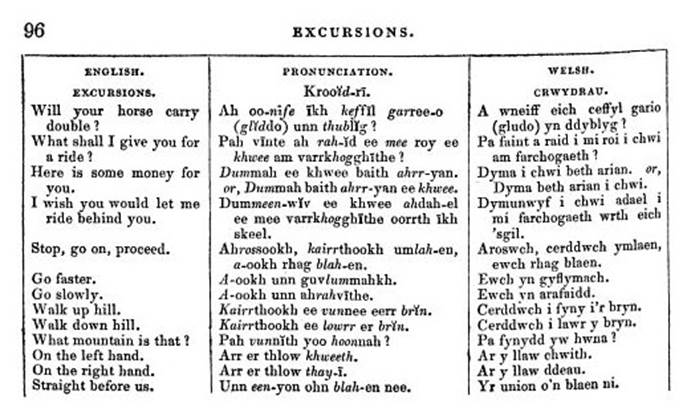
(delwedd J7262)
(tudalen 096)
|
96
EXCURSIONS.
ENGLISH.
EXCURSIONS.
Will your horse carry double?
What shall I give you for a ride?
Here is some money for
you.
I wish you would let me ride behind you.
Stop, go on, proceed.
Go faster.
Go slowly.
Walk up hill .
Walk down hill .
What mountain is that?
On the left hand.
On the right hand.
Straight before us.
|
PRONUNCIATION.
Krooid-ri.
Ah oo-nife ikh keffil garree-o
(gliddo) unn thublĭg?
Pah vinte ah rah-id ee mee roy ee
khwee am varrkhogghithe?
Dummah ee khwee baith ahrr-yan.
or, Dummahbaith ahrr-yan ee khwee.
Dummeen-wiv ee khwee ahdah-el ee mee varrkhogghīthe oorrth ikh skeel.
Ahrossookh, kairrthookh umlah-en,
a-ookh rhag blah-en.
A- ookh unn guvlummahkh.
A- ookh unn ahrahvithe.
Kairrthookh ee vunnee eerr brin.
Kairrthookh ee lowrr er brin.
Pah vunnĭth yoo hoonnah?
Arr er thlow khweeth.
Arr er thlow thay-ī.
Unn een-yon ohn blah- en nee.
|
WELSH.
CRWYDRAU.
A wneiff eich ceffyl gario (gludo) yn ddyblyg?
Pa faint a raid i mi roi i chwi
am farchogaeth?
Dyma i chwi beth arian.
or,
Dyma beth arian i chwi.
Dymunwyf i chwi adael i
mi farchogaeth wrth eich
' sgil.
Aroswch, cerddwch ymlaen,
ewch rhag blaen.
Ewch yn gyflymach.
Ewch yn arafaidd.
Cerddwch i fyny i'r bryn.
Cerddwch i lawr y bryn.
Pa fynydd yw hwna?
Ar y llaw chwith.
Ar y llaw ddeau.
Yr union o'n blaen ni.
|
|
|
|
|
|
|

(delwedd J7263)
(tudalen 097)
|
EXCURSIONS.
97
ENGLISH.
EXCURSIONS .
Is it cold on that mountain?
Will it be cold on the top?
How long shall we be going up?
Must we have a guide to- -?
What shall we give you to direct us to?
What shall I give you to direct me to
I will give one shilling,
two, three, four, five,
six, seven, eight, nine,
ten shillings, if you will go with us to Meet me at Will
you meet
me
at?
|
PRONUNCIATION.
Krootd-ri.
Ah ud-yoo hee unn o-airr arr er munnĭth akkoo (unnah)?
Ah veeth hee unn o-airr arr er pen?
Pah heed er buth-oon nee unn mun- ned ee vunnee?
Ah rah-id ee nee gah-el arrwinĭth ee?
?
Baith rah-id ee nee roy ee khwee am ine kuvvarrwith-o nee ee
Baith rah-id ee mee roy ee khwee am verng huvvarrwith-o ee?
Mee roth-av ee khwee een sooltht,
thy, dree, bedwarr, bimp, khwaikh,
sithe, oo- ĭth, now, thaig-sooltht,
oss a-ookh evvo nee ee
Kuvvarrvuth- ookh vee unn
Ah oonay-ookh khwee verng huv- varrvod ee unn ——?
|
WELSH.
CRWYDRAU.
A ydyw hi yn oer ar y
mynydd acw (yna)?
A fydd hi yn oer ar y pen?
Pa hyd y byddwn ni yn myned i fyny?
A raid i ni gael arweinydd i -?
Beth raid i ni roi i chwi am
ein cyfarwyddo ni i -?
Beth raid i mi roi i chwi am
fy nghyfarwyddo i?
Mi roddaf i chwi un swllt,
ddau, dri, bedwar, bump,
chwech, saith, wyth, naw,
ddeg-swllt, os ewch efo ni i
Cyfarfyddwch fi yn A wnewch chwi fy nghyfar- fod i yn: -?
|
|
|
|
|
|
|

(delwedd J7264)
(tudalen 098)
|
98
ASCENDING MOUNTAINS.- -WITH A GUIDE .
ENGLISH.
EXCURSIONS.
How long shall you be?
I shall be there as soon
as you will.
Stop for me at I will stop for you at
ASCENDING MOUNTAINS.
WITH A GUIDE.
|
PRONUNCIATION.
Krooid-ri.
Pah heed er buth-ookh khwee?
Me vuth-av unno kin-gunted ah khwith-i.
Ahros-sookh amdahnav vee unn —— Mee ahrossav am dahnohkh khwee unn
Essgun-yad Munnuth-oyth.
Ghiddah Hee-forrth- yoorr.
What shall you charge Pah vinte ah goddookh am er deeoorr- for the day?
I will give you
Can you carry provisions?
Where is your knapsack,
wallet?
Shall we want any brandy on the mountain?
nod?
Mee rohv (roth-av ) ee khwee Ah ved-rookh khwee gliddo thlinyithe (arrlooee)?
Unn mhah lay er mah-ee īkh kod- meeloorr, usgreppan?
Ah veeth arrnom ishe-yi paith brandy arr er munnith?
|
WELSH.
CRWYDRAU.
Pa hyd y byddwch chwi?
Mi fyddaf yno cyn-gynted a
chwithau.
Aroswch am danaf fi yn -
Mi arosaf am danoch chwi
yn
ESGYNNIAD MYNYDDOEDD.
GYDA HYFFORDDIWR.
Pa faint a godwch am y
diwrnod?
Mi rof (roddaf) i chwi A fedrwch chwi gludo llun- iaeth (arlwy)?
Yn mha le y mae eich côd- milwr, ysgrepan?
A fydd arnom eisieu peth brandi ar y mynydd?
|
|
|
|
|
|
|

(delwedd J7265)
(tudalen 099)
|
ASCENDING
MOUNTAINS.-WITH A GUIDE. 99
ENGLISH.
ASCENDING MOUNTAINS.
WITH A GUIDE.
Carry some wine, gin,
rum.
Carry some brandy.
Can you carry a bottle of brandy?
Carry some milk.
Carry some water.
Take a mug, a glass.
Take a knife.
knives.
Take
Take some salt, pepper,
vinegar.
Take some bread, meat,
beer.
Pack up these things for me.
|
PRONUNCIATION.
Essgun- yad Munnuth- oyth.
Ghiddah Hee -forrth-yoorr.
Kliddookh baith gween, gin, rum.
Kahrreeookh (kliddookh ) baith brandy.
Ah ved- rookh khwee gahrr-yo kostrel
o vrandy?
Kliddookh baith thlah-eth.
Kliddookh baith doorr.
Kum- Kummairrookh gooppan, weedeerr.
Kummairrookh gulthlelth.
mairrookh gulthlĭlth .
Kummairrookh baith hallen pippeer
gweenaigarr ( vinegar).
Kummairrookh baith bahrah, booĭd,
kooroo.
Subberrn -yookh er peth-ī heen dros- Sov vee. or, Pakyookh er peth-i
heen ee mee.
|
WELSH.
ESGYNNIAD MYNYDDOEDD.
GYDA HYFFORDDIWR.
Cludwch beth gwin, gin,
rym .
Cariwch (cludwch) beth brandi.
A fedrwch chwi gario costrel o frandi?
Cludwch beth llaeth.
Cludwch beth dwr.
Cymmerwch gwpan, wydr.
Cymmerwch gyllell. Cym- merwch gyllill.
Cymmerwch beth halen, pu- pyr, gwinegr (vinegr) .
Cymmerwch beth bara, bwyd,
cwrw .
Sybyrniwch y pethau hyn drosof fi. or, Paciwch y
pethau hyn i mi.
|
|
|
|
|
|
|

(delwedd J7266)
(tudalen 100)
|
100
ASCENDING MOUNTAINS .- WITH A GUIDE.
ENGLISH.
ASCENDING MOUNTAINS.
WITH A GUIDE.
We, I, will start early to-morrow morning.
How far is it to the top?
Must we go far round?
Is the air cold at the top?
Is there snow on the top?
Can I go on horseback?
Must I go on foot?
Can we take the carriage part ofthe way?
Where can we leave the
carriage?
How long shall we be going up?
|
PRONUNCIATION.
Essgun-yad Munnuth-oyth.
Ghiddah Hee-forrth-yoorr.
Nunnee ah own, mee ah ahv, unn vor-ri bor-ri vor-ree.
Pah morr bethled ud-yoo hee eerr pen?
Ah rahid ee nee vunned unn mhelth
o ahmgilkh (o goompass)?
Ah ud-yoo err ow-weerr unn o-airr
unn er pen?
Ah o-ess i-rah arr er pen?
Ah ahthlav vee vunned arr ghevven keffil?
Ah rah- id ee mee gairrthed?
Ah ahthloon mee gummairrid er kairrbid ran o-err forrth?
Unn mhah lay er gahthloon nee ahdah-el er kairrbid?
Pah heed er buth-oon nee unn munned ee vunnee?
|
WELSH.
ESGYNNIAD MYNYDDOEDD.
GYDA HYFFORDDIWR.
Nyni a awn, mi a af, ynforeu boreufory.
Pa mor belled ydyw hi i'r pen?
A raid i ni fyned yn mhell o
amgylch (o gwmpas)?
A ydyw yr awyr yn oer yn y
pen?
A oes eira ar y pen?
A allaf fi fyned ar gefn ceffyl?
A raid i mi gerdded?
A allwn ni gymmeryd y
cerbyd ran o'r ffordd?
Yn mha le y gallwn ni adael y cerbyd?
Pa hyd y byddwn ni yn myned i fyny?
|
|
|
|
|
|
|
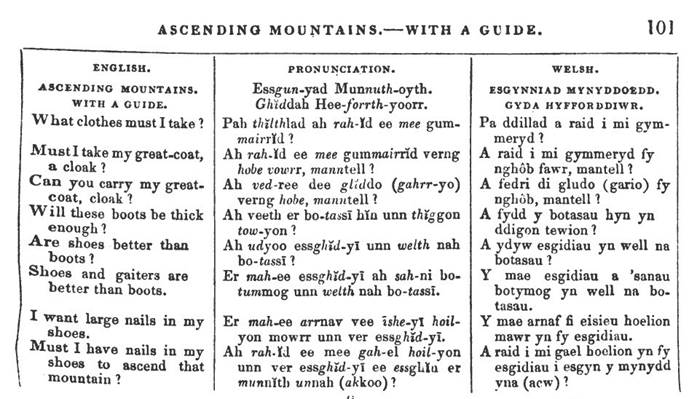
(delwedd J7267)
(tudalen 101)
|
ASCENDING MOUNTAINS.- WITH A GUIDE. 101
ENGLISH.
ASCENDING MOUNTAINS.
WITH A GUIDE.
What clothes must I take?
MustI take mygreat- coat,
a cloak?
Can you carry my greatcoat, cloak?
Will these boots be thick
enough?
Are shoes better than boots?
Shoes and gaiters are better than boots.
I want large nails in my shoes.
Must I have nails in my
shoes to ascend that mountain?
|
PRONUNCIATION.
Essgun-yad Munnuth-oyth.
Ghiddah Hee-forrth- yoorr.
Pah thilthlad ah rah- Id ee mee gummairrid?
Ah rah-id ee mee gummairrid verng hobe vowrr, manntell?
Ah ved - ree dee gliddo (gahrr-yo) |
verng hobe, manntell?
Ah veeth er bo-tassĩ hìn unn thìggon tow-yon?
Ah udyoo essghid-yī unn welth nah bo-tassi?
Er mah-ee essghid-yi ah sah- ni bo- tummog unn welth nah bo-tassī.
Er mah-ee arrnav vee ishe-yi hoil- yon mowrr unn ver essghid-yi.
Ah rah.id ee mee gah-el hoil- yon
unn ver essghid- yi ee essgliin er munnith unnah (akkoo)?
G
|
WELSH.
ESGYNNIAD MYNYDDOEDD.
GYDA HYFFORDDIWR.
Pa ddillad a raid i mi gymmeryd?
A raid i mi gymmeryd fy nghôb fawr, mantell?
A fedri di gludo ( gario) fy nghob, mantell?
A fydd y botasau hyn yn ddigon tewion?
A ydyw esgidiau yn well na botasau?
Y mae esgidiau a ' sanau botymog yn well na bo- tasau.
Y mae arnaf fi eisieu hoelion
mawr yn fy esgidiau.
Araid i mi gael hoelion yn fy esgidiau i esgyn y mynydd
yna (acw)?
|
|
|
|
|
|
|

(delwedd J7268)
(tudalen 102)
|
102
ASCENDING MOUNTAINS .- WITH A GUIDE.
ENGLISH.
ASCENDING MOUNTAINS.
WITH A GUIDE.
Will these shoes stand the weather?
Can we cross the moun- tain with our luggage?
Will a stick with a spike in it be useful?
Getmea stick with aspike in it.
Is the weather too wet to ascend?
Can we ascend, this weather?
Is the ascent difficult,
this weather?
Will the rain stop us?
Can we pass the moun- tain torrent?
|
PRONUNCIATION.
Essgun-yad Munnuth-oyth.
Ghiddah Hee-forrth-yoorr.
Ah oonife err essghid-yī ummah sev- vilth er tow-with?
Ah ahthloon nee groysee er munnĭth ghiddah ine peth-ī?
Ah veeth fonn ah feeg (khether)
unn thevnuth-yol?
Kishe- yookh ee ĭth- ee hee.
mee fonn ah feeg
Ah ud-yoo er tow-with unn rhee ooleeb ee essghin?
Ah ahthloon nee essghin, er tow- with hoon?
Ah udyoo err essgunvah unn an- howth, er tow-with hoon?
Ah oonife err goolow ine rhooisstro?
Ah ahthloon nee vunned hibe-yo ghenthliv er munnĭth?
|
WELSH.
ESGYNNIAD MYNYDDOEDD.
GYDA HYFFORDDIWR.
A wneiff yr esgidiau yma
sefyll y tywydd?
A allwn ni groesi y mynydd gydâ ein pethau?
A fydd ffon a phîg ( chethr)
yn ddefnyddiol?
Ceisiwch i mi ffon a phîg iddi hi.
A ydyw y tywydd yn rhy wlyb i esgyn?
A allwn ni esgyn, y tywydd hwn?
A ydyw yr esgynfa yn an- hawdd, y tywydd hwn?
Awneiff y gwlaw ein rhwys- tro?
A allwn ni fyned heibio
genllify mynydd?
|
|
|
|
|
|
|
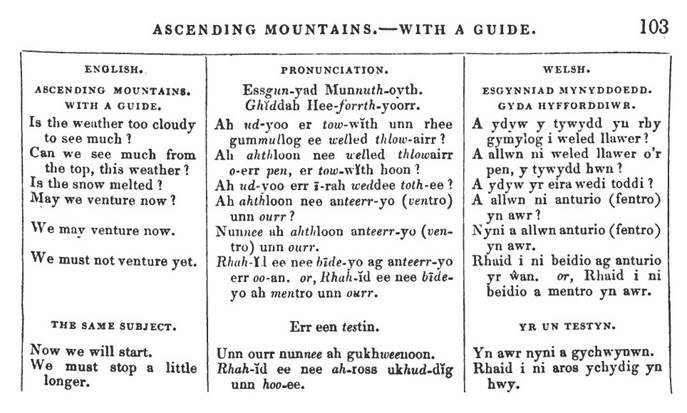
(delwedd J7269)
(tudalen 103)
|
ASCENDING
MOUNTAINS. -WITH A GUIDE. 103
ENGLISH..
ASCENDING MOUNTAINS.
WITH A GUIDE.
Is the weather too cloudy to see much?
Can we see much from
the top, this weather?
Is the snow melted?
May we venture now?
We may venture now.
We must not venture yet.
THE SAME SUBJECT.
Now we will start.
We must stop a little longer.
|
PRONUNCIATION.
Essgun-yad Munnuth- oyth.
Ghiddah Hee-forrth-yoorr.
Ah ud-yoo er tow-with unn rhee gummullog ee welled thlow-airr?
Ah ahthloon nee welled thlowairr
o- err pen, er tow-with hoon?
Ah ud- yoo err 7 - rah weddee toth- ee?
Ah ahthloon nee anteerr- yo ( ventro)
unn ourr?
Nunnee ah ahthloon anteerr-yo (ventro) unn ourr.
Rhah- il ee nee bide-yo ag anteerr-yo err oo - an. or, Rhah-id ee nee bideyo
ah mentro unn ourr.
Err een testin.
Unn ourr nunnee ah gukhweenoon.
Rhah-id ee nee ah-ross ukhud-dig unn hoo-ee.
|
WELSH.
ESGYNNIAD MYNYDDOEDD.
GYDA HYFFORDDIWR.
A ydyw y tywydd yn rhy gymylog i weled llawer?
A allwn ni weled llawer o'r
pen, y tywydd hwn?
A ydyw yr eira wedi toddi?
A allwn ni anturio ( fentro)
yn awr?
Nyni a allwn anturio (fentro)
yn awr.
Rhaid i ni beidio ag anturio yr wan. or, Rhaid i ni beidio a mentro yn awr.
YR UN TESTYN.
Yn awr nyni a gychwynwn.
Rhaid i ni aros ychydig yn hwy.
|
|
|
|
|
|
|

(delwedd J7270)
(tudalen 104)
|
104
ASCENDING MOUNTAINS. WITH A GUIDE.
ENGLISH.
ASCENDING MOUNTAINS.
WITH A GUIDE.
We want more nails in our shoes.
Have you any nails?
Can you put more nails in my shoes?
Lend me a hammer.
Lend me an awl.
We shall slip as we go.
The nails will keep us from falling.
Have you any nails in your pocket?
Will you light a fire?
Can you light a fire?
Where is the wood, peat,
turf?
|
PRONUNCIATION.
Essgun-yad Munnuth-oyth .
Ghiddah Hee-forrth-yoorr.
Er mah-ee arrnom ishe-yi ukhwahneg o hoil-yon unn īne hessghid -yi.
Ah o- ess ganthokh rah-ee hoil -yon?
Ah ved- rookh roy ukhwahueg o hoil- yon unn ver essghid-yi?
Rhowkh venthig moorrthoo-il ee mee.
Rhowkh venthig munnow-with ee mee.
Nunnee ah lith-roon oorrth vunned.
Kedwif err hoil-yon nee rhag serrthyo.
Ah o-ess ghennĭkh rah-ee hoil-yon unn ikh thlowghelth?
Ah oonay-ookh khwee oilī tahn?
Ah ved-rookh khwee olli tahn?
Unn mhah lay er mah-ee er pren-yī,
mown, tow-wi-errkh?
|
WELSH.
ESGYNNIAD MYNYDDOEDD.
GYDA HYFFORDDIWR.
Y mae arnom eisieu ychwaneg ohoelion yn ein hesgidiau.
A oes ganddoch rai hoelion?
A fedrwch roi ychwaneg o
hoelion yn fy esgidiau?
Rhowch fenthyg mwrthwyl i mi.
Rhowch fenthyg mynawyd i
mi.
Nyni a lithrwn wrth fyned.
Cedwiff yr hoelion ni rhag syrthio.
A oes genych rai hoelion yn
eich llawgell?
A wnewch chwi oleu tân?
A fedrwch chwi oleu tân?
Yn mha le y mae y preniau,
mawn, tyweirch?
|
|
|
|
|
|
|
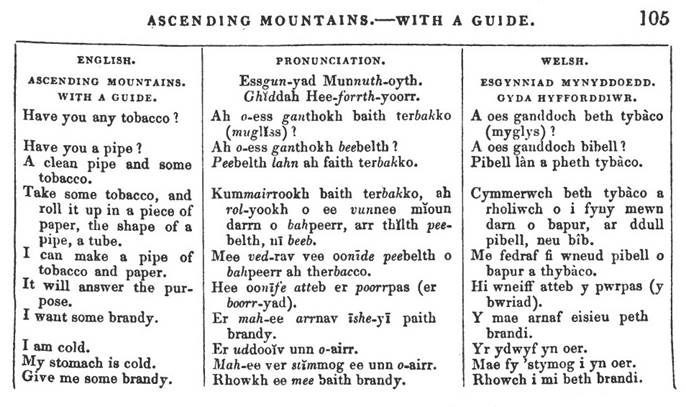
(delwedd J7271)
(tudalen 105)
|
ASCENDING
MOUNTAINS.-WITH GUIDE. 105
ENGLISH.
ASCENDING MOUNTAINS.
WITH A GUIDE.
Have you any tobacco?
Have you a pipe?
A clean pipe and some tobacco.
Take some tobacco, and
roll it up in a piece of
paper, the shape of a
pipe, a tube.
I
can make a pipe of tobacco and paper.
It will answer the purpose.
I want some brandy.
I am cold.
My stomach is cold.
Give me some brandy.
|
PRONUNCIATION.
Essgun-yad Munnuth-oyth.
Ghiddah Hee-forrth-yoorr.
Ah o-ess ganthokh baith terbakko
(mugliss)?
Ah o-ess ganthokh beebelth?
Peebelth lahn ah faith terbakko.
Kummairrookh baith terbakko, ah rol-yookh o ee vunnee mĭoun
darrn o bahpeerr, arr thilth pee- belth, ni beeb.
Mee ved-rav vee oonide peebelth o
bahpeerr ah therbacco.
Hee oonife atteb er poorrpas (er boorr-yad).
Er mah-ee arrnav īshe-yī paith
brandy.
Er uddooiv unn o- airr.
Mah-ee ver stimmog ee unn o-airr.
Rhowkh ee mee baith brandy.
|
WELSH.
ESGYNNIAD MYNYDDOEDD.
GYDA HYFFORDDIWR.
A oes ganddoch beth tybàco
(myglys)?
A oes ganddoch bibell?
Pibell lân a pheth tybaco.
Cymmerwch beth tybàco a
rholiwch o i fyny mewn
darn o bapur, ar ddull pibell, neu bîb.
Me fedraf fi wneud pibell o
bapur a thybaco.
Hi wneiff atteb y pwrpas (y
bwriad).
Y mae arnaf eisieu peth brandi.
Yr ydwyf yn oer.
Mae fy ' stymog i yn oer.
Rhowch i mi beth brandi .
|
|
|
|
|
|
|
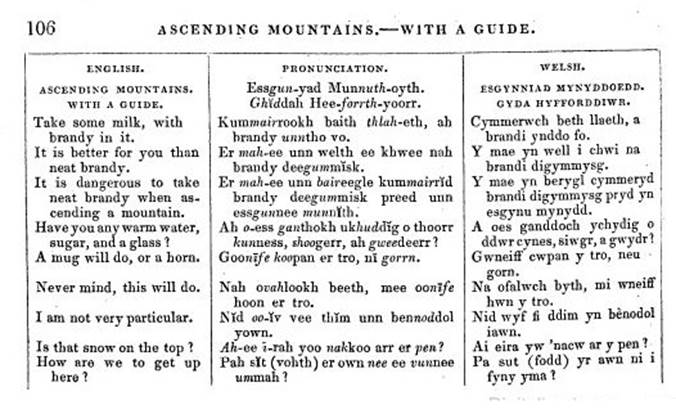
(delwedd J7272)
(tudalen 106)
|
106
ASCENDING MOUNTAINS. -WITH A GUIDE .
ENGLISH.
ASCENDING MOUNTAINS.
WITH A GUIDE.
Take some milk, with brandy in it.
It is better for you than
neat brandy.
It is dangerous to take neat brandy when as- cending a mountain .
Have you any warm water,
sugar, anda glass?
A mug will do, or a horn.
Never mind, this will do.
I am not very particular.
Is that snow on the top?
How are we to get up here?
|
PRONUNCIATION.
Essgun-yad Munnuth-oyth .
Ghiddah Hee-forrth-yoorr.
Kummairrookh baith thlah- eth, ah brandy unntho vo.
Er mah- ee unn welth ee khwee nah
brandy deegummisk.
Er mah-ee unn baireegle kummairrid
brandy deegummisk preed unn essgunnee munnĭth .
Ah o-ess ganthokh ukhuddig o thoorr kunness, shoogerr, ah gweedeerr?
Goonife koopan er tro, ni gorrn.
Nah ovahlookh beeth, mee oonife hoon er tro.
Nid oo-iv vee thim unn bennoddol
yown.
Ah-ee i -rah yoo nakkoo arr er pen?
Pah sit (vohth) er own nee ee vunnee ummah?
|
WELSH.
ESGYNNIAD MYNYDDOEDD.
GYDA HYFFORDDIWR.
Cymmerwch beth llaeth, a
brandi ynddo fo.
Y mae yn well i chwi na brandi digymmysg.
Y mae yn berygl cymmeryd brandi digymmysg pryd yn esgynu mynydd.
A oes ganddoch ychydig o
ddwr cynes, siwgr, a gwydr?
Gwneiff cwpan y tro, neu gorn.
Na ofalwch byth, mi wneiff hwn y tro.
Nid wyf fi ddim yn benodol iawn.
Ai eira yw ' nacw ar y pen?
Pa sut (fodd) yr awn ni i
fyny yma?
|
|
|
|
|
|
|
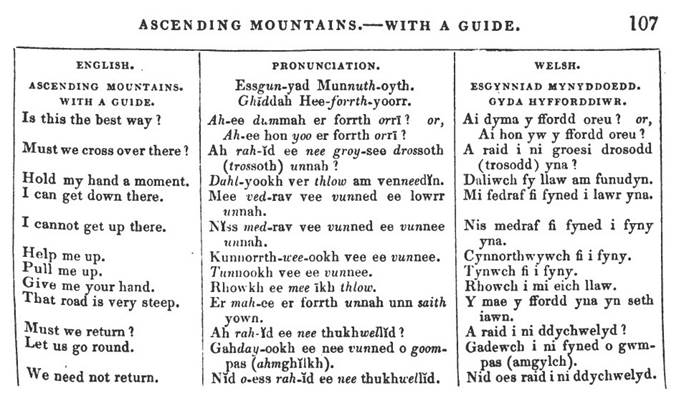
(delwedd J7273)
(tudalen 107)
|
ASCENDING
MOUNTAINS.- WITH A GUIDE. 107
ENGLISH.
ASCENDING MOUNTAINS.
WITH A GUIDE.
Is this the best way?
Must we cross over there?
Hold my hand a moment.
I can get down there.
I cannot get up there.
Help me up.
Pull me up.
Give me your hand.
That road is very steep.
Must we return?
Let us go round.
We need not return.
|
PRONUNCIATION.
Essgun-yad Munnuth- oyth.
Ghiddah Hee-forrth-yoorr.
Ah-ee dummah er forrth orrī? or,
Ah- ee hon yoo er forrth orri?
Ah rah-id ee nee groy-see drossoth (trossoth) unnah?
Dahl-yookh ver thlow am venneedin.
Mee ved-rav vee vunned ee lowrr unnah.
Niss med-rav vee vunned ee vunnee unnah.
Kunnorrth-wee-ookh vee ee vunnee.
Tunnookh vee ee vunnee.
Rhowkh ee mee ikh thlow.
Er mah-ee er forrth unnah unn saith
yown.
Ah rah- id ee nee thukhwellĭd?
Gahday-ookh ee nee vunned o goompas (ahmghilkh).
Nid o-ess rah-id ee nee thukhwellid .
|
WELSH.
ESGYNNIAD MYNYDDOEDD.
GYDA HYFFORDDIWR.
Ai dyma y ffordd oreu? or,
Ai hon yw y ffordd oreu?
A raid i ni groesi drosodd
(trosodd) yna?
Daliwch fy llaw am funudyn.
Mi fedraf fi fyned i lawr yna.
Nis medraf fi fyned i fyny
yna.
Cynnorthwywch fi i fyny.
Tynwch fi i fyny.
Rhowch i mi eich llaw.
Y mae y ffordd yna yn seth iawn.
A raid i ni ddychwelyd?
Gadewch i ni fyned o gwmpas (amgylch).
Nid oes raid i ni ddychwelyd.
|
|
|
|
|
|
|
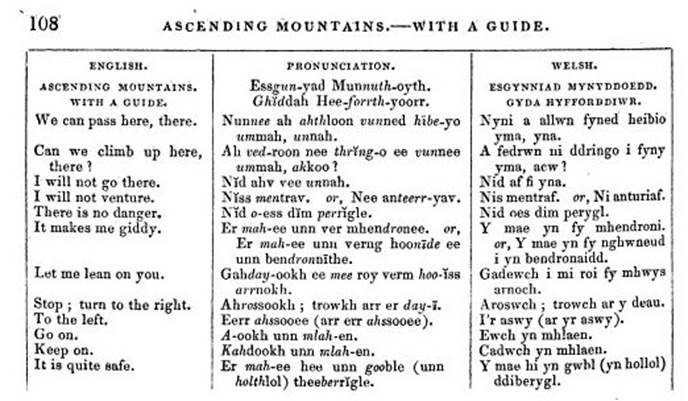
(delwedd J7274)
(tudalen 108)
|
108
ASCENDING MOUNTAINS.- -WITH A GUIDE.
ENGLISH .
ASCENDING MOUNTAINS.
WITH A GUIDE.
We can pass here, there.
Can we climb up here,
there?
I will not go there.
I will not venture.
There is no danger.
It makes me giddy.
Let me lean on you.
Stop; turn to the right.
To the left.
Go on.
Keep on.
It is quite safe.
|
PRONUNCIATION.
Essgun-yad Munnuth-oyth.
Ghiddah Hee-forrth-yoorr.
Nunnee ah ahthloon vunned hibe-yo ummah, unnah.
Ah ved-roon nee thring-o ee vunneė
ummah, akkoo?
Nĭd ahv vee unnah.
Niss mentrav. or, Nee anteerr-yav.
Nid o- ess dim perrigle.
Er mah-ee unn ver mhendronee. or,
Er mah- ee unn verng hoonide ee unn bendronnithe.
Gahday- ookh ee mee roy verm hoo-iss arrnokh .
Ahrossookh; trowkh arr er day-i.
Eerr ahssooee (arr err ahssooee) .
A-ookh unn mlah-en.
Kahdookh unn mlah-en.
Er mah- ee hee unn gooble (unn
holthlol) theeberrigle.
|
WELSH.
ESGYNNIAD MYNYDDOEDD.
GYDA HYFFORDDIWR.
Nyni a allwn fyned heibio yma, yna.
A fedrwn ni ddringo i fyny
yma, acw?
Nid affi yna.
Nis mentraf. or, Ni anturiaf.
Nid oes dim perygl.
Y mae yn fy mhendroni.
or, Y mae yn fy nghwneud i yn bendronaidd .
Gadewch i mi roi fy mhwys arnoch .
Aroswch; trowch ar y
I'r aswy (ar yr aswy).
Ewch yn mhlaen.
Cadwch yn mhlaen.
deau.
Ymae hi yn gwbl (yn hollol)
ddiberygl.
|
|
|
|
|
|
|
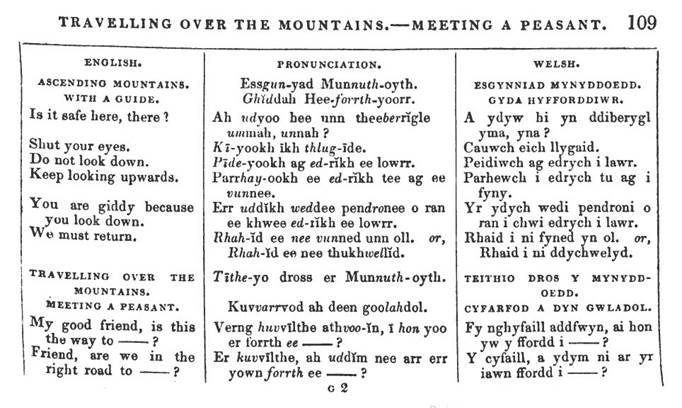
(delwedd J7275)
(tudalen 109)
|
TRAVELLING
OVER THE MOUNTAINS.- MEETING A PEASANT. 109
ENGLISH.
ASCENDING MOUNTAINS.
WITH A GUIDE.
Is it safe here, there?
Shut your eyes.
Do not look down.
Keep looking upwards.
You are giddy because
you look down.
We must return.
TRAVELLING OVER THE MOUNTAINS.
MEETING A PEASANT.
My good friend, is this the way to Friend, are
right road to
?
we in the?
|
PRONUNCIATION.
Essgun-yad Munnuth-oyth .
Ghiddah Hee-forrth-yoorr.
Ah udyoo hee unn theeberrigle ummah, unnah?
Ki-yookh ikh thlug- īde.
Pide-yookh ag ed- rikh ee lowrr.
Parrhay- ookh ee ed-rikh tee ag ee vunnee.
Err uddikh weddee pendronee o ran ee khwee ed- rikh ee lowrr.
Rhah-id ee nee vunned unn oll. or,
Rhah-id ee nee thukhwellid.
Tithe-yo dross er Munnuth - oyth.
Kuvvarrvod ah deen goolahdol.
Verng huvvilthe athvoo- in, i hon yoo er forrth ee — .?
Er kuvvilthe, ah uddĭm nee arr err yownforrth ee?
i?
G 2
|
WELSH.
ESGYNNIAD MYNYDDOEDD.
GYDA HYFFORDDIWR.
A ydyw hi yn ddiberygl yma, yna?
Cauwch eich llygaid.
Peidiwch ag edrych i lawr.
Parhewch i edrych tu ag i
fyny.
Yr ydych wedi pendroni o
ran i chwi edrych i lawr.
Rhaid i ni fyned yn ol.
Rhaid i ni ddychwelyd.
or,
TEITHIO DROS Y MYNYDD- OEDD.
CYFARFOD A DYN GWLADOL.
?
Fy nghyfaill addfwyn, ai hon yw y ffordd i
Y cyfaill, a ydym ni ar yr iawn ffordd
|
|
|
|
|
|
|
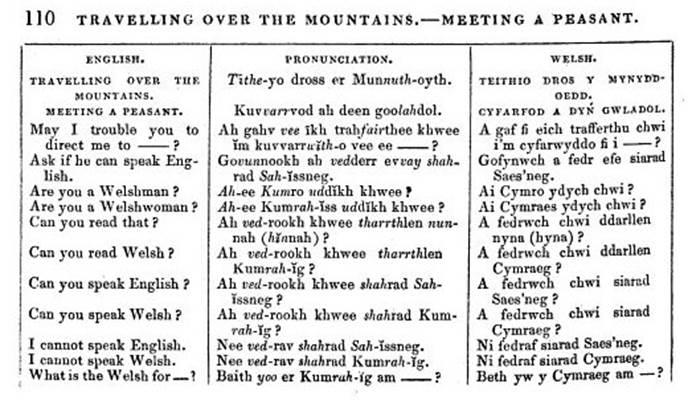
(delwedd J7276)
(tudalen 110)
|
110
TRAVELLING OVER THE MOUNTAINS. -MEETING A PEASANT.
ENGLISH.
TRAVELLING OVER THE
MOUNTAINS.
MEETING A PEASANT.
-?
May I trouble you to direct me to
Ask if he can speak Eng- lish .
Are you a Welshman?
Are you a Welshwoman?
Can you read that?
Can you read Welsh?
Can you speak English?
Can you speak Welsh?
I cannot speak English .
I cannot speak Welsh.
Whatis the Welsh for-?
|
PRONUNCIATION.
Kuvvarrvod ah deen goolahdol .
Ah gahv vee ikh trahfairthee khwee im kuvvarruĭth- o vee ee -?
Govunnookh ah vedderr evvay shah- rad Sah-issneg.
Ah-ee Kumro uddikh khwee?
Ah- ee Kumrah-iss uddĭkh khwee?
Ah ved-rookh khwee tharrthlen nunnah (hinnah)?
Ah ved-rookh khwee tharrthlen
Kumrah-ig?
Ah ved-rookh khwee shahrad SahIssneg?
Ah ved-rookh khwee shahrad Kumrah-ig?
Nee ved-rav shahrad Sah-issneg.
Nee ved- rav shahrad Kumrah-ig.
Baith yoo er Kumrah- ig am
|
WELSH.
Tithe-yo dross er Munnuth-oyth. TEITHIO DROS Y MYNYDD OEDD.
CYFARFOD A DYN GWLADOL.
A gaf fi eich trafferthu chwi
i'm cyfarwyddo fi i?
Gofynwch a fedr efe siarad Saes'neg.
Ai Cymro ydych chwi?
Ai Cymraes ydych chwi?
A fedrwch chwi ddarllen
nyna (hyna)?
A fedrwch chwi ddarllen
Cymraeg?
A fedrwch chwi siarad Saes'neg?
A fedrwch chwi siarad
Cymraeg?
Ni fedraf siarad Saes'neg.
Ni fedraf siarad Cymraeg.
Beth yw y Cymraeg am?
|
|
|
|
|
|
|
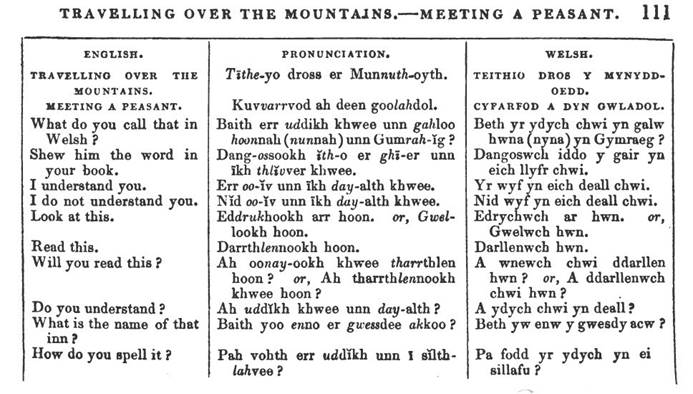
(delwedd J7277)
(tudalen 111)
|
TRAVELLING
OVER THE MOUNTAINS. MEETING A PEASANT. 111
ENGLISH.
TRAVELLING OVER THE MOUNTAINS.
MEETING A PEASANT.
What do you call that in Welsh?
Shew him the word in
your book.
I understand you.
I do not understand you.
Look at this .
Read this.
Will you read this?
Do you understand?
What is the name of that inn?
How do you spell it?
|
PRONUNCIATION.
Tithe-yo dross er Munnuth-oyth.
Kuvvarrvod ah deen goolahdol.
Baith err uddikh khwee unn gahloo hoonnah (nunnah) unn Gumrah- ig?
Dang- ossookh ith- o er ghi -er unn ikh thlivver khwee.
Err 00 -ĭv unn ikh day-alth khwee.
Nid oo-iv unn ikh day- alth khwee.
Eddrukhookh arr hoon.
lookh hoon.
Darrthlennookh hoon.
or, GwelAh oonay- ookh khwee tharrthlen hoon? or, Ah tharrthlennookh
khwee hoon?
Ah uddĭkh khwee unn day-alth?
Baith yoo enno er gwessdee akkoo?
Pah vohth err uddikh unn i sĭlth- lahvee?
|
WELSH.
TEITHIO DROS Y MYNYDD- OEDD.
CYFARFOD A DYN GWLADOL.
Beth yr ydych chwi yn galw hwna(nyna) yn Gymraeg?
Dangoswch iddo y gair yn eich llyfr chwi.
Yr wyf yn eich deall chwi.
Nid wyf yn eich deall chwi.
Edrychwch ar hwn. or,
Gwelwch hwn.
Darllenwch hwn.
A wnewch chwi ddarllen hwn? or, A ddarllenwch chwi hwn?
A ydych chwi yn deall?
Beth yw enw ygwesdy acw?
Pa fodd yr ydych yn ei sillafu?
|
|
|
|
|
|
|
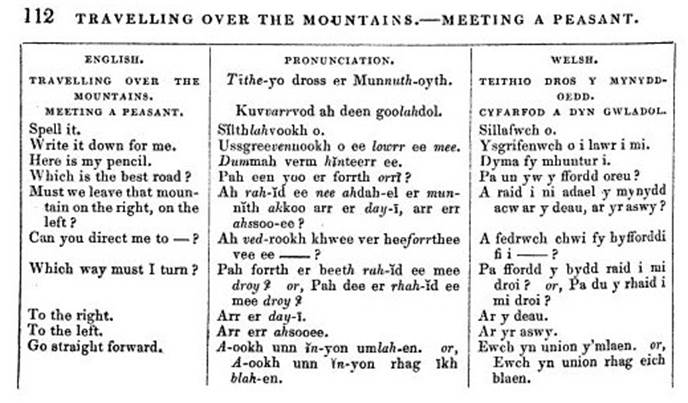
(delwedd J7278)
(tudalen 112)
|
112
TRAVELLING OVER THE MOUNTAINS.- MEETING A PEASANT.
ENGLISH.
TRAVELLING OVER THE MOUNTAINS.
MEETING A PEASANT.
Spell it.
Write it down for me.
Here is my pencil.
Which is the best road?
Must we leave that mountain onthe right, onthe left?
Can you direct me to?
Which way must I turn?
To the right.
To the left.
Go straight forward.
|
PRONUNCIATION.
Tithe-yo dross er Munnuth-oyth.
Kuvvarrvod ah deen goolahdol.
Silthlahvookh o.
Ussgreevennookh o ee lowrr ee mee.
Dummah verm hinteerr ee.
Pah een yoo er forrth orrì?
Ah rah-id ee nee ahdah-el er munnĭth akkoo arr er day-1, arr err
ahssoo-ee?
Ah ved-rookh khwee ver heeforrthee vee ee-?
Pah forrth er beeth rah-id ee mee droy? or, Pah dee er rhah-id ee
mee droy?
Arr er day- 1.
Arr err ahsooee.
A-ookh unn in-yon umlah-en. or,
A-ookh unnin-yon rhag ikh blah-en.
|
WELSH.
TEITHIO DROS Y
OEDD.
MYNYDDCYFARFOD A DYN GWLADOL.
Sillafwch o.
Ysgrifenwch o i lawr i mi.
Dyma fy mhuntur i.
Pa un yw y ffordd oreu?
A raid i ni adael y mynydd
acw ar y deau, ar yr aswy?
A fedrwch chwi fy hyfforddi fi i?
Pa ffordd y bydd raid i mi droi? or, Pa du y rhaid i
mi droi?
Ary deau.
Ar yr aswy.
Ewch yn union y'mlaen. or,
Ewch yn union rhag eich blaen.
|
|
|
|
|
|
|
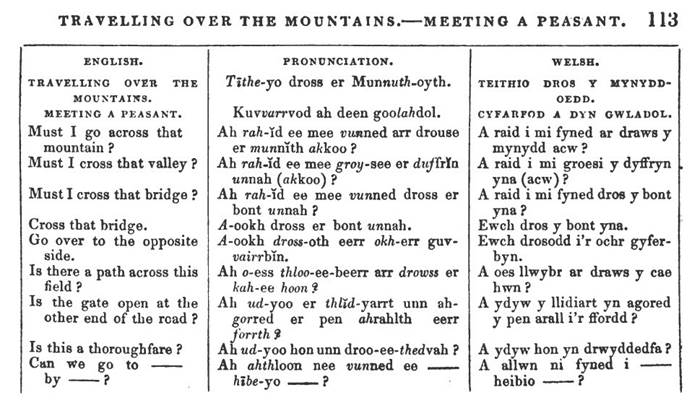
(delwedd J7279)
(tudalen 113)
|
TRAVELLING
OVER THE MOUNTAINS. - MEETING A PEASANT. 113
ENGLISH.
TRAVELLING OVER THE MOUNTAINS.
MEETING A PEASANT.
Must I go across that mountain?
Must I cross that valley?
Must I cross that bridge?
Cross that bridge.
Go over to the opposite side.
Is there a path across this field?
Is the gate open at the other end of the road?
Is this a thoroughfare?
Can we go to
by -?
|
PRONUNCIATION.
Tithe-yo dross er Munnuth-oyth.
Kuvvarrvod ah deen goolahdol.
Ah rah- ĭd ee mee vunned arr drouse er munnĭth akkoo?
Ah rah-id ee mee groy- see er duffrin unnah (akkoo)?
Ah rah-id ee mee vunned dross er bont unnah?
A- ookh dross er bont unnah.
A- ookh dross- oth eerr okh-err guv- vairrbin.
Ah o- ess thloo- ee-beerr arr drowss er kah-ee hoon?
Ah ud-yoo er thlid- yarrt unn ah- gorred er pen ahrahlth eerr
forrth?
Ahud-yoo hon unn droo- ee- thedvah?
Ah ahthloon nee vunned ee
hibe-yo?
|
WELSH.
TEITHIO DROS Y MYNYDD- OEDD.
CYFARFOD A DYN GWLADOL.
A raid i mi fyned ar draws y
mynydd acw?
A raid i mi groesi y dyffryn yna (acw)?
A raid i mi fyned dros y bont yna?
Ewch dros y bont yna.
Ewch drosodd i'r ochr gyfer- byn.
A oes llwybr ar draws y cae hwn?
A ydyw y llidiart yn agored y pen arall i'r ffordd?
A ydyw hon yn drwyddedfa?
A allwn ni fyned i
heibio?
|
|
|
|
|
|
|
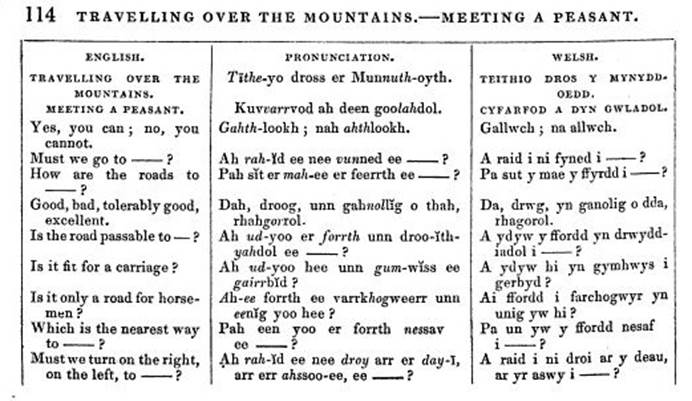
(delwedd J7280)
(tudalen 114)
|
114
TRAVELLING OVER THE MOUNTAINS. -MEETING A PEASANT.
ENGLISH.
TRAVELLING OVER THE MOUNTAINS.
MEETING A PEASANT.
Yes, you can; no, you cannot.
Must we go to -?
How are the roads to?
Good, bad, tolerably good,
excellent.
Is the road passable to
Is it fit for a carriage?
-?
Is it only a road for horse- men?
Which is the nearest way
to?
Must we turn on the right,
on the left, to?
|
PRONUNCIATION.
Tithe-yo dross er Munnuth- oyth.
Kuvvarrvod ah deen goolahdol .
Gahth-lookh; nah ahthlookh.
Ah rah-id ee nee vunned ee Pah sit er mah-ee er feerrth ee?Dah, droog, unn
gahnollig o thah,
rhahgorrol.
Ah ud-yoo er forrth unn droo-ĭth- yahdol ee?
Ah ud-yoo hee unn gum- wĭss ee gairrbid?
Ah- ee forrth ee varrkhogweerr unn eenig yoo hee?
Pah een yoo er forrth nessav eeAh rah-ĭd ee nee droy arr er day-1,
arr err ahssoo- ee, ee —?
-?
|
WELSH.
TEITHIO DROS Y MYNYDD.
OEDD.
CYFARFOD A DYN GWLADOL.
Gallwch; na allwch.
A raid i ni fyned i?
? Pa sut ymae y ffyrdd i Da, drwg, yn ganolig o dda,
rhagorol.
A ydyw y ffordd yn drwydd- iadol i?
A ydyw hi yn gymhwys i
gerbyd?
Ai ffordd i farchogwyr yn unig yw hi?
Pa un yw y ffordd nesaf i -?
A raid i ni droi ar y deau,
ar yr aswy i -?
|
|
|
|
|
|
|
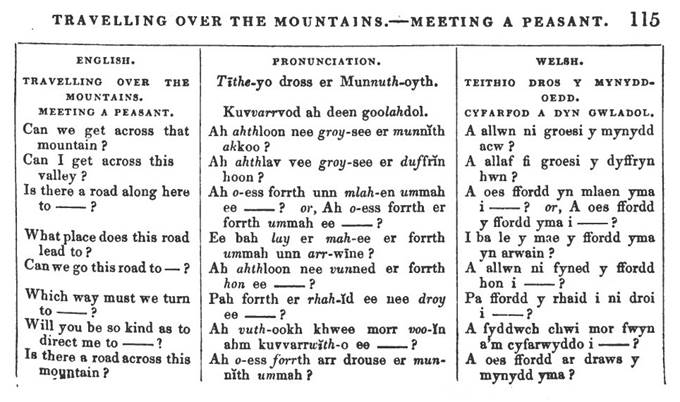
(delwedd J7281)
(tudalen 115)
|
TRAVELLING
OVER THE MOUNTAINS.- -MEETING A PEASANT. 115
ENGLISH.
TRAVELLING OVER THE MOUNTAINS.
MEETING A PEASANT .
Can we get across that mountain?
Can I get across this
valley?
Is there a road along here to?
What place does this road lead to?
Canwe go this road to?
Which way must we turn to- -?
Will you be so kind as to direct me to?
Is there a road across this
mountain?
|
PRONUNCIATION.
Tithe-yo dross er Munnuth-oyth.
Kuvvarrvod ah deen goolahdol.
Ah ahthloon nee groy- see er munnĭth akkoo?
Ah ahthlav vee groy- see er duffrin hoon?
Ah o-ess forrth unn mlah- en ummah
? or, Ah o-ess forrth er forrth ummah ee ее
?
Ee bah lay er mah- ee er forrth ummah unn arr- wine?
Ah ahthloon nee vunned er forrth hon ee?
|
|
WELSH.
TEITHIO DROS Y
|
|
|
|
|
|
|
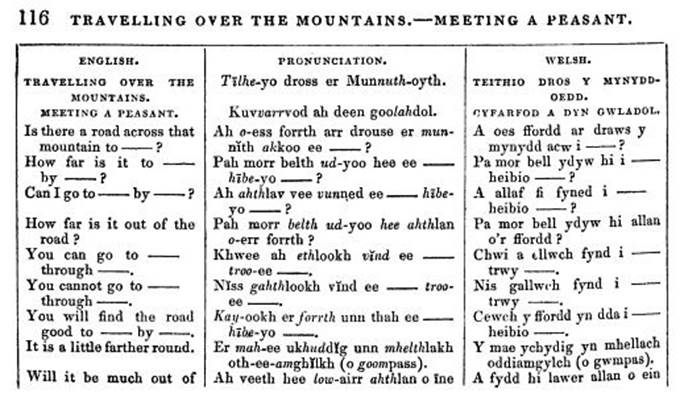
(delwedd J7282)
(tudalen 116)
|
116
TRAVELLING OVER THE MOUNTAINS.- -MEETING A PEASANT.
ENGLISH.
TRAVELLING OVER THE MOUNTAINS.
MEETING A PEASANT.
Is there a road across that mountain to How far is it to?
by -?
Can I goto by -?
How far is it out of the road?
You can go to
through You cannot go to
through You will find the road
good to by It is a little farther round.
|
PRONUNCIATION.
Tilhe-yo dross er Munnuth-oyth.
Kuvvarrvod ah deen goolahdol.
Ah o-ess forrth arr drouse er mun- nĭth akkoo ee?
Pah morr belth ud-yoo hee ee hibe-yo?
Ah ahthlav vee vunned ee
yo?
hibePah morr belth ud-yoo hee ahthlan o-err forrth?
Khwee ah ethlookh vind ee troo- eeNiss gahthlookh vind ee —
ee
Kay-ookh er forrth unn thah ee hibe-yo
trooEr mah-ee ukhuddig unn mhelthlakh
oth-ee-amghilkh (o goompass) .
Will it be much out of Ah veeth hee low- airr ahthlan o ine
|
WELSH.
TEITHIO DROS Y MYNYDD- OEDD.
CYFARFOD A DYN GWLADOL.
A oes ffordd ar draws y
mynydd acw i -?
Pa mor bell ydyw hi i
heibio
A allaf fi fyned i
heibio .?
Pa mor bell ydyw hi allan o'r ffordd?
Chwi a ellwch fynd i
trwy Nis gallwch fynd i
trwy Cewch y ffordd yn dda i
heibio
Y mae ychydig yn mhellach oddiamgylch (o gwmpas).
A fydd hi lawer allan o ein
|
|
|
|
|
|
|
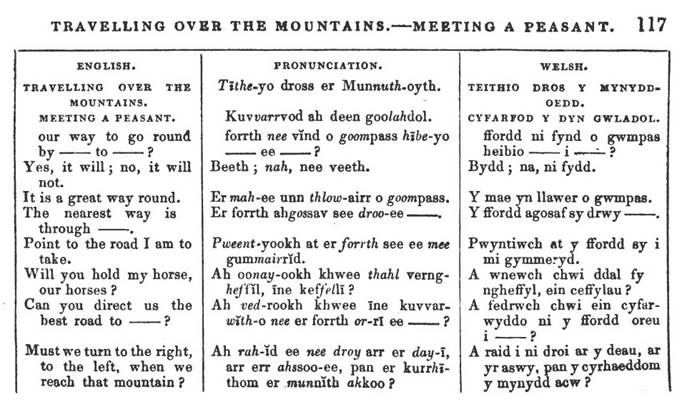
(delwedd J7283)
(tudalen 117)
|
TRAVELLING
OVER THE MOUNTAINS. -MEETING A PEASANT. 117
ENGLISH.
TRAVELLING OVER THE
MOUNTAINS.
MEETING A PEASANT.
our way to go round by to ·?
Yes, it will; no, it will not.
It is a great way round.
The nearest way is
through Point to the road I am to take.
Will you hold my horse,
our horses?
Can you direct us the best road to?
Must weturn to the right,
to the left, when we reach that mountain?
|
PRONUNCIATION.
Tithe-yo dross er Munnuth- oyth.
Kuvvarrvod ah deen goolahdol .
forrth nee vind o goompass hibe-yo ee?
Beeth; nah, nee veeth.
Er mah-ee unn thlow-airr o goompass.
Er forrth ahgossav see droo- ee
Pweent-yookh at er forrth see ee mee gummairrid.
Ah oonay- ookh khwee thahl verngheffil, ine keffelli?
Ah ved-rookh khwee ine kuvvar- with-o nee er forrth or-rī ee -?
Ah rah-ĭd ee nee droy arr er day- ī,
arr err ahssoo- ee, pan er kurrhi- thom er munnith akkoo?
|
WELSH.
TEITHIO DROS Y MYNYDD- OEDD.
CYFARFOD Y DYN GWLADOL.
ffordd ni fynd o gwmpas heibio i
Bydd; na, ni fydd.
?
Y mae yn llawer o gwmpas.
Y ffordd agosaf sy drwy
sy Pwyntiwch at y ffordd i
mi gymmeryd.
A wnewch chwi ddal fy ngheffyl, ein ceffylau?
A fedrwch chwi ein cyfar- wyddo ni y ffordd oreu i-?
A raid i ni droi ar y deau, ar yr aswy, pan y cyrhaeddom
y mynydd acw?
|
|
|
|
|
|
|
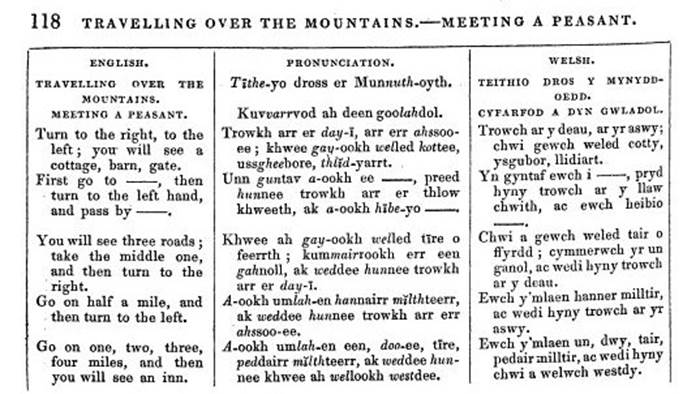
(delwedd J7284)
(tudalen 118)
|
118
TRAVELLING OVER THE MOUNTAINS. MEETING A PEASANT.
ENGLISH.
TRAVELLING OVER THE MOUNTAINS.
MEETING A PEASANT.
Turn to the right, to the left; you will see a
cottage, barn, gate.
First go to then turn to the left hand,
and pass by
You will see three roads;
take the middle one,
and then turn to the
right.
Go on half a mile, and then turn to the left.
Go on one, two, three,
four miles, and then you will see an inn.
|
PRONUNCIATION.
Tithe-yo dross er Munnuth-oyth.
Kuvvarrvod ah deen goolahdol.
Trowkh arr er day-ī, arr err ahssooee; khwee gay- ookh welled kottee,
ussgheebore, third-yarrt.
Unn guntav a- ookh ee preed hunnee trowkh arr er thlow
khweeth, ak a - ookh hibe-yo
een Khwee ah gay- ookh welled tīre o
feerrth; kummairrookh err gahnoll, ak weddee hunnee trowkh
arr er day-ī.
A-ookh umlah-en hannairr milthteerr,
ak weddee hunnee trowkh arr err ahssoo-ee.
A-ookh umlah-en een, doo-ee, tīre,
peddairr milthteerr, ak weddee hun- nee khwee ah wellookh westdee.
|
WELSH.
TEITHIO DROS Y
OEDD.
MYNYDDCYFARFOD A DYN GWLADOL.
Trowch ar y deau, ar yr aswy;
chwi gewch weled cotty,
ysgubor, llidiart.
Yn gyntaf ewch i pryd llaw hyny trowch ar y
chwith, ac ewch heibio
Chwi a gewch weled tair o
ffyrdd; cymmerwch yr un ganol, ac wedi hyny trowch ar y deau.
Ewch y'mlaen hanner milltir,
ac wedi hyny trowch ar yr
aswy.
Ewch ymlaen un, dwy, tair,
pedair milltir, ac wedi hyny chwi a welwch westdy.
|
|
|
|
|
|
|
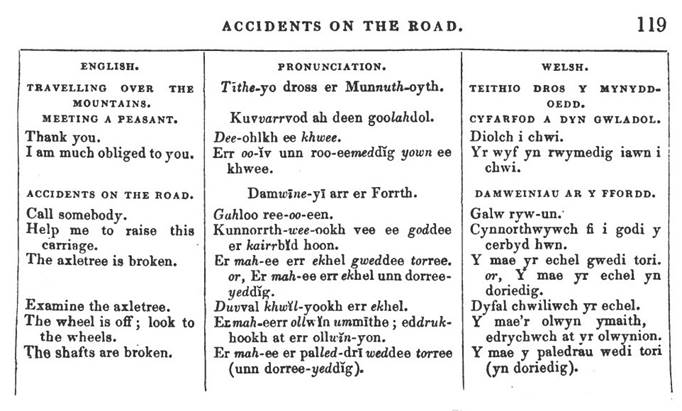
(delwedd J7285)
(tudalen 119)
|
ACCIDENTS
ON THE ROAD. 119
ENGLISH.
TRAVELLING OVER THE
MOUNTAINS.
MEETING A PEASANT.
Thank you.
I am much obliged to you.
ACCIDENTS ON THE ROAD.
to raise this Call somebody.
Help me
carriage.
The axletree is broken.
Examine the axletree.
The wheel is off; look to the wheels.
The shafts are broken.
(unn dorree- yeddig).
|
PRONUNCIATION.
Tithe-yo dross er Munnuth-oyth.
Kuvvarrvod ah deen goolahdol.
Dee-ohlkh ee khwee.
Err 00-Ĭv unn roo- eemeddig yown ee khwee.
Damwine-yi arr er Forrth.
Gahloo ree- oo- een.
Kunnorrth- wee - ookh vee ee goddee er kairrbid hoon.
Er mah- ee err ekhel gweddee torree.
or, Er mah- ee err ekhel unn dorreeyeddig.
Duvval khwil-yookh err ekhel.
Ermah-eerr ollwin ummithe; eddruk- hookh at err ollwin- yon.
Er mah-ee er palled - drī weddee torree
|
WELSH.
TEITHIO DROS Y MYNYDD- OEDD.
CYFARFOD A DYN GWLADOL.
Diolch i chwi.
Yr wyf yn rwymedig iawn i
chwi.
DAMWEINIAU AR Y FFORDD.
Galw ryw-un."
Cynnorthwywch fi i godi y
cerbyd hwn.
Y mae yr echel gwedi tori.
or, Y mae yr echel yn doriedig.
Dyfal chwiliwch yr echel.
Y mae'r olwyn ymaith,
edrychwch at yr olwynion.
Y mae y paledrau wedi tori
(yn doriedig).
|
|
|
|
|
|
|
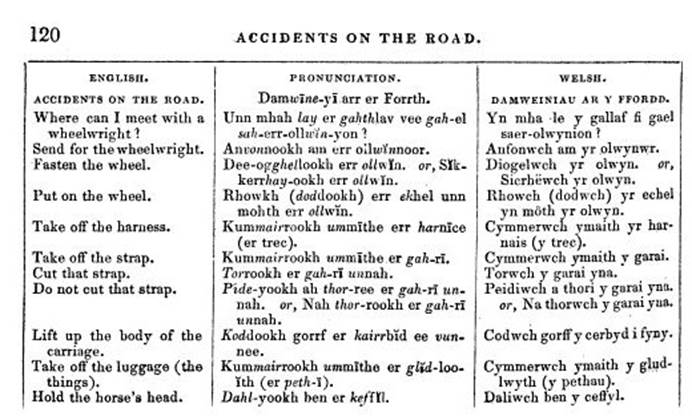
(delwedd J7286)
(tudalen 120)
|
120
ACCIDENTS ON THE ROAD.
ENGLISH.
ACCIDENTS ON THE ROAD.
Where can I meet with a
wheelwright?
Send for the wheelwright.
Fasten the wheel.
Put on the wheel.
Take off the harness.
Take off the strap.
Cut that strap.
Do not cut that strap.
the body of the Lift up
carriage.
Take off the luggage (the things).
Hold the horse's head.
|
PRONUNCIATION.
Damwine-yī arr er Forrth.
Unn mhah lay er gahthlav vee gah- el sah-err-ollwin-yon?
Anvonnookh am err ollwinnoor.
Dee-ogghellookh err ollwin. or, Sik- kerrhay-ookh err ollwin.
Rhowkh (doddookh) err ekhel unn mohth err ollwin.
Kummairrookh ummīthe err harnice
(er trec).
Kummairrookh ummīthe er gah-rī.
Torrookh er guh-rī unnah.
Pide-yookh ah thor-ree er gah-rī un- nah. or, Nah thor- rookh er
gah-rī unnah .
Koddookh gorrf er kairrbid ee vun- nee.
Kummairrookh ummithe er glid-loo- ĭth (er peth-ī).
Dahl-yookh ben er keffɣl.
|
WELSH.
DAMWEINIAU AR Y FFORDD.
or,
Yn mha le y gallaf fi gael saer-olwynion?
Anfonwch am yr olwynwr.
Diogelwch yr olwyn.
Sicrhewch yr olwyn.
Rhowch (dodwch) yr echel
yn môth yr olwyn.
Cymmerwch ymaith yr harnais (y trec).
Cymmerwch ymaith y garai.
Torwch y garai yna.
Peidiwch a thori y garai yna.
or, Nathorwch y garai yna.
Codwch gorff y cerbyd i fyny.
Cymmerwch ymaith y glud- lwyth (y pethau).
Daliwch ben y ceffyl.
|
|
|
|
|
|
|
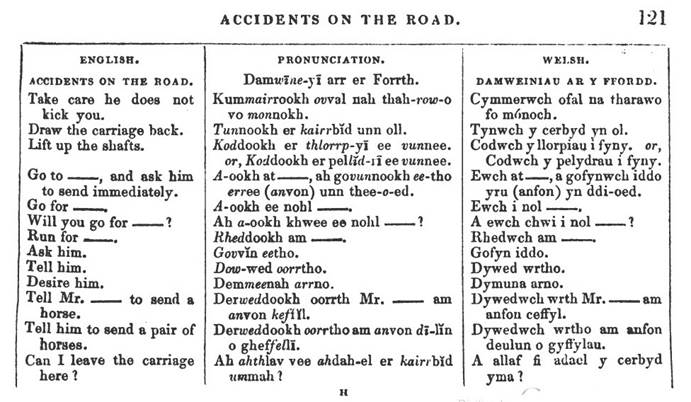
(delwedd J7287)
(tudalen 121)
|
ACCIDENTS
ON THE ROAD. 121
ENGLISH.
ACCIDENTS ON THE ROAD.
Take care he does not kick you.
Draw the carriage back.
Lift up the shafts.
Goto
and ask him to send immediately.
Go for -
Will you go for Run for
|
PRONUNCIATION.
Damwine-yi arr er Forrth.
Kummairrookh ovval nah thah- row-o
vo monnokh.
Tunnookh er kairrbĭd unn oll.
Koddookh er thlorrp- yi ee vunnee.
or, Koddookh er pellid -rī ee vunnee.
A-ookh at. ah govunnookh ee-tho
erree (anvon) unn thee-o-ed .
A-ookh ee nobl
Ah a-ookh khwee ee nohl?
Rheddookh am →→→→→→.
Ask him. Govvin eetho.
Tell him. Dow-wed oorrtho.
Desire him. Demmeenah arrno.
Tell Mr. horse.
to send a Derweddookh oorrth Mr.
anvon keffil.
|
WELSH.
DAMWEINIAU AR Y FFORDD.
Cymmerwch ofal na tharawo fo mónoch.
Tynwch y cerbyd yn ol .
Codwch y llorpiau i fyny. or,
Codwch y pelydrau i fyny.
Ewch at, a gofynwch iddo yru (anfon) yn ddi- oed.
Ewch i nol A ewch chwi i nol Rhedwch am .?
Gofyn iddo.
Dywed wrtho.
Dymuna arno.
am Dywedwchwrth Mr. anfon ceffyl.
am
Tell him to send a pair of horses.
Can I leave the carriage here?
Derweddookh oorrtho am anvon di-lin Dywedwch wrtho am anfon o gheffelli.
Ah ahthlav vee ahdah-el er kairrbid ummah?
deulun o gyffylau.
A allaf fi adael y cerbyd
yma?
H
|
|
|
|
|
|
|
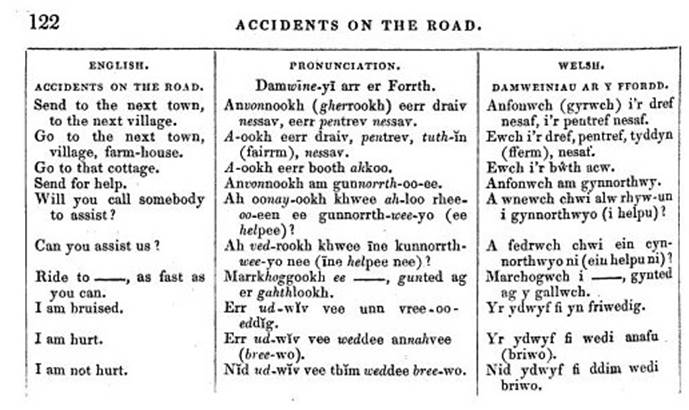
(delwedd J7288)
(tudalen 122)
|
122
ACCIDENTS ON THE ROAD.
ENGLISH.
ACCIDENTS ON THE ROAD.
Send to the next town,
to the next village.
Go to the next town,
village, farm-house.
Go to that cottage.
Send for help.
Will you call somebody to assist?
Can you assist us?
Ride to as fast as
you can.
I am bruised.
I am hurt.
I am not hurt.
|
PRONUNCIATION.
Damwine-yi arr er Forrth.
Anvonnookh (gherrookh) eerr draiv nessav, eerr pentrev nessav.
A- ookh eerr draiv, pentrev, tuth-in (fairrm ), nessav.
A- ookh eerr booth akkoo.
Anvonnookh am gunnorrth - oo- ee.
Ah oonay- ookh khwee ah-loo rhee- 00-een ee gunnorrth-wee-yo (ee
helpee)?
Ah ved-rookh khwee ine kunnorrthwee- yo nee (ine helpee nee)?
Marrkhoggookh ee er gahthlookh .
2
|
WELSH.
DAMWEINIAU AR Y FFORDD.
Anfonwch (gyrwch) i'r dref nesaf, i'r pentref nesaf.
Ewch i'r dref, pentref, tyddyn (fferm ), nesaf.
Ewch i'r bwth acw.
Anfonwch am gynnorthwy.
Awnewch chwi alw rhyw- un i gynnorthwyo (i helpu)?
A fedrwch chwi ein cynnorthwyo ni (ein helpu ni)?
gynted gunted ag Marchogwch i
Err ud- wiv vee unn vree -00-
eddig.
Err ud-wiv vee weddee annahvee
(bree-wo).
Nid ud-wiv vee thim weddee bree-wo.
ag y gallwch.
Yr ydwyffi yn friwedig.
Yr ydwyf fi wedi anafu
(briwo).
Nid ydwyf fi ddim wedi briwo.
|
|
|
|
|
|
|
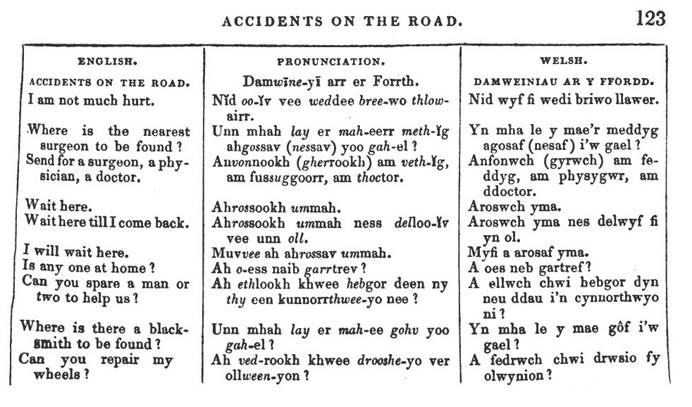
(delwedd J7289)
(tudalen 123)
|
ACCIDENTS
ON THE ROAD. 123
ENGLISH.
ACCIDENTS ON THE ROAD.
I am not much hurt.
Where is the nearest surgeon to be found?
Send for a surgeon, a physician, a doctor.
Wait here.
Waithere till I come back.
I will wait here.
Is any one at home?
Can you spare a man or two to help us?
Where is there a blacksmith to be found?
Can you repair my wheels?
|
PRONUNCIATION.
Damwine-yī arr er Forrth.
Nid oo-iv vee weddee bree-wo thlow- airr.
Unn mhah lay er mah-eerr meth-ig
ahgossav (nessav) yoo gah- el?
Auvonnookh (gherrookh) am veth-Ig,
am fussuggoorr, am thoctor.
Ahrossookh ummah.
Ahrossookh ummah ness delloo- Iv vee unn oll.
Muvvee ah ahrossav ummah.
Ah o-ess naib garrtrev?
Ah ethlookh khwee hebgor deen ny
thy een kunnorrthwee-yo nee?
Unn mhah lay er mah- ee gohv yoo
gah-el?
Ah ved-rookh khwee drooshe-yo ver
ollween-yon?
|
WELSH.
DAMWEINIAU AR Y FFORDD.
Nid wyffi wedi briwo llawer.
Yn mha le y
mae'r meddyg
agosaf (nesaf) i'w gael?"
Anfonwch (gyrwch) am fe- ddyg, am physygwr, am ddoctor.
Aroswch yma.
Aroswch yma nes delwyf fi yn ol.
Myfi a arosaf yma.
A oes neb gartref?
A ellwch chwi bebgor dyn
neu ddau i'n cynnorthwyo ni?
Yn mha le y mae gôf i'w
gael?
A fedrwch chwi drwsio fy
olwynion?
|
|
|
|
|
|
|
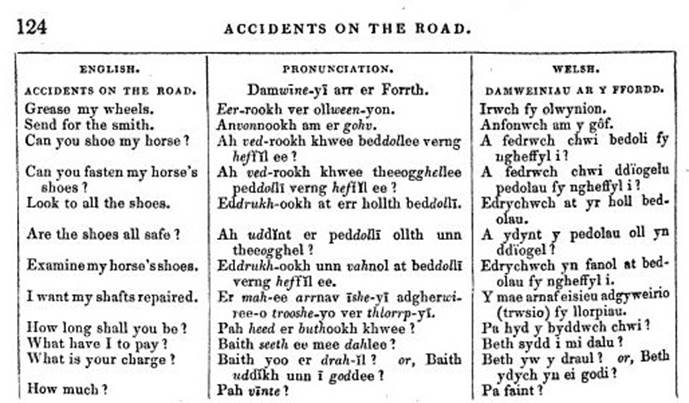
(delwedd J7290)
(tudalen 124)
|
124
ACCIDENTS ON THE ROAD.
ENGLISH.
ACCIDENTS ON THE ROAD.
Grease my wheels .
Send for the smith.
Can you shoe my horse?
Can you fasten my horse's shoes?
Look to all the shoes.
Are the shoes all safe?
Examinemyhorse's shoes.
I want my shafts repaired.
How long shall you be?
What have I to pay?
What is your charge?
How much?
|
PRONUNCIATION.
Damwine-yi arr er Forrth.
Eer-rookh ver ollween-yon.
Anvonnookh am er gohv.
Ah ved-rookh khwee beddollee verng
heffil ee?
Ah ved-rookh khwee theeogghellee peddolli verng heffl ee?
Eddrukh- ookh at err hollth beddolli.
Ah uddint er peddolli ollth unn theeogghel?
Eddrukh-ookh unn vahnol at beddolli verng heffil ee.
Er mah- ee arrnav īshe- yī adgherwi.
ree-o trooshe-yo ver thlorrp-yi.
Pah heed er buthookh khwee?'
Baith seeth ee mee dahlee?
Baith yoo er drah-il?
uddikh unn i goddee?
Pah vinte?
or, Baith
|
WELSH.
DAMWEINIAU AR Y FFORDD.
Irwch fy olwynion.
Anfonwch am y gôf.
A fedrwch chwi bedoli fy ngheffyli?
A fedrwch chwi ddiogelu pedolau fy ngheffyli?
Edrychwch at yr holl bed- olau.
A ydynt y pedolau oll yn ddiogel?
Edrychwch yn fanol at bed- olau fy ngheffyl i.
Ymae arnaf eisieu adgyweirio (trwsio) fy llorpiau.
Pa hyd y byddwch chwi?
Beth sydd i mi dalu?
Beth yw y draul?
ydych yn ei godi?
Pa faint?
or, Beth
|
|
|
|
|
|
|
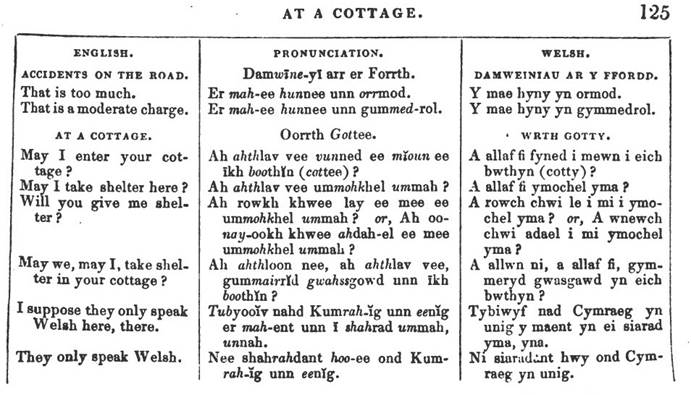
(delwedd J7291)
(tudalen 125)
|
AT A
COTTAGE. 125
ENGLISH.
ACCIDENTS ON THE ROAD.
That is too much.
AT A COTTAGE.
May I enter your cot- tage?
May I take shelter here?
Will you give me shel- ter?
Maywe, may I, take shel- ter in your cottage?
I suppose they only speak Welsh here, there.
They only speak Welsh.
|
PRONUNCIATION.
Damwine-yi arr er Forrth.
Er mah-ee hunnee unn orrmod.
That is a moderate charge. Er mah- ee hunnee unn gummed-rol.
Oorrth
Gottee.
Ah ahthlav vee vunned ee mĭoun ee
ikh boothin (cottee)?
Ah ahthlav vee ummohkhel ummah?
Ah rowkh khwee lay ee mee ee ummohkhel ummah? or, Ah oonay-ookh khwee ahdah-
el ee mee ummohkhel ummalı?
Ah ahthloon nee, ah ahthlav vee,
gummairrid gwahssgowd unn ikh boothin?
Tubyooiv nahd Kumrah-ig unn eenig er mah-ent unn i shahrad ummah,
unnah.
Nee shahrahdant hoo- ee ond Kumrah-ig unn eenig.
|
WELSH.
DAMWEINIAU AR Y FFORDD.
Y mae hyny yn ormod.
Y mae hyny yn gymmedrol.
WRTH GOTTY.
A allaffi fyned i mewn i eich bwthyn (cotty)?
A allaf fi ymochel yma?
A rowch chwi le i mi i ymochel yma? or, A wnewch chwi adael i mi ymochel
yma?
A allwn ni, a allaf fi, gymmeryd gwasgawd yn eich bwthyn?
Tybiwyf nad Cymraeg yn unig y maent yn ei siarad yma, yna.
Ni siaradant hwy ond Cymraeg yn unig.
|
|
|
|
|
|
|
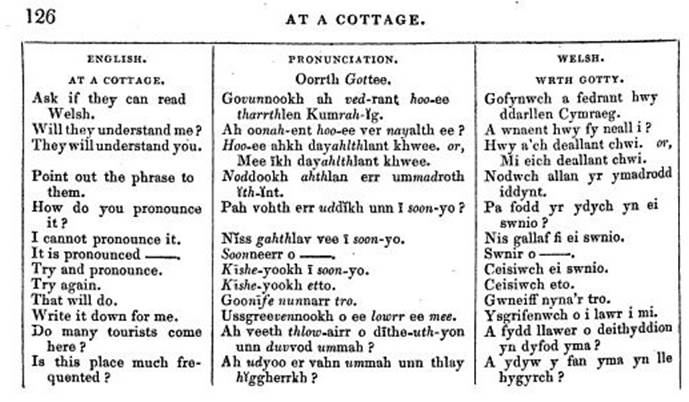
(delwedd J7292)
(tudalen 126)
|
126 AT
A COTTAGE.
ENGLISH.
AT A COTTAGE.
Ask if they can read Welsh.
Willthey understand me?
Theywillunderstand you .
Point out the phrase to them.
How do you pronounce it?
I cannot pronounce it .
It is pronounced Try and pronounce.
Try again.
That will do.
Write it down for me.
Do many tourists come here?
Is this place much fre- quented?
|
PRONUNCIATION.
Oorrth Gottee.
Govunnookh ah ved-rant hoo-ee tharrthlen Kumrah-ig.
Ah oonah-ent hoo-ee ver nayalth ee?
Hoo-ee ahkh dayahlthlant khwee. or,
Mee ikh dayahlthlant khwee.
Noddookh ahthlan err ummadroth ith-int.
Pah vohth err uddikh unn i soon- yo?
Niss gahthlav vee i soon-yo.
Soonneerr o—•
Kishe-yookh i soon-yo.
Kishe-yookh etto.
Goonife nunnarr tro.
Ussgreevennookh o ee lowrr ee mee.
Ah veeth thlow-airr o dīthe-uth- yon unn duvvod ummah?
Ah udyoo er vahn ummah uun thlay higgherrkh?
|
WELSH.
WRTH GOTTY.
Gofynwch a fedrant hwy ddarllen Cymraeg.
A wnaent hwy fy neall i?
Hwy a'ch deallant chwi. or,
Mi eich deallant chwi.
Nodwch allan yr ymadrodd iddynt.
Pa fodd yr ydych yn ei swnio?
Nis gallaf fi ei swnio.
Swnir o .
Ceisiwch ei swnio.
Ceisiwch eto.
Gwneiff nyna'r tro.
Ysgrifenwch o i lawr i mi.
A fydd llawer o deithyddion
yn dyfod yma?
A ydyw y fan yma yn lle hygyrch?
|
|
|
|
|
|
|
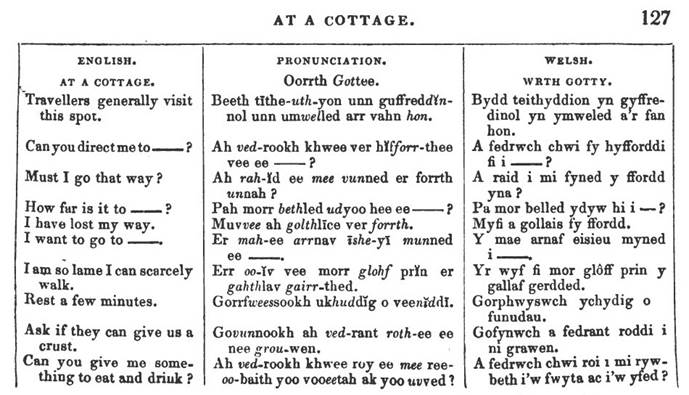
(delwedd J7293)
(tudalen 127)
|
AT A
COTTAGE. 127
ENGLISH.
AT A COTTAGE.
Travellers generally visit this spot.
Canyoudirect meto. -?
Must I go that way?
How far is it to
I have lost my way.
I want to go to
?
I am so lame I can scarcely walk.
Rest a few minutes.
Ask if they can give us a
crust.
Can you give me something to eat and drink?
|
PRONUNCIATION.
Oorrth Gottee.
Beeth tithe-uth-yon unn guffreddin- nol unn umwelled arr vahn hon.
Ah ved- rookh khwee ver hifforr- thee vee ee -?
Ah rah- id ee mee vunned er forrth unnah?
Pah morr bethled udyoo hee ee- Muvvee ah golthlice ver forrth.
.?
Er mah- ee arrnav īshe-yī munned ee
Err 00-iv vee morr glohf prin er gahthlav gairr-thed.
Gorrfweessookh ukhuddig o veeniddi.
Govunnookh ah ved-rant roth- ee ee
nee grou-wen.
Ah ved-rookh khwee roy ee mee reeoo-baith yoo vooeetah ak yoo uvved?
|
WELSH.
WRTH GOTTY.
Bydd teithyddion yn gyffre- dinol yn ymweled a'r fan hon.
A fedrwch chwi fy hyfforddi fii -?
A raid i mi fyned y ffordd yna?
Pa mor belled ydyw hi i
Myfi a gollais fy ffordd .
-?
Y mae arnaf eisieu myned i
Yr wyf fi mor glôff prin y
gallaf gerdded.
Gorphwyswch ychydig o
funudau.
Gofynwch a fedrant roddi i
ni grawen.
Afedrwch chwi roi 1 mi ryw- beth i'w fwyta ac i'w yfed?
|
|
|
|
|
|
|
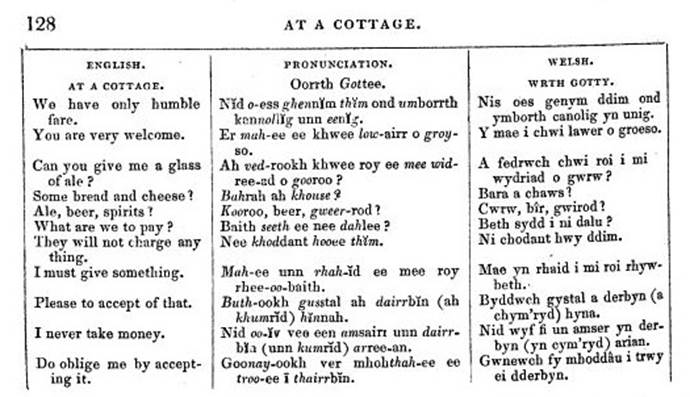
(delwedd J7294)
(tudalen 128)
|
128 AT
A COTTAGE.
ENGLISH.
AT A COTTAGE.
We have only humble fare.
You are very welcome.
Can you give me a glass of ale?
Some bread and cheese?
Ale, beer, spirits?
What are we to pay?
They will not charge any thing.
I must give something.
Please to accept of that.
I never take money.
Do oblige me by accept- ing it.
|
PRONUNCIATION.
Oorrth Gottee.
Nid o-ess ghennĭm thìm ond umborrth
kannollig unn eenig.
Er mah- ee ee khwee low-airr o groy- so.
Ah ved- rookh khwee roy ee mee wid- ree-ad o gooroo?
Buhrah ah khouse?
Kooroo, beer, gweer-rod?
Baith seeth ee nee dahlee?
Nee khoddant hooee thim .
Mah-ee unn rhah-id ee rhee-oo-baith.
mee roy
|
WELSH.
WRTH GOTTY.
Nis oes genym ddim ond ymborth canolig yn unig.
Y mae i chwi lawer o groeso.
A fedrwch chwi roi i mi
wydriad o gwrw?
Bara a chaws?
Cwrw, bîr, gwirod?
Beth sydd i ni dalu?
Ni chodant hwy ddim.
Mae yn rhaid i mi roi rhyw- beth..
Buth-ookh gusstal ah dairrbín (ah Byddwch gystal a derbyn (a
khumrid) hinnah.
Nid oo-iv vee een amsairi unn dairrbia (unn kumrid) arree-an.
Goonay-ookh ver mhohthah-ee ee troo-ee i thairrbin.
chym'ryd) hyna.
Nid wyf fi un amser yn der- byn (yn cym'ryd) arian.
|
|
|
|
|
|
|
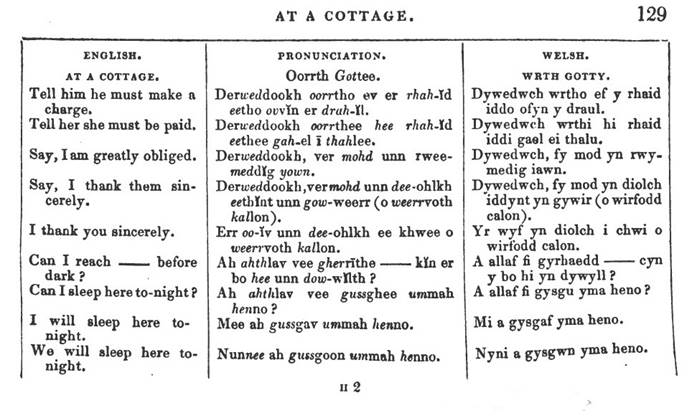
(delwedd J7295)
(tudalen 129)
|
Gwnewch
fy mhoddâu i trwy ei dderbyn.
AT A COTTAGE. 129
ENGLISH.
AT A COTTAGE .
Tell him he must make a
charge.
Tell her she must be paid.
Say, I am greatly obliged.
Say, I thank them sincerely.
I thank you sincerely.
Can I reach dark?
before
Can I sleep here to-night?
I will sleep here to- night.
We will sleep here tonight.
|
PRONUNCIATION.
Oorrth Gottee.
Derweddookh oorrtho ev er rhah-id eetho ovvĭn er drah-Il .
Derweddookh oorrthee hee rhah-id eethee gah-el i thahlee.
Derweddookh, ver mohd unn rwee- meddig yown.
Derweddookh, ver mohd unn dee - ohlkh
eethint unngow- weerr ( o weerrvoth kallon).
Err oo-iv unn dee- ohlkh ee khwee o
weerrvoth kallon.
Ah ahthlav vee gherrīthe bo hee unn dow-wilth?
kin er
Ah ahthlav vee gussghee ummah henno?
Mee ah gussgav ummah henno.
Nunnee ah gussgoon ummah henno.
|
WELSH.
WRTH GOTTY.
Dywedwch wrtho ef y rhaid iddo ofyn y draul.
Dywedwch wrthi hi rhaid iddi gael ei thalu.
Dywedwch, fy mod yn rwy- medig iawn.
Dywedwch, fy mod yn diolch
iddynt yn gywir (o wirfodd calon).
Yr wyf yn diolch i chwi o
wirfodd calon.
A allaf fi gyrhaedd ·
y
cyn
bo hi yn dywyll?
A allaf fi gysgu yma heno?
Mi a gysgaf yma heno.
Nyni a gysgwn yma heno.
II 2
|
|
|
|
|
|
|
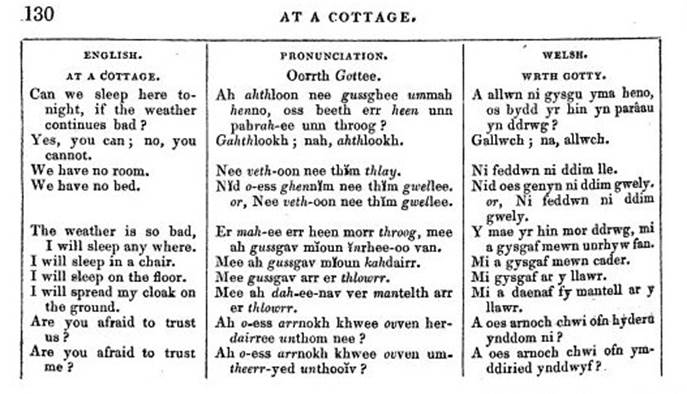
(delwedd J7296)
(tudalen 130)
|
130 AT
A COTTAGE.
ENGLISH.
AT A COTTAGE.
Can we sleep here to- night, if the weather continues bad?
Yes, you can; no, you cannot.
We have no room.
We have no bed.
The weather is so bad,
I will sleep any where.
I will sleep in a chair.
I will sleep on the floor.
I will spread my cloak on the ground.
Are you afraid to trust us?
Are you afraid to trust me?
|
PRONUNCIATION.
Oorrth Gottee.
Ah ahthloon nee gussghee ummah henno, oss beeth err heen unn
pahrah-ee unn throog?
Gahthlookh; nah, ahthlookh.
Nee veth-oon nee thim thlay.
Nid o- ess ghennim nee thim gwellee.
or, Nee veth-oon nee thim gwellee.
Er mah- ee err heen morr throog, mee
ah gussgav mioun inrhee- oo van.
Mee ah gussgav mioun kahdairr.
Mee gussgav arr er thlowrr.
Mee ah dah-ee-nav ver mantelth arr er thlowrr.
Ah o-ess arrnokh khwee ovven her- dairree unthom nee?
Ah o- ess arrnokh khwee ovven umtheerr-yed unthooĭv?
|
WELSH.
WRTH GOTTY.
A allwn ni gysgu yma beno,
os bydd yr hin yn parâau yn ddrwg?
Gallwch; na, allwch.
Ni feddwn ni ddim lle .
Nid oes genyn ni ddim gwely.
or, Ni feddwn ni ddim
gwely.
Y mae yr hin mor ddrwg, mi a gysgafmewn unrhyw fan.
Mi a gysgaf mewn cader.
Mi gysgaf ar y llawr.
Mi a daenaf fy mantell ar y
llawr.
Aoes arnoch chwi ofn hyderu ynddom ni?
A oes arnoch chwi ofn ym- ddiried ynddwyf?
|
|
|
|
|
|
|
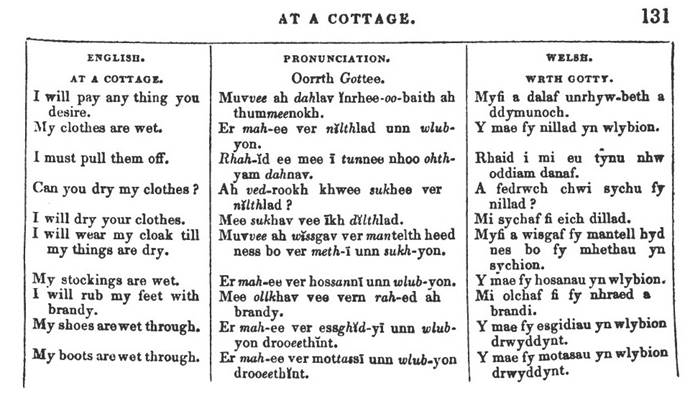
(delwedd J7297)
(tudalen 131)
|
AT A
COTTAGE. 131
ENGLISH.
AT A COTTAGE.
I will pay any thing you desire.
My clothes are wet.
I must pull them off.
Can you dry my clothes?
I will dry your clothes.
I will wear my cloak till
my things are dry.
My stockings are wet.
I will rub my feet with brandy.
My shoes arewet through.
My boots are wet through.
|
PRONUNCIATION.
Oorrth Gottee.
Muvvee ah dahlav Inrhee - 00- baith ah thummeenokh.
Er mah-ee ver nilthlad unn wlubyon.
Rhah-id ee mee i tunnee nhoo ohth- yam dahnav.
Ah ved-rookh khwee sukhee ver nĭlthlad?
Mee sukhav vee ikh dilthlad .
Muvvee ah wissgav ver mantelth heed
ness bo ver meth- i unn sukh-yon.
Ermah-ee ver hossanni unn wlub-yon.
Mee ollkhav vee vern rah- ed ah
brandy.
Er mah- ee ver essghid-yi unn wlub- yon drooeethint.
Er mah- ee ver mottassi unn wlub-yon drooeethint.
|
WELSH.
WRTH GOTTY.
Myfi a dalaf unrhyw beth a
ddymunoch.
Y mae fy nillad yn wlybion.
Rhaid i mi eu tynu nhw oddiam danaf.
A fedrwch chwi sychu fy nillad?
Mi sychaffi eich dillad .
Myfi a wisgaf fy mantell hyd nes bo fy mhethau yn sychion.
Y maefy hosanau yn wlybion.
Mi olchaf fi fy nhraed a
brandi.
Y mae fy esgidiau yn wlybion drwyddynt.
Y mae fy motasau yn wlybion drwyddynt.
|
|
|
|
|
|
|
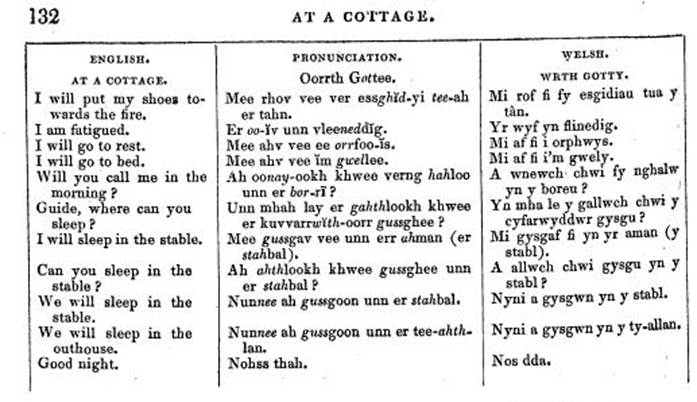
(delwedd J7298)
(tudalen 132)
|
132 AT
A COTTAGE.
ENGLISH.
AT A COTTAGE.
I will put my shoes to- wards the fire.
I am fatigued.
I will go to rest.
I will go to bed.
Will you call me in the morning?
Guide, where can you
sleep?
I will sleep in the stable.
Can you sleep in the stable?
We will sleep in the stable.
We will sleep in the outhouse.
Good night.
|
PRONUNCIATION.
Oorrth Gottee.
Mee rhov vee ver essghid-yi tee-ah er tahn.
Er oo-iv unn vleeneddig.
Mee ahv vee ee orrfoo-is.
Mee ahv vee ĭm gwellee.
Ah oonay- ookh khwee verng hahloo unn er bor-ri?
Unn mhah lay er gahthlookh khwee er kuvvarrwith- oorr gussghee?
Mee gussgav vee unn err ahman (er stahbal).
Ah ahthlookh khwee gussghee unn er stahbal?
Nunnee ah gussgoon unn er stahbal.
Nunnee ah gussgoon unn er tee-ahth- lan.
Nohss thah.
|
WELSH.
WRTH GOTTY.
Mi rof fi fy esgidiau tua y
tân.
Yr wyfyn flinedig.
Mi af fi i orphwys.
Mi af fi i'm gwely.
A wnewch chwi fy nghalw yn y boreu?
Yn mha le y gallwch chwi y
cyfarwyddwr gysgu?
Mi gysgaf fi yn yr aman (y
stabl).
A allwch chwi gysgu yn y
stabl?
Nyni a gysgwn yn y stabl.
Nyni a gysgwn yn y ty-allan.
Nos dda.
|
|
|
|
|
|
|
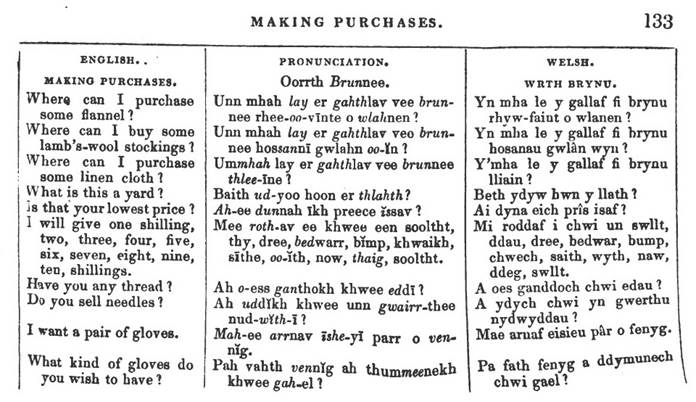
(delwedd J7299)
(tudalen 133)
|
MAKING
PURCHASES. 133
ENGLISH..
MAKING PURCHASES.
Where can I purchase some flannel?
Where can I buy some lamb's-wool stockings?
Where can I purchase
some linen cloth?
What is this a yard?
Is that your lowest price?
I will give one shilling,
two, three, four, five,
six, seven, eight, nine,
ten, shillings.
Have you any thread?
Do you sell needles?
I want a pair of gloves.
What kind of gloves do
you wish to have?
|
PRONUNCIATION.
Oorrth Brunnee.
Unn mhah lay er gahthlav vee brun- nee rhee-00 -vinte o wlahnen?
Unn mhah lay er gahthlav veo brunnee hossanni gwlahn oo-in?
Ummhah lay er gahthlav vee brunnee thlee-ine?
Baith ud-yoo hoon er thlahth?
Ah-ee dunnah ikh preece ĭssav?
Mee roth-av ee khwee een sooltht,
thy, dree, bedwarr, bimp, khwaikh,
sithe, oo-ith, now, thaig, sooltht.
Ah o- ess ganthokh khwee eddi?
Ah uddĭkh khwee unn gwairr-thee nud-with-ī?
Mah- ee arrnav īshe-yī parr o vennig.
Pah vahth vennig ah thummeenekh khwee gah-el?
|
WELSH.
WRTH BRYNU.
Yn mha le y gallaf fi brynu
rhyw-faint o wlanen?
Yn mha le y gallaf fi brynu hosanau gwlân wyn?
Y'mha le y gallaf fi brynu lliain?
Beth ydyw hwn y llath?
Ai dyna eich prîs isaf?
Mi roddaf i chwi un swllt,
ddau, dree, bedwar, bump,
chwech, saith, wyth, naw,
ddeg, swllt.
A oes ganddoch chwi edau?
A ydych chwi yn gwerthu nydwyddau?
Mae arnaf eisieu pâr o fenyg.
Pa fath fenyg a ddymunech
|
|
|
|
|
|
|
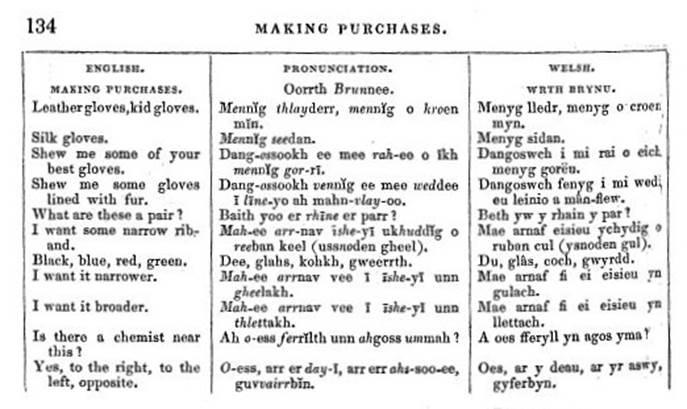
(delwedd J7300)
(tudalen 134)
|
chwi
gael?
134 MAKING PURCHASES.
ENGLISH.
MAKING PURCHASES.
PRONUNCIATION.
Oorrth Brunnee.
WELSH.
WRTH BRYNU.
Leathergloves, kid gloves. Mennig thlayderr, mennig o kroen Menyg lledr,
menyg o croen
Silk gloves.
Shew me some of your
best gloves.
Shew me some gloves lined with fur.
What are these a pair?
I want some narrow rib- and.
Black, blue, red, green.
I want it narrower.
I want it broader.
Is there a chemist near this?
Yes, to the right, to the left, opposite.
min.
|
Mennig
seedan.
Dang-ossookh ee mee rah-ee o ikh mennig gor-ri.
Dang- ossookh vennig ee mee weddee I line-yo ah mahn- vlay- 00 .
Baith yoo er rhīne er parr?
Mah-ee arr-nav ishe-yi ukhuddig o
reeban keel (ussnoden gheel).
Dee, glahs, kohkh, gweerrth.
Mah-ee arrnav vee ī īshe-yī unn
gheelakh.
Mah-ee arruav vee ī īshe- yi unn thlettakh .
Ah o- ess ferrĭlth unn ahgoss ummah?
O-ess, arr er day-1, arr err ahs- soo-ee,
guvvairrbin.
myn.
|
Menyg
sidan.
Dangoswch i mi rai o eich menyg gorëu.
Dangoswch fenyg i mi wedi eu leinio a man-flew.
Beth yw y rhain y par?
Mae arnaf eisieu ychydig o
ruban cul (ysnoden gul).
Du, glâs, coch, gwyrdd.
Mae arnaf fi ei eisieu yn
gulach.
Mae arnaf fi ei eisieu yn llettach.
A oes fferyll yn agos yma?
Oes, ar y deau, ar yr aswy,
gyferbyn.
|
|
|
|
|
|
|
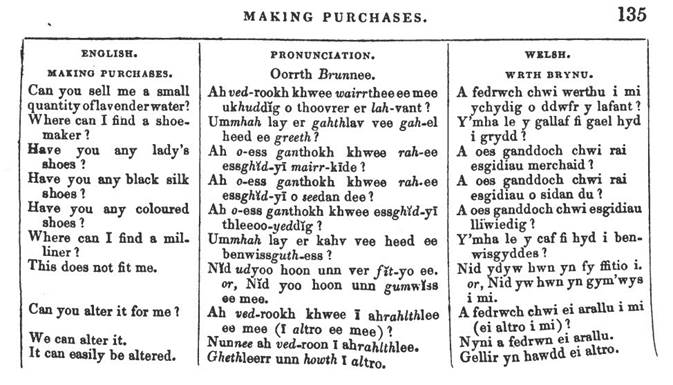
(delwedd J7301)
(tudalen 135)
|
MAKING
PURCHASES. 135
ENGLISH.
MAKING PURCHASES.
Can you sell me a small quantity oflavender water?
Where can I find a shoe- maker?
Have you any lady's shoes?
Have you any black silk shoes?
Have you any coloured shoes?
Where can I find a mil- liner?
This does not fit me.
Can you alter it for me?
We can alter it.
It can easily be altered.
|
PRONUNCIATION.
Oorrth Brunnee.
Ahved- rookh khwee wairrthee ee mee
ukhuddig o thoovrer er lah- vant?
Ummhah lay er gahthlav vee gah-el heed ee greeth?
Ah o -ess ganthokh khwee rah- ee essghid-yī mairr- kīde?
Ah o-ess ganthokh khwee rah- ee essghid-yi o seedan dee?
Ah o-ess ganthokh khwee essghid-yi thleeoo- yeddig?
Ummhah lay er kahv vee heed ee benwissguth-ess?
Nid udyoo hoon unn ver fit-yo ee.
or, Nid yoo hoon unn gumwiss ee mee.
Ah ved-rookh khwee i ahrahlthlee
ee mee (I altro ee mee)?
Nunnee ah ved-roon i ahrahlthlee.
Ghethleerr unn howth I altro.
|
WELSH.
WRTH BRYNU.
A fedrwch chwi werthu i mi
ychydig o ddwfr y lafant?
Y'mha le y gallaf fi gael hyd i grydd?
A oes ganddoch chwi rai esgidiau merchaid?
A oes ganddoch chwi rai esgidiau o sidan du?
A oes ganddoch chwi esgidiau lliwiedig?
Y'mha le y caf fi hyd i benwisgyddes?
Nid ydyw hwn yn fy ffitio i.
or, Nid ywhwn yn gym'wys
i mi.
Afedrwch chwi ei arallu i mi
(ei altro i mi)? Nyni a fedrwn ei arallu.
Gellir yn hawdd ei altro.
|
|
|
|
|
|
|
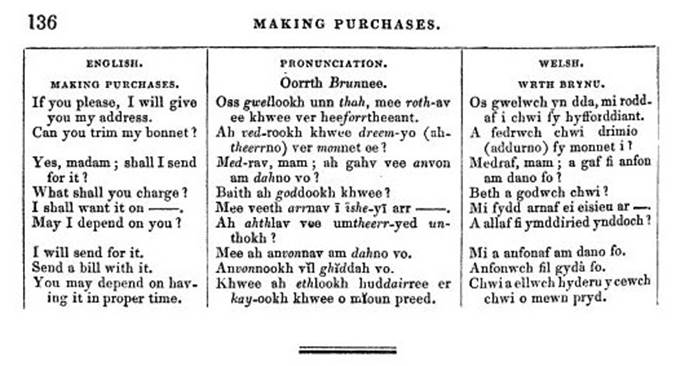
(delwedd J7302)
(tudalen 136)
|
136
MAKING PURCHASES .
ENGLISH.
MAKING PURCHASES.
If you please, I will give you my address.
Can you trim my bonnet?
Yes, madam; shall I send for it?
What shall you charge?
I shall want it on
May I depend on you?
I will send for it.
Send a bill with it.
You may depend on having it in proper time.
|
PRONUNCIATION.
Oorrth Brunnee.
Oss gwellookh unn thah, mee roth-av ee khwee ver heeforrtheeant.
Ah ved-rookh khwee dreem- yo ( ah- theerrno) ver monnet ee?
Med-rav, mam; ah gahv vee anvon am dahno vo?
Baith ah goddookh khwee?
Mee veeth arnav i ishe-yī arr — .
Ah ahthlav vee umtheerr-yed un- thokh?
Mee ah anvonnav am dahno vo.
Anvonnookh vil ghĭddah vo.
Khwee ah ethlookh huddairree er
kay-ookh khwee o moun preed.
|
WELSH.
WRTH BRYNU.
Os gwelwch yn dda, mi rodd.
af i chwi fy hyfforddiant.
A fedrwch chwi drimio (addurno) fy monnet i?
Medraf, mam; a gaf fi anfon am dano fo?
Beth a godwch chwi?
Mi fydd arnaf ei eisieu ar —.
Aallaffi ymddiried ynddoch?
Mi a anfonaf am dano fo.
Anfonwch fil gydâ fo.
Chwia ellwch hyderuycewch chwi o mewn pryd.
|
|
|
|
|
|
![]() B5237ː
B5237ː ![]()
![]() yn
yn ![]() aith δ δ £ g
aith δ δ £ g![]() yn
yn ![]() aith δ δ £ U+2020
†
aith δ δ £ U+2020
†![]() yn
yn ![]() aith δ δ
aith δ δ![]()
![]()






















































































































































